#this could put trump away for up to 20 years which would be effectively a life sentence
Explore tagged Tumblr posts
Text
🎶 Donald Trump is finally about to get charged with treason 🎶 it is a beautiful day in Americaaaaaa 🎶🎵🎶
#hilary for ts#politics for ts#cue me impatiently trying not to look at twitter every 5 seconds to see if they have done it yet#but espionage charges are a) federal b) serious and c) come with LENGTHY prison terms#aka this is not just a relatively minor matter of hush money#(though that likewise had election implications)#this could put trump away for up to 20 years which would be effectively a life sentence#god that would be so nice#robert hanssen (99s fbi spy for the ussr) just croaked so a cell in florence supermax is conveniently available
70 notes
·
View notes
Text
COP29 NOV 11--Blue Zone

review of the notes from my first day of the UN COP29 Climate Change Conference. Disclaimer I'm just a ~silly guy~ not a policy or geopolitical expert. My observations and opinions do not reflect AC or RINGOs. This is what I witnessed, overheard, remember, and (crucially) understand, and may not be representative of final policy decisions.
I was in the Blue Zone today (official UN ground, where negotiations occur). From the RINGO meeting, rumor was the night before COP29 officially began officials were up till 4 am arguing about the agenda. Article 6.4 of the Paris Agreement (mechanisms of carbon markets) was deeply contested in particular. Also arguments about unilateral and multilateral trade agreements. Also weather Global Stocktake (assessment of global progress on Paris Agreement) would be filed under general or financial sections. US/EU/Australia/smaller island nations were wanting it to be considered broader, with BASIC (Brazil, South Africa, India and China) wanting it under strictly Finance. More Paris Agreement stuff.
This resulted in the opening plenary beginning at 11 am, followed immediately by break for closed door discussions on the second item of the day, the agenda. This was a completely unprecedented delay, and the agenda was only resolved at 9pm.
This is the previous COP president Sultan Al Jaber, who did the opening address of plenary and handed over the presidency to Muhktar Babayev (photo below) with an embrace.

Notes of claims from Babayev's address to the plenary body:
We are set to break records on renewable energy and its investment.
There is a goal of low-carbon growth (as opposed to zero, which I think is an important distinction)
853 million put into the Loss and Damage fund
A call to increase climate financing ambitions. This is not charity, but in the self interest of all countries who with to mitigate the ethical and economical consequences of climate change.
A reinforcement of the call to transition away from fossil fuels (important, as last year is the first time such phrasing was used for the UNFCCC)
Emphasizing the cooperation required of everyone.
Genocide and the environment

Social justice is deeply tied into climate change efforts. Here in the Blue Zone we had a demonstration to end genocide (as relevant by its massive carbon emissions, if the human rights angle doesn't suffice), with particular emphasis on Palestine and reclaiming Indigenous lands. Demonstrations within the blue zone are allowed with permission, and can have a maximum of 20 people actively participating. Those in solidarity of the demonstration raised their fists in support. Also, this could not happen in the Green Zone (public conference) due to it being controlled by the host country, and Azerbaijan has strict laws against protests.
USAmerican election and its future climate policy
I proceeded to get rather lost trying to find a conference on USAmerican climate response to the Trump election, but got there too late because the Blue Zone is massive oof. Did catch the people coming out, and the strategy thus far is that the Biden administration's environmental policies were designed to endure regime shifts and should be difficult to undo without significant political effort. So, we'll be unfortunately testing that durability, particularly with how Trump likes to flout the rules and the Supreme Court deemed that legal.
Additionally, NDCs (Nationally Determined Contributions) are due in February but the US may potentially do theirs sooner before the regime shift. Effectiveness is questionable because the accountability of countries upholding their NDCs is already kinda honor code.
Subfederal action is going to be a main proponent of climate action from here on.
Conference: Transparency for transforming the agrifood system
I...must admit I was constantly blacking out and jerking back awake during this meeting because of jet lag. So the merit of these notes may be questionable particularly bc I'm having trouble reading them. However, notes from representatives from Mongolia, Pakistan, Georgia, UN, and others.

10% of global green house gas emissions are from agriculture (Technically this was from Babayev's speech but I think it's a useful reference point for this conversation. Production, manufacturing, distribution, and waste of food produces a lot of emissions).
Data quality is of large concern for transparency and effectiveness of implementation purposes. Countries have different methodologies and argue about which is superior, and the quality of others' methods. This can be particularly of note in the carbon markets. Data collection is a large logistical and technological challenge.
Everyone wants increased transparency. Or claim to. I think, aside from technical difficulties in data collection and funding thereof, the countries would actually prefer others are transparent and less themselves to be. As evidenced by things like high levels of methane unaccounted by the summation of all countries' submitted emission reports. But that's just my opinion.
BTRs (Biennial transparency reports) are difficult, and the country representatives present were apologizing for delays.
Calls for increase of human capacity. Imma be level that seems like a vague ideal to me, but I think it might mean carrying capacity (kinda a deeply flawed concept already, sustainability is extremely difficult to ascertain without prolonged unsustainability to confirm it)
Double counting is a problem for carbon removals
Efforts to work with farmers in data collection and to better improve their methods
A claim on carbon neutral livestock farming to balance cattle methane emissions with soil carbon sequestering through grazingland ecosystem management.
Conversion of carbon sink ecosystems into farmland. From personal research: In 2019, 17% of global cropland was newly converted since 2003, and the rate of yearly conversion is accelerating.
Potentially using IPCC software for consistency in data collection and analysis
Ecocide as a tool of war
Lastly, there are country pavilions in the Blue Zone where they raise issues. I did not particularly look too much into most of them, but would like to share Ukraine's because it was amazing imo.

One, the walls are literally full of seeds, and I think it will be really cool seeing them begin to sprout by the end of the conference


Two, how destroying the environment is a concentrated effort to destroy its people. Because again, protecting the environment/climate is protecting the people.


Lastly, these solar panels damaged in the war. A large emphasis in this pavilion was rebuilding from the bombing and coming back greener, which I found particularly admirable. The bravery to forge something new while grieving the comfort of what was lost. The circumstances presenting the opportunity to reinvent their infrastructure is obviously horrendous, but seizing said opportunity nonetheless is inspiring. Renewable energy is also a way to be energy independent, which is particularly important if you’re say Ukraine and the closest major oil exporter is Russia.
Now, I had left the Blue Zone by then (needed dinner where there isn't price gouging! Yikes!) but plenary did eventually assume very late, and massive progress on Article 6 was made!
This is about Carbon Markets, some people are happy others aren't, etc. Also the agenda was implement as the original plan (GST under finance) with acknowledgements made that it was broader consideration. And now plenary can actually continue instead of being stymied! In consideration for the day of lost time, sessions will run later than usual. After today it's going to get busy!
#nom does politics#cop29#unfccc#climate change#climate change action#environment#politics#world politics#UN#united nations#us election 2024#ecosystem#agriculture#genocide#uhguhgpidh This took so much time and it's NOTHING compared to how much I did nov 12#something to nom on
5 notes
·
View notes
Text
Breaking Down Trump’s ‘No Tax on Overtime’ Proposal for Workers

It’s Friday evening, and after a long week of extended shifts, Alex is finally heading home. As he glances at his paycheck, he feels the familiar sting—those extra hours he worked overtime are heavily reduced by taxes. While the additional income is always welcome, the amount taken out in taxes leaves him questioning if the extra effort is worth it. Now, imagine a world where that overtime pay was untouched by taxes. This is the essence of Trump’s latest proposal—no taxes on overtime wages—and for workers like Alex, it seems almost too good to be true.
This proposal has sparked significant conversation about how such a policy could impact the take-home pay of millions of Americans, the broader economy, and the labor market. Let’s break down how it might work, who stands to benefit the most, and what the ripple effects could be.
How Overtime Pay Works and What Could Change
Under current U.S. law, most employees who work more than 40 hours per week are entitled to receive overtime pay at 1.5 times their regular hourly wage. For example, if Alex typically earns $20 per hour, he would make $30 per hour for any time worked beyond 40 hours in a week. However, those additional earnings don’t all go straight into his pocket. Federal, state, and payroll taxes take a significant bite out of the extra pay.
Consider a typical scenario: Alex works 10 extra hours at his overtime rate of $30 per hour, giving him an additional $300 in gross income. But once taxes are applied, he could see up to 25% of that overtime pay disappear, leaving him with $225 or less. Trump’s proposal seeks to change this by eliminating the tax burden on overtime earnings, allowing workers to keep 100% of the money they earn during those extra hours.
Potential Financial Impact on Workers
So, how much could this change actually put back into workers' pockets? Let’s look at some numbers.
The average U.S. employee works about 42-43 hours per week, meaning they clock in roughly 2-3 hours of overtime on a regular basis. According to labor statistics, the average hourly wage in the U.S. is around $28.52. At an overtime rate of 1.5 times that amount, the average overtime pay is roughly $42.78 per hour.
If a worker puts in three hours of overtime each week, that equates to about $128 in overtime pay per week. Multiply that by 52 weeks, and it adds up to $6,656 in overtime earnings annually. Under current tax laws, a worker could lose about 25% of that in taxes, leaving them with around $4,992. Trump’s proposed “no tax on overtime” plan could allow that same worker to keep the entire $6,656, resulting in a nearly $1,700 increase in take-home pay each year.
For workers in industries where overtime is common, like healthcare, manufacturing, and construction, the financial benefits could be even greater. In healthcare, where nurses and medical professionals often work extensive overtime, the extra income could provide significant relief, especially in a sector already dealing with wage concerns and burnout.
Which Workers Stand to Gain the Most?
Not all workers are equally impacted by overtime, and therefore, not all will see the same level of benefit from this proposal. Certain sectors of the economy rely more heavily on overtime hours, and employees in those fields could see the biggest financial boost.
Take the manufacturing industry as an example. In 2023, manufacturing workers averaged 3.5 hours of overtime per week. With the average hourly wage in manufacturing sitting around $25, overtime earnings would be roughly $37.50 per hour. Over the course of a year, that translates into about $6,825 in overtime pay. If current tax laws take away 25% of that income, the worker is left with $5,119. Trump’s proposal would allow them to keep the entire amount, potentially boosting their income by over $1,700 annually.
Similarly, in the healthcare industry, nurses working overtime can easily rack up 10 to 15 hours of extra work each week. With average hourly wages in healthcare ranging from $30 to $50 per hour, these employees could see significant increases in their take-home pay under a tax-free overtime policy.
Potential Economic Impacts
While workers may be excited about the prospect of keeping more of their overtime earnings, there are broader economic implications to consider. Removing taxes on overtime pay would result in a significant reduction in government revenue. Payroll taxes contribute to Social Security and Medicare funding, and any loss of revenue in these areas could necessitate changes in tax rates elsewhere or cuts to government programs.
Additionally, there’s the question of how businesses might respond. If companies know their employees will take home more money from overtime, they may decide to limit overtime opportunities to keep labor costs in check. This could be particularly true in industries that already face tight profit margins. On the flip side, if workers are more willing to take on overtime due to the increased financial incentive, overall productivity might see a boost, leading to positive outcomes for both workers and employers.
Feasibility and Legislative Hurdles
The path to implementing this “no tax on overtime” proposal is anything but certain. Tax policies are always a hot-button issue in Washington, and eliminating taxes on overtime pay would likely face resistance from lawmakers concerned about its impact on the federal budget. Additionally, some opponents might argue that such a policy disproportionately benefits certain segments of the workforce while leaving others unaffected.
That being said, this proposal taps into a broader discussion about wage stagnation and the rising cost of living. For many workers, particularly those in blue-collar jobs, overtime pay is a critical part of their income, and any effort to increase that income without the burden of taxes is bound to gain attention.
Conclusion
Trump’s “no tax on overtime” proposal offers the potential for substantial financial benefits to American workers, particularly those in industries that rely on overtime hours. If implemented, this policy could put hundreds or even thousands of extra dollars into the pockets of hard-working employees each year. However, the broader economic implications and the legislative challenges surrounding this proposal mean that its future remains uncertain.
While workers weigh the potential benefits, businesses will need to explore business tax solutions to navigate the evolving landscape and ensure they are prepared for any shifts in tax policy.
1 note
·
View note
Note
https://lady-ha-ha.tumblr.com/post/160715688748/is-that-comic-before-the-reboot-and-which-one-is
(I have not read this comic) Is this true? (if so, ivy deserves someone better).
Post
Kay, first off both of those people are Jarley shippers so take everything they say with a grain of salt and then some, cause no. that part isn't about how much Harley loves Joker and will always choose him over Ivy. Literally you can tell ops don't know what they're talking about cause her whole thing in those issues is going to kill him for years of graphic abuse but ultimately falls back with him once she’s face to face with him.
Like wow, congrats on missing the fucking point again but not surprised from people who ship her with The Fucking Joker.

also, ffs, can anyone please have basic comprehension skills and realize that Harley and Ivy are both fucked up sometimes because they’ve got issues and that’s not comparable to Joker’s long ass history of graphic and disgusting abuse.
Harley and Ivy are villains, they're not a wholesome cookie cutter, White Picket Fence, super vanilla ship with no bad moments. They're both bad guys with a fuck ton of trauma that they both have to work through, and have done so at this point.
Gotham City Sirens was published between 2009 - 2011, Harley and Ivy weren't blatantly romantic at this point nor had they had anywhere near the development that they’ve had at this point.
Like don’t go into Harlivy content expecting them to be the perfect wlw rep with no flaws during their arcs from BTAS to current time cause that’s just not realistic. They’re both deeply flawed people who’ve got a fuck ton of trauma that they need to (and have) worked through.
I have talked about the BTAS issues here and this post is good at explaining them too.
X
X
Harlivy is not and has never been a purely wholesome, goody-goody ship. They’re messy, they have issues, and they have bad moments sometimes, but they both worked through their seperate trauma and came out stronger and better because at the end of the day, they care about each other.
Harlivy has messy, toxic moments sometimes, but they’re not, and have never been, abusive. There’s a difference between unhealthy moments and a ship being abusive.
That’s completely different to how Joker acts Constantly, because he does not care that his actions towards Harley are abusive, because he doesn’t give a shit about her.
He enjoys hurting her. He enjoys ruining her.
Jarley has always been intended to be written and shown as a domestically abusive relationship.
This is also the first instance where it's directly referenced that there's something more than platonic between her and Ivy, other than the reference in Batgirl Adventures.
Gotham City Sirens is also not connected to any verses.
This didn’t happen in the timeline we’re in rn with Harley Quinn (2014)/(2016)/(2021).
Comic timelines and shit are stupid and make everything more confusing and awful and I hate it sdfjdksksdkjsd
-
this is gonna be a long post since ops wanna just cut and paste random bits of the issues like jarley stans always do (cause jarley never has good moments that aren’t entirely surrounded by him abusing her) I’m going to show them in full context. *added a keep reading cause it is a lot
(All panels shown are from #15, #18, #19, #20, #21, #23, #24, #25)
So, Harley's entire thing at this point in the GCS comic in that she's been triggered by flashbacks of Joker's abuse and she breaks into Arkham with the intent to kill him.
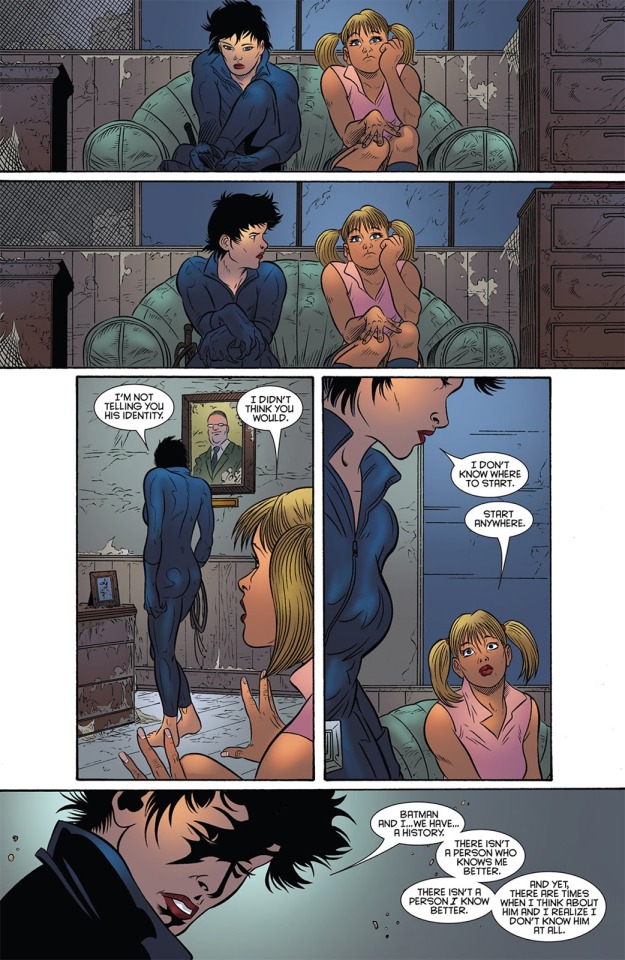
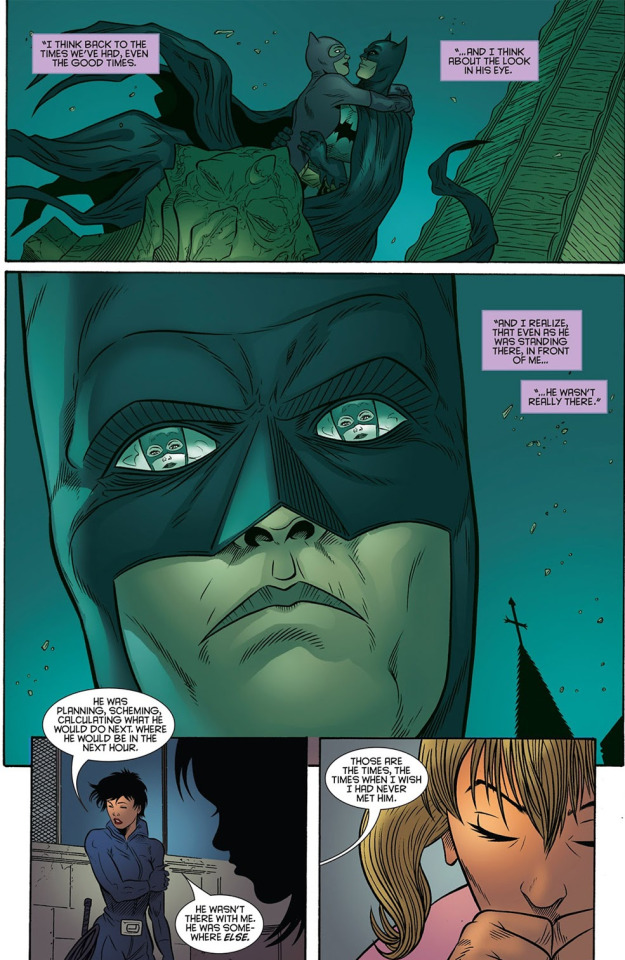
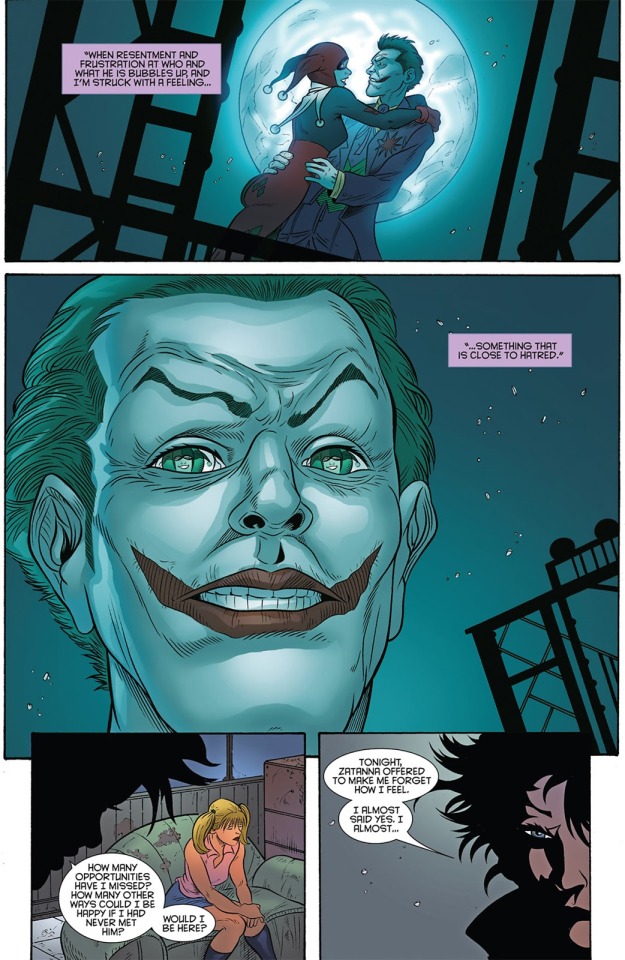

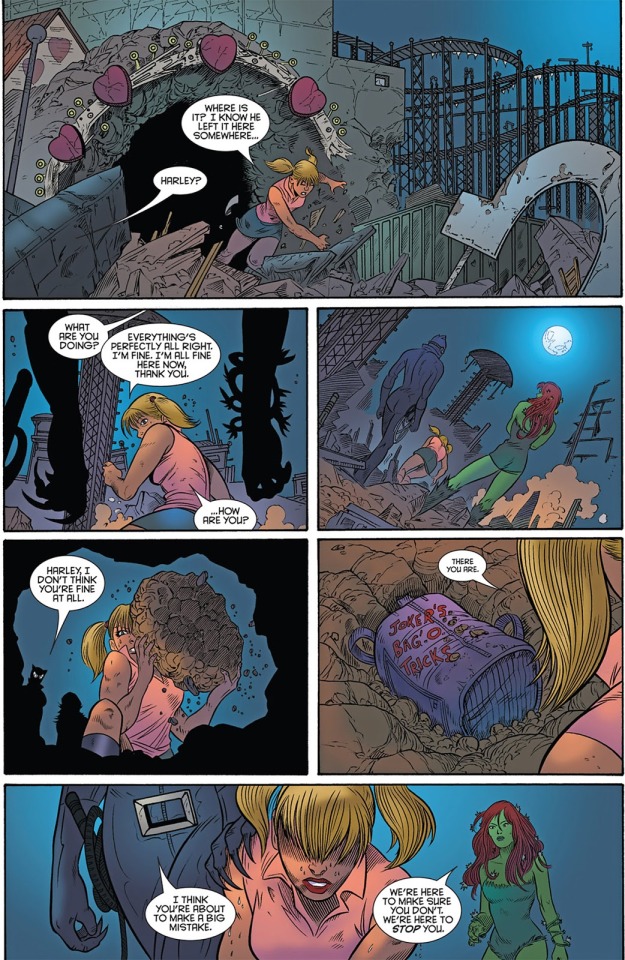
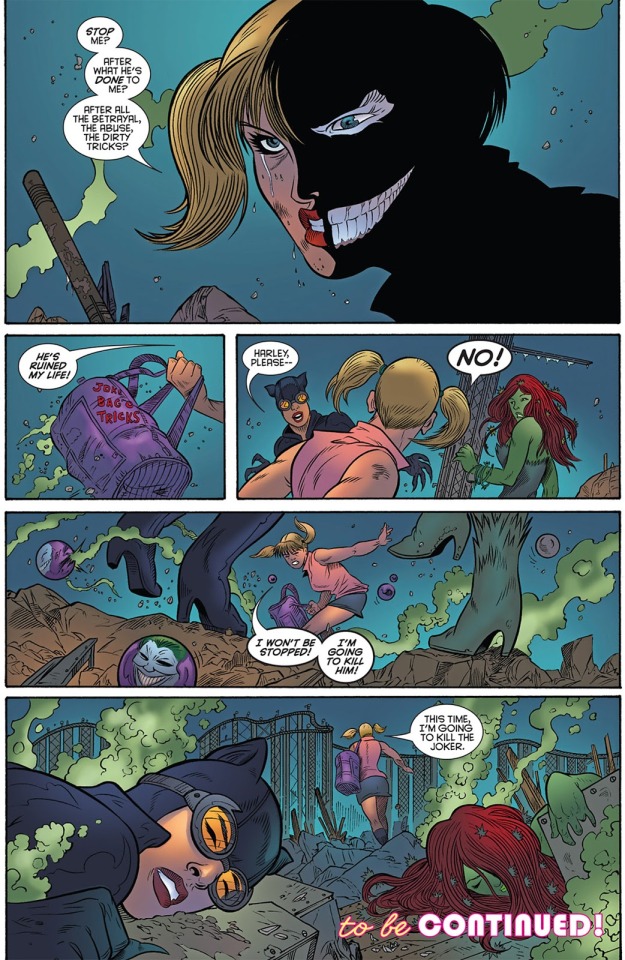
The entire thing in these issues is showing her smarts and how she knows people's trump cards to get under their skin so she can break into Arkham.
She’s trained to identify these things in people and she's fucking good at pushing people's buttons.
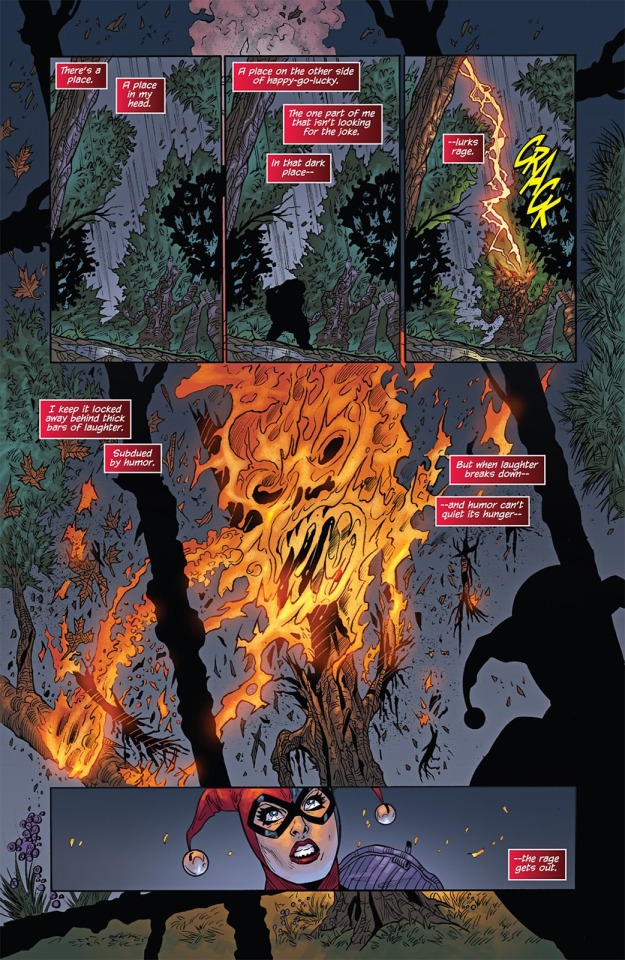
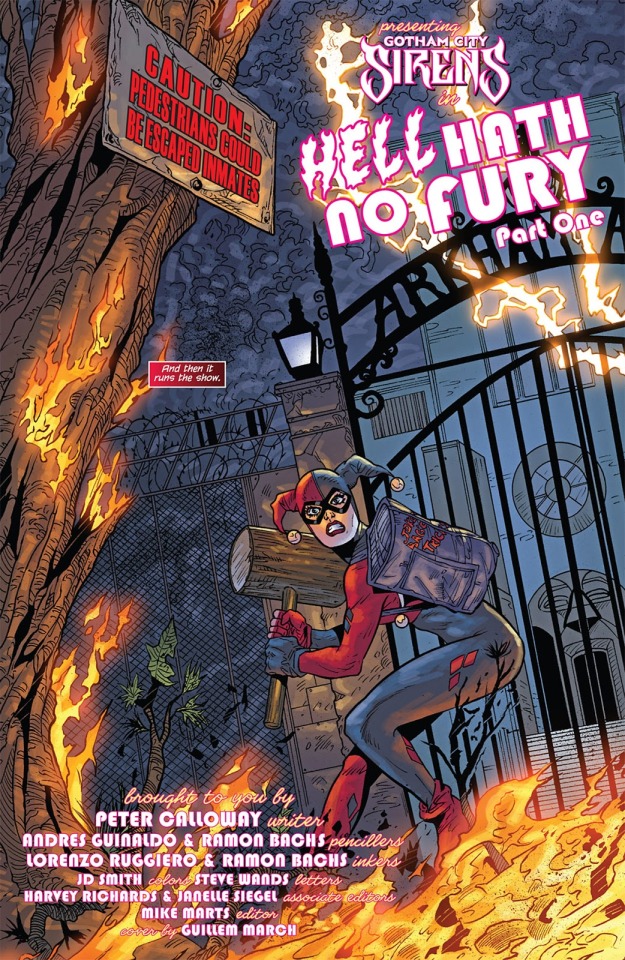
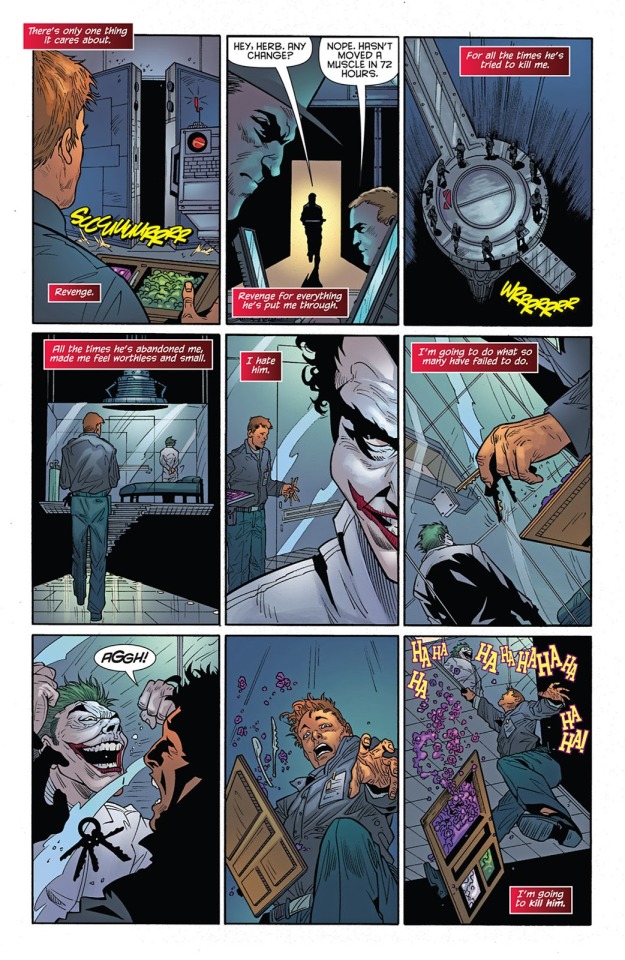
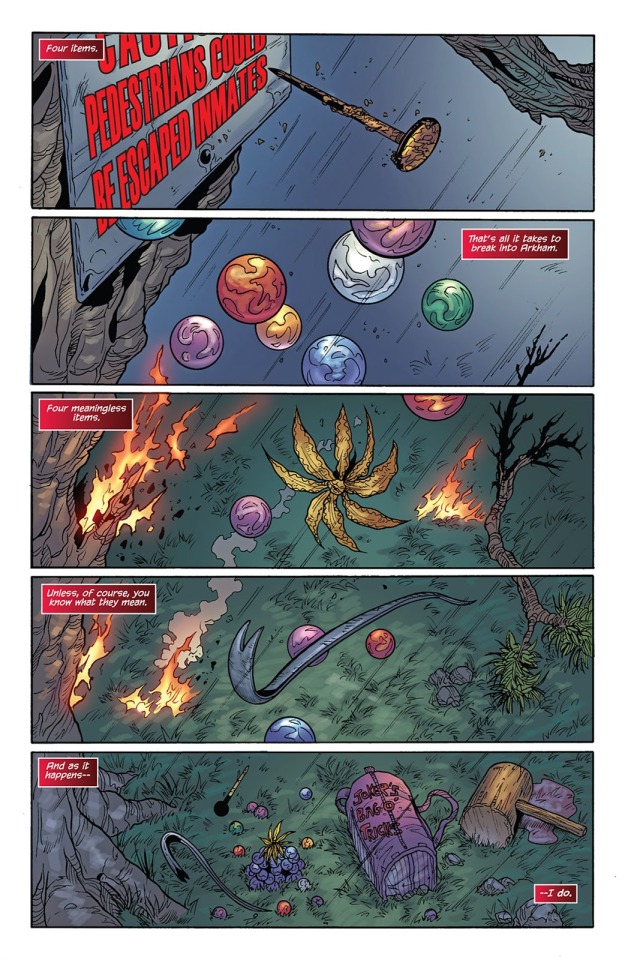
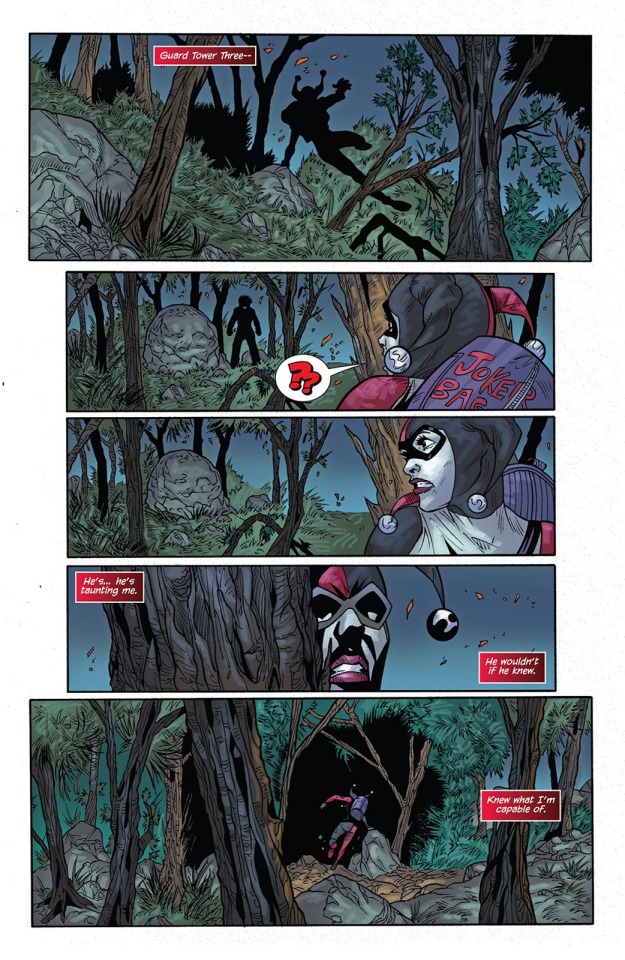
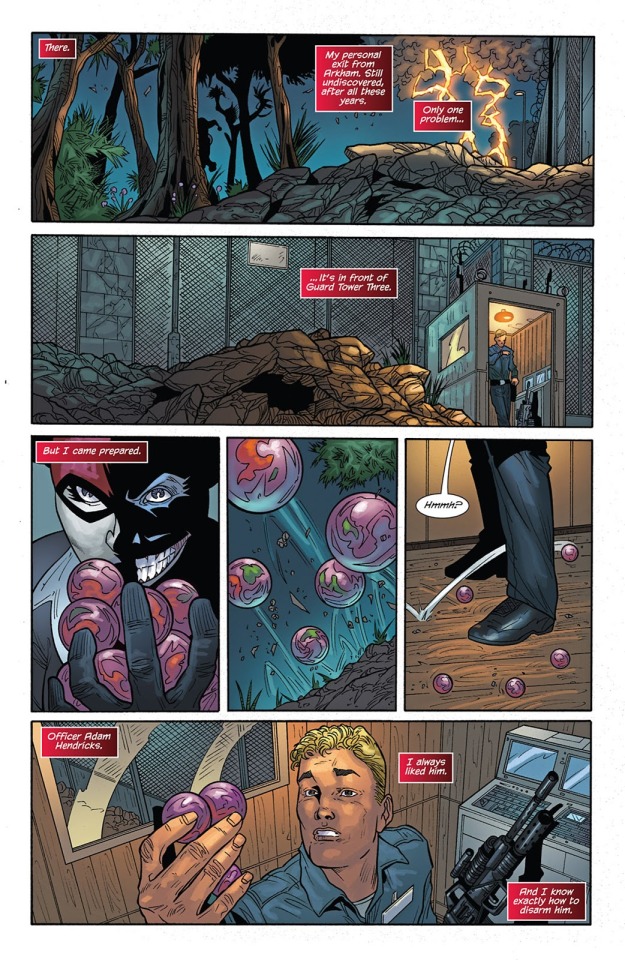
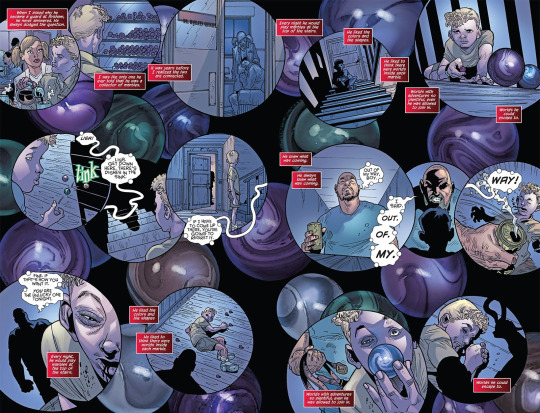
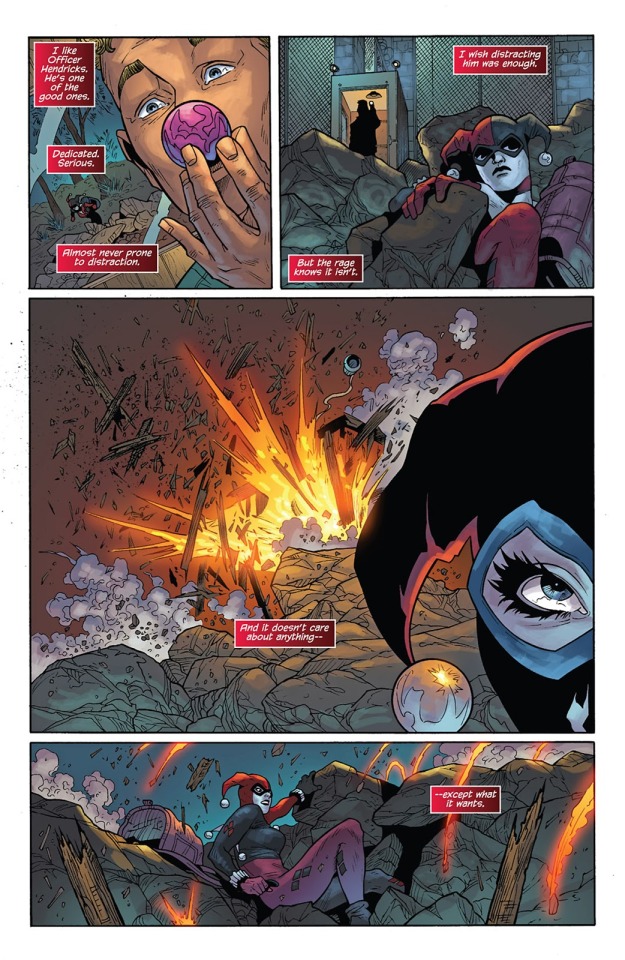
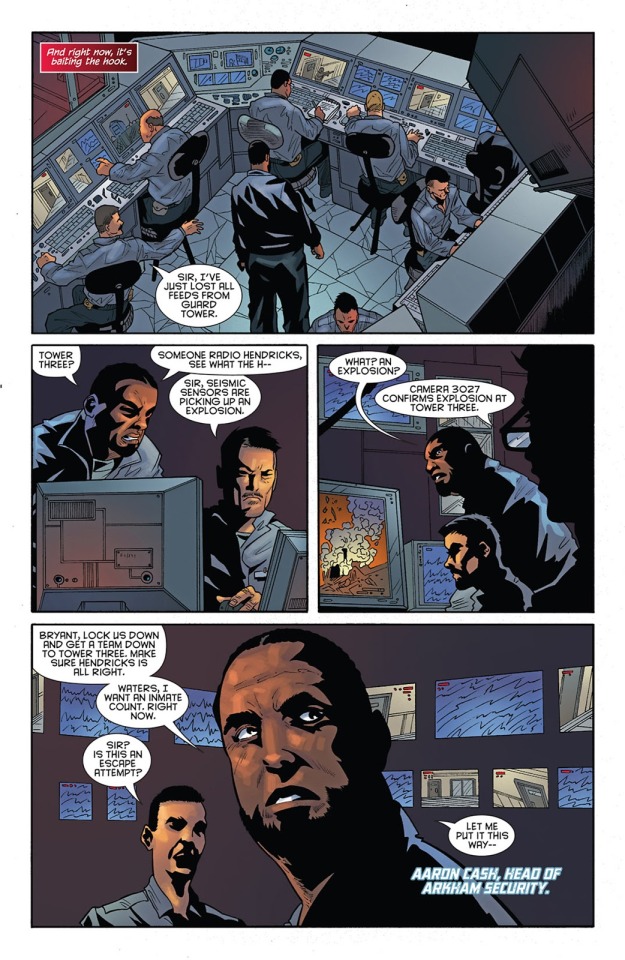
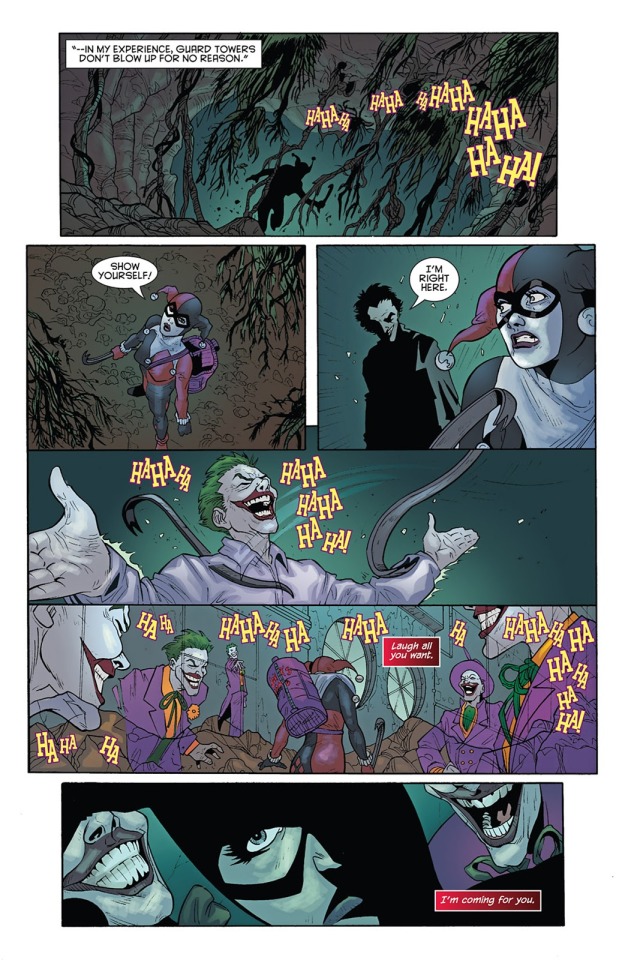
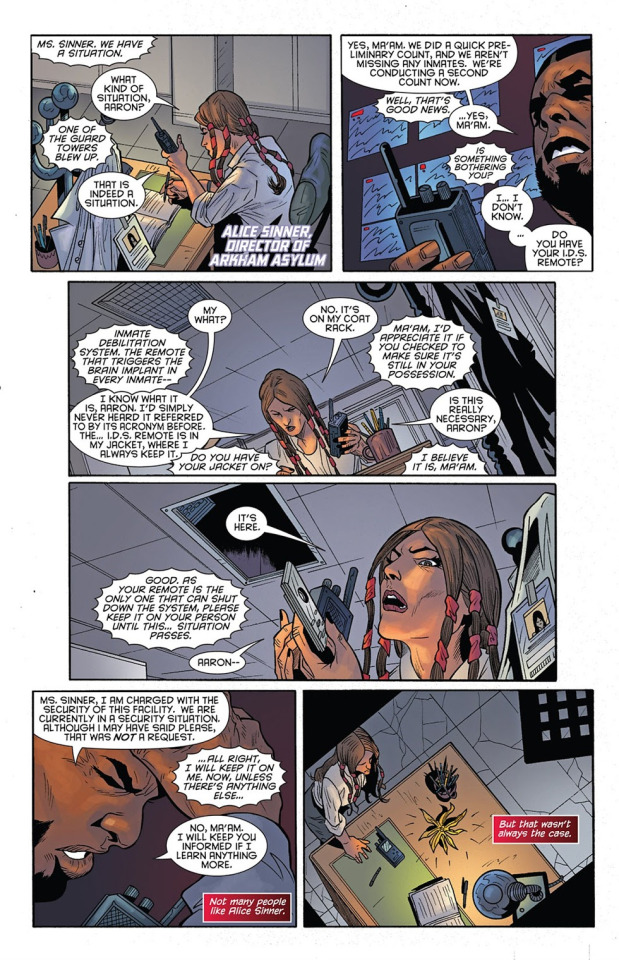
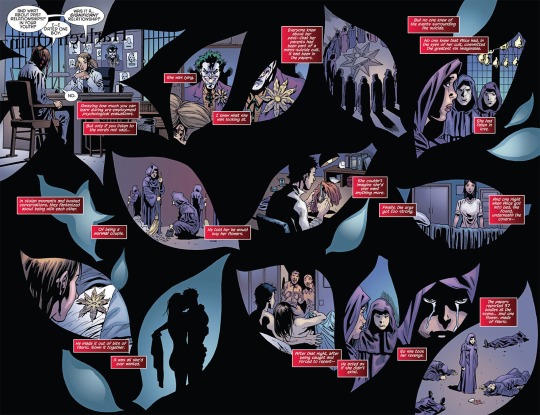
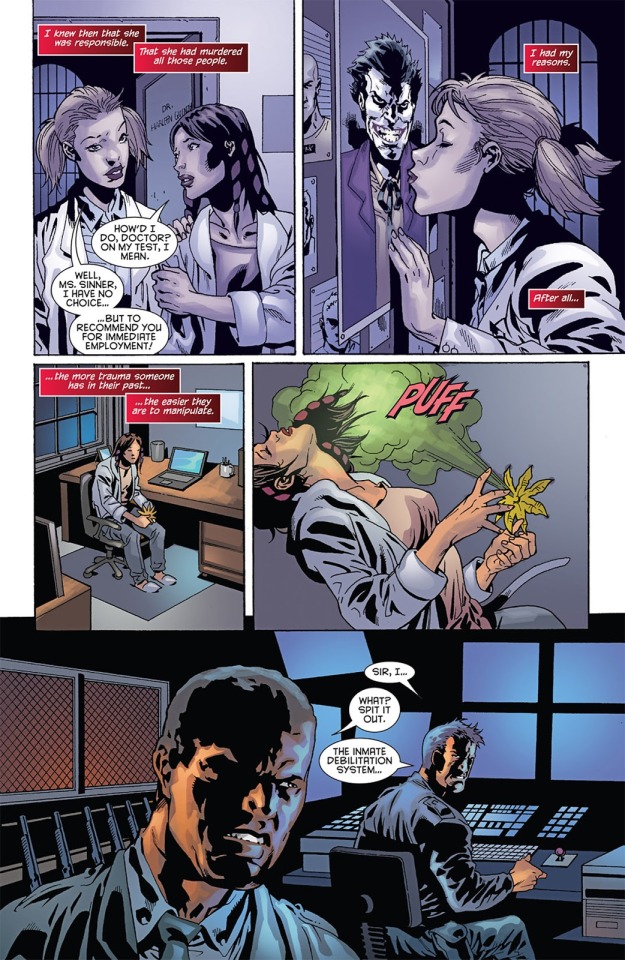
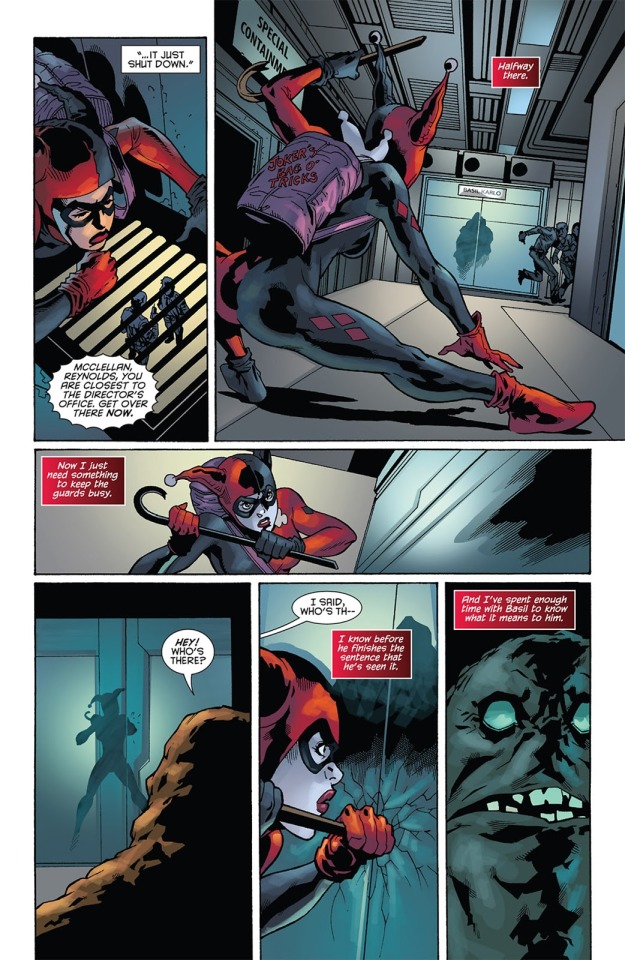
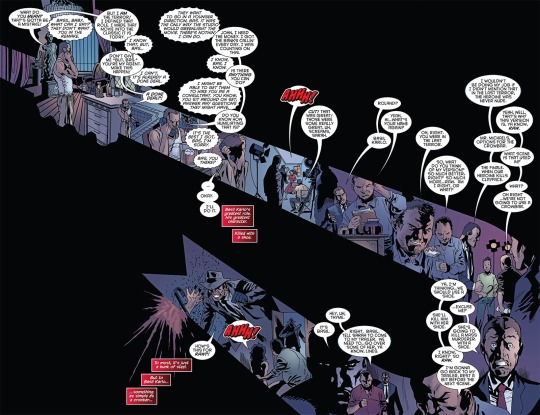
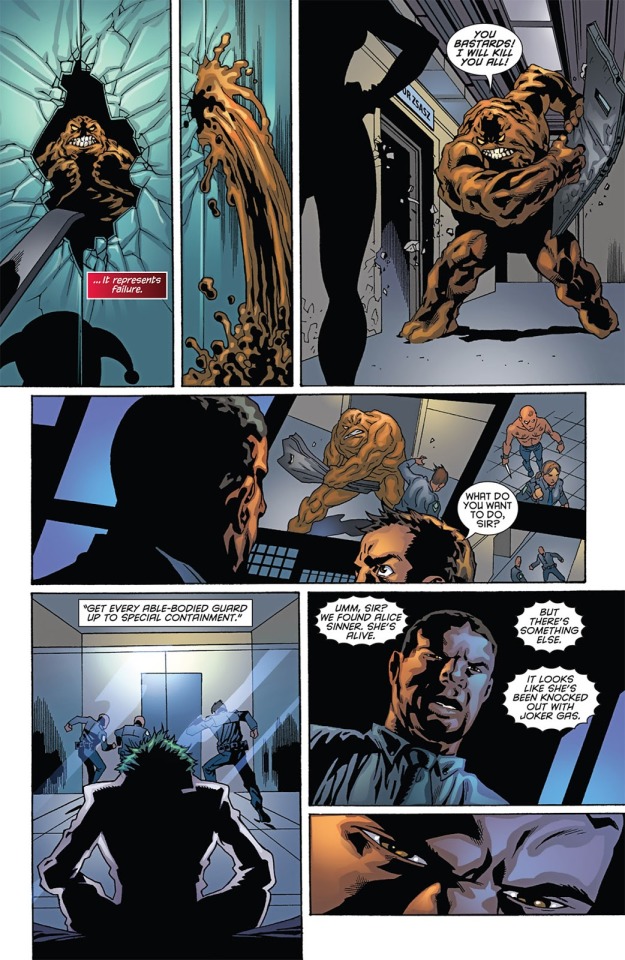
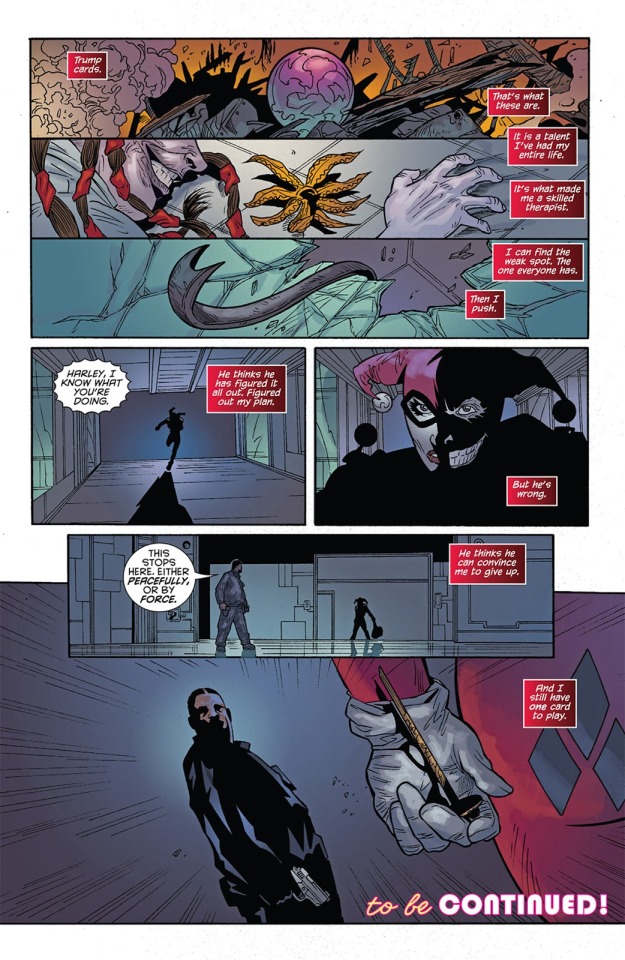

this is also just one of my fav Harley covers so I wanted to show it jsdjksdks

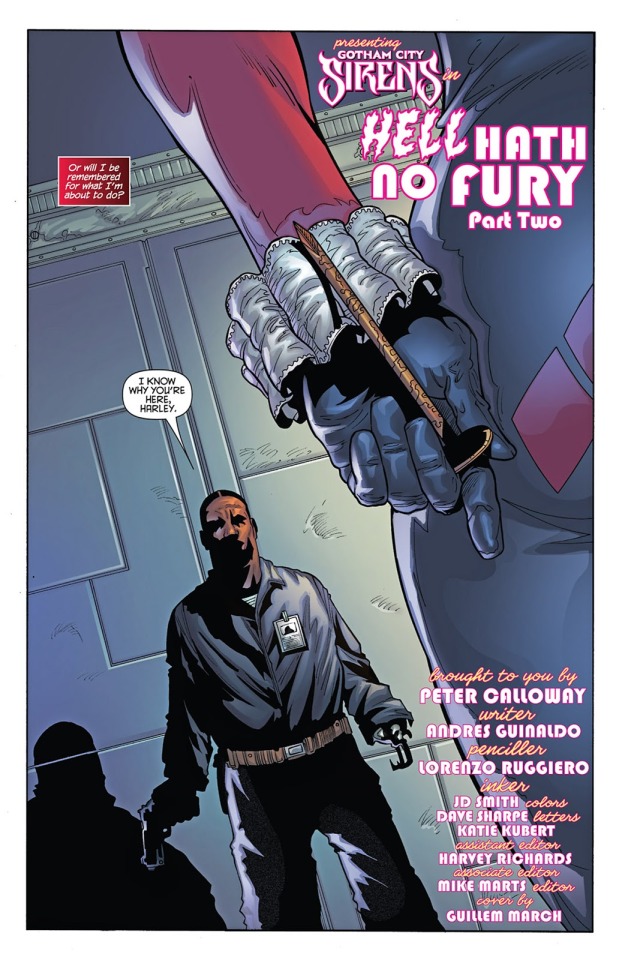
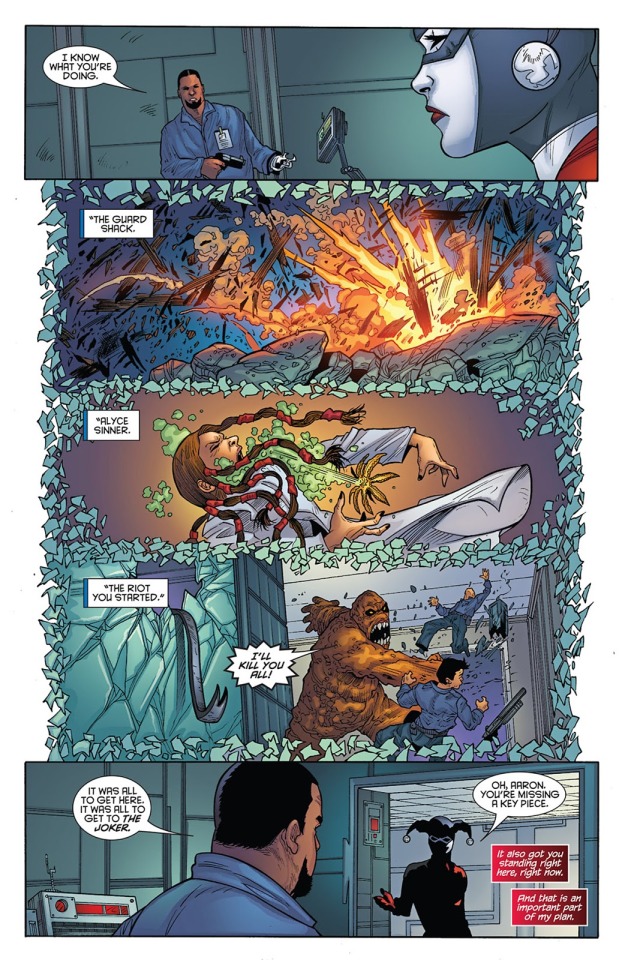
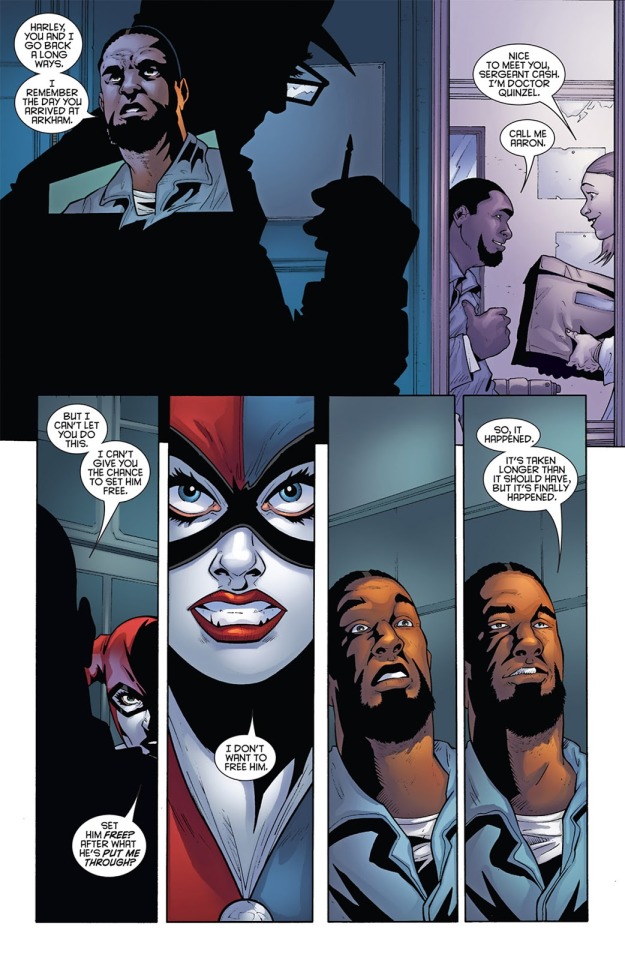
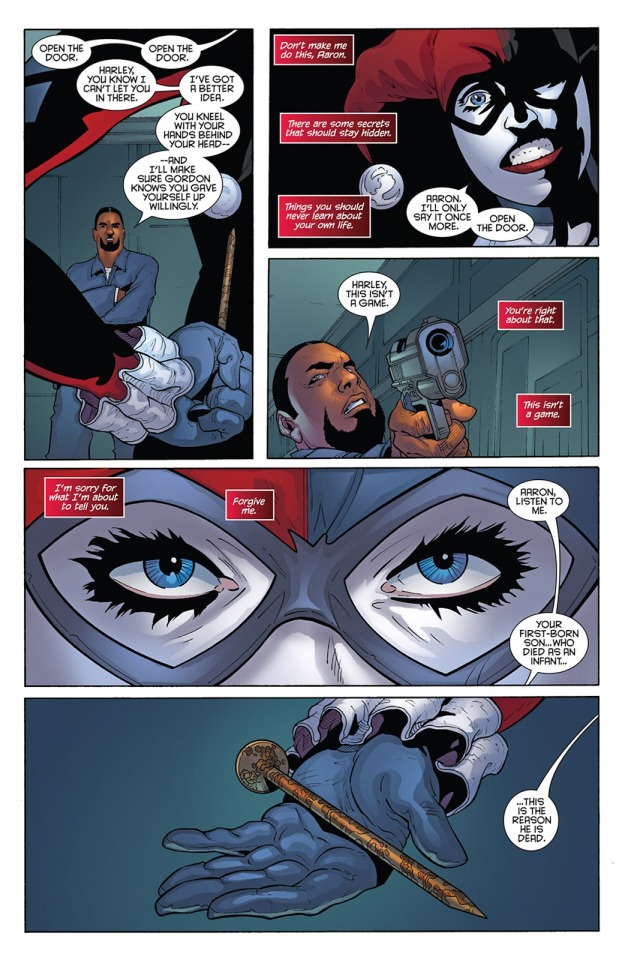
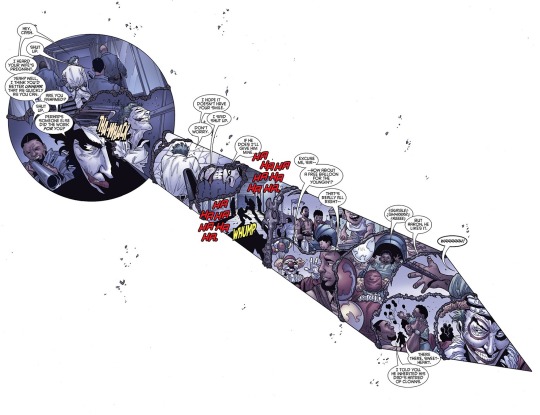
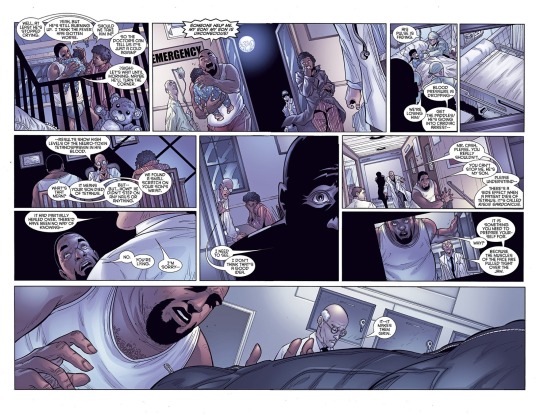
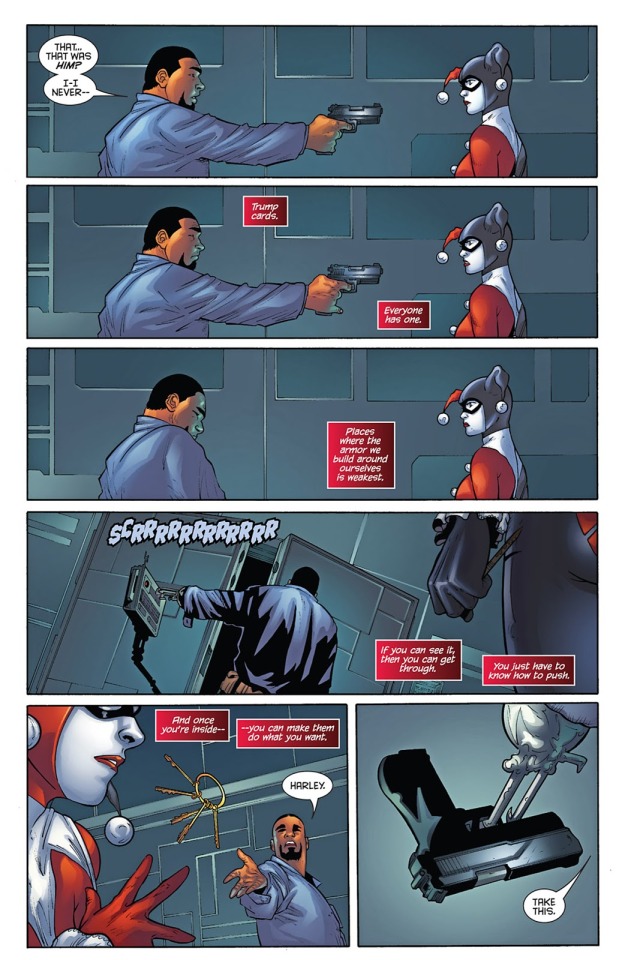
“Trump cards. Everyone has one. Places where the armor we build around ourselves is weakest.”
She’s right. And it’s now shown that Harley’s willing to use those below the belt trump cards if she has to.
And frankly, I’d say this is worse than what she says to Ivy. And I’m not surprised she did it. She didn’t want to, she tried to get him to just open the door -
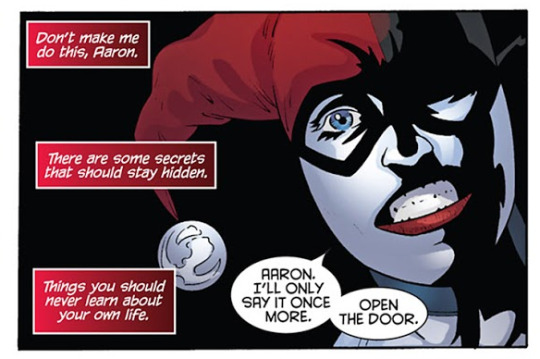
“Don’t make me do this, Aaron. There are some secrets that should stay hidden. Things you should never learn about your own life.”
but she’s also entirely fueled by rage and the desire to kill Joker. She came here for a reason and she’s not leaving until she’s done it.
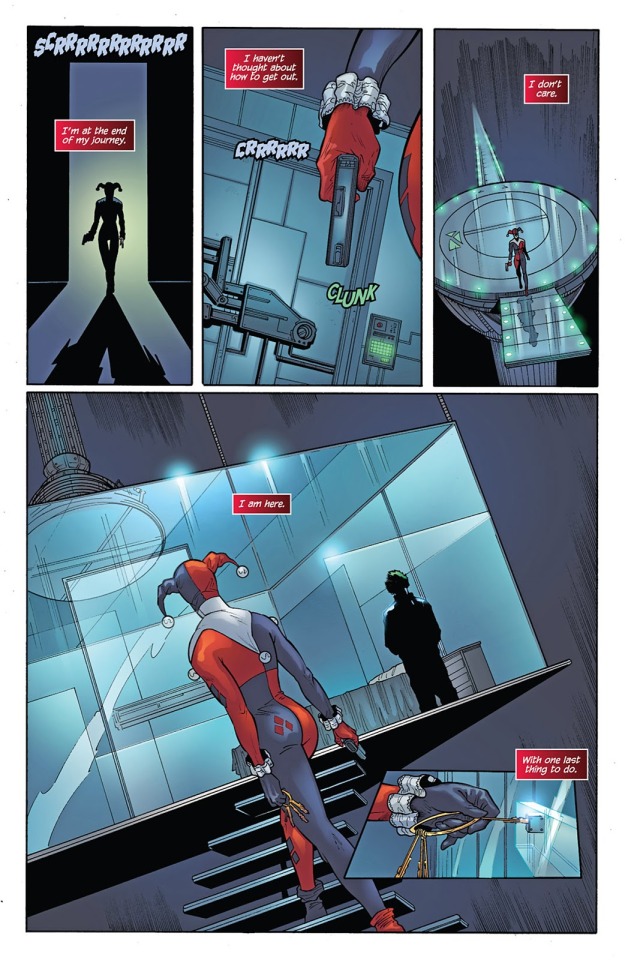
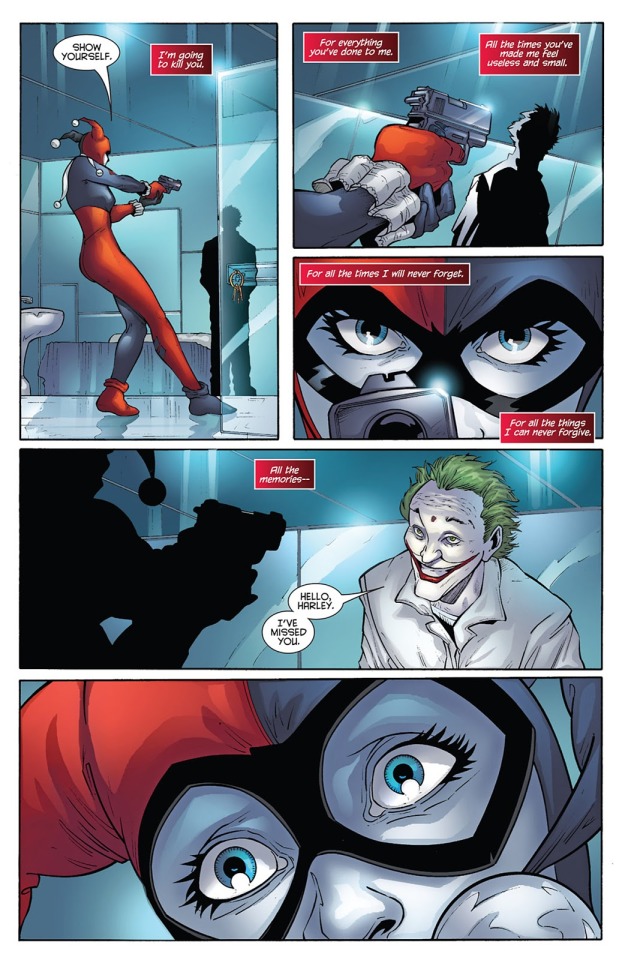
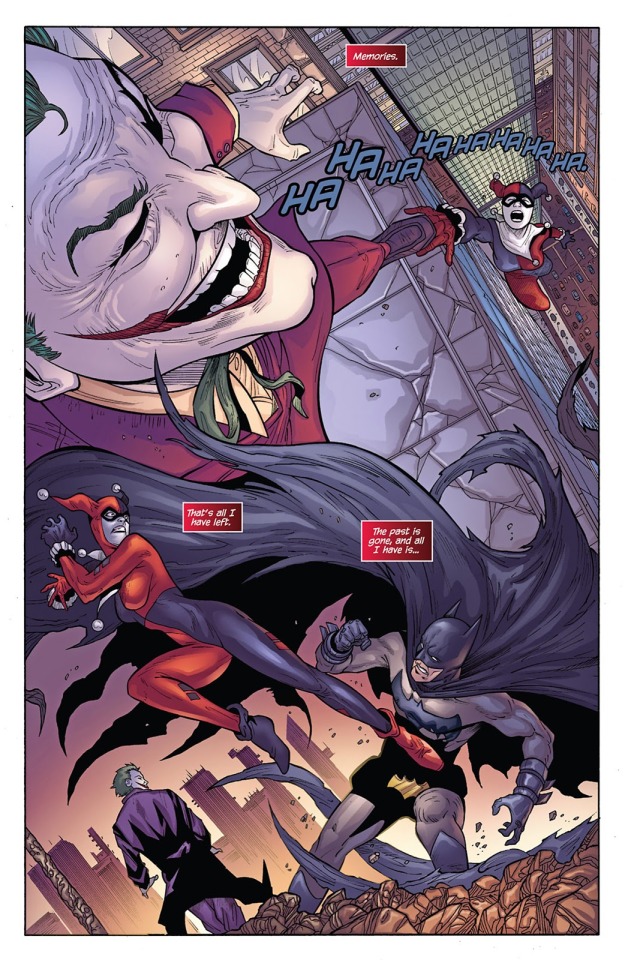
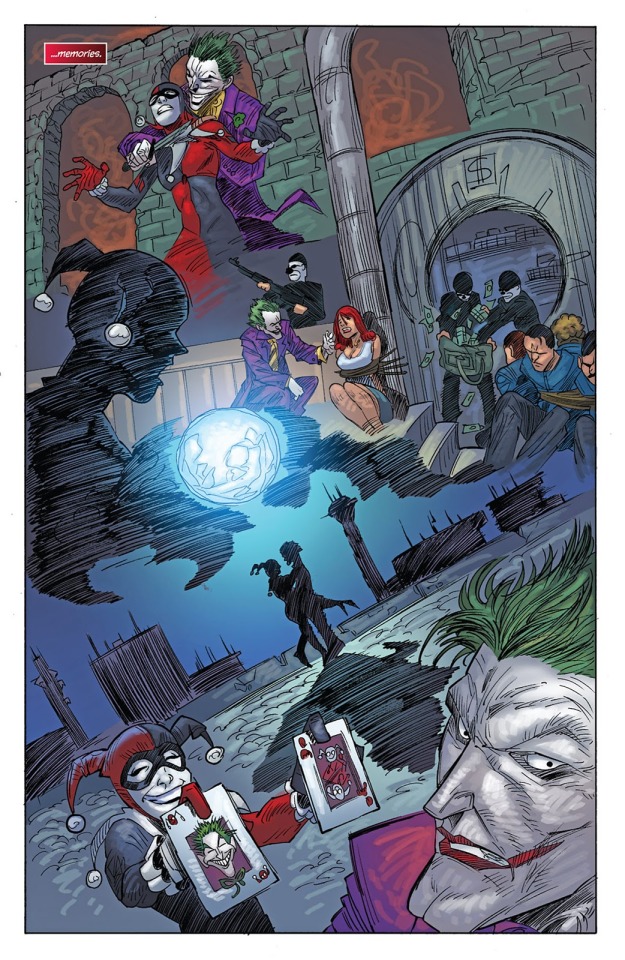


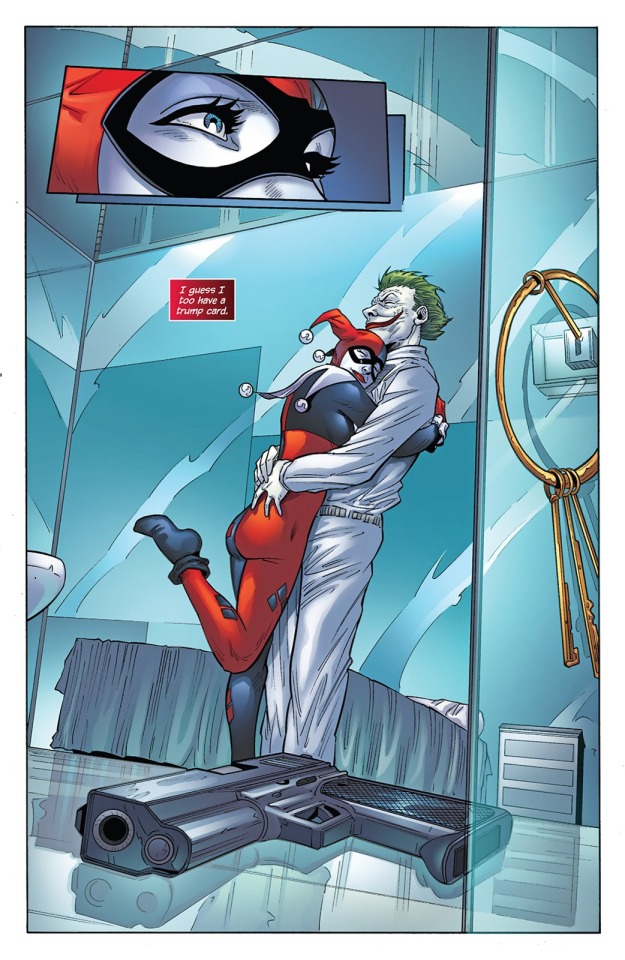
“I’m going to kill you. For everything you’ve done to me. All the times you’ve made me feel useless and small. For all the times I will never forget. For all the things I can never forgive. All the memories -”
“Hello, Harley. I’ve missed you.”
“Memories. That’s all I have left. The past is gone and all I have is... memories.
Memories.
Memory.
Gone.
I guess I too have a trump card.”

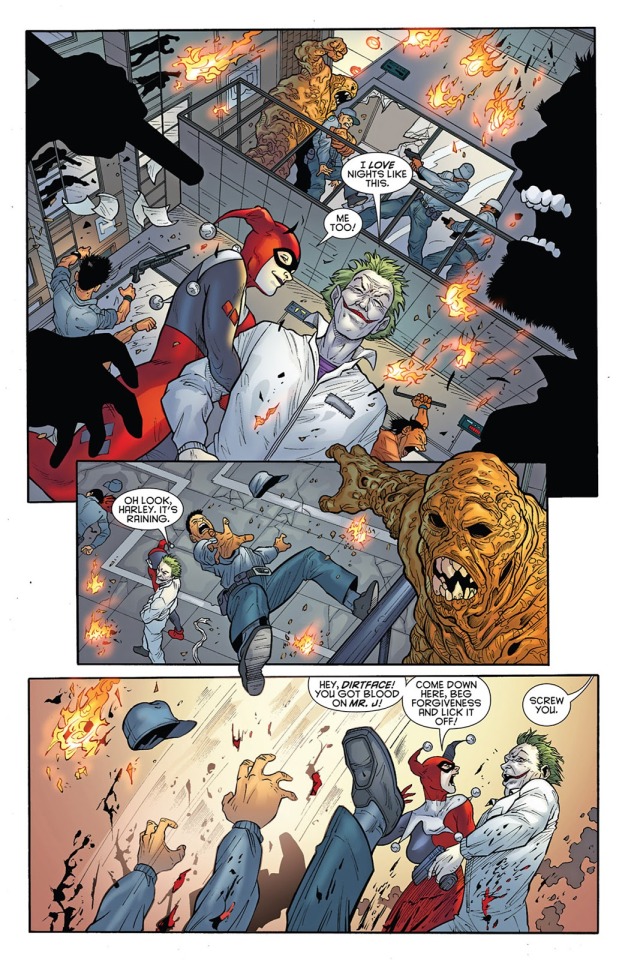

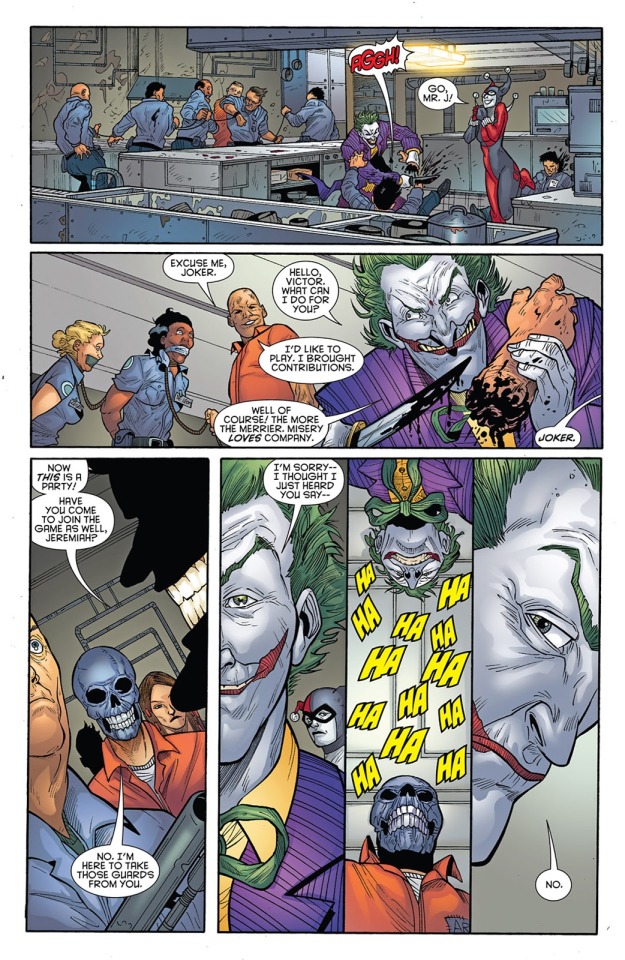
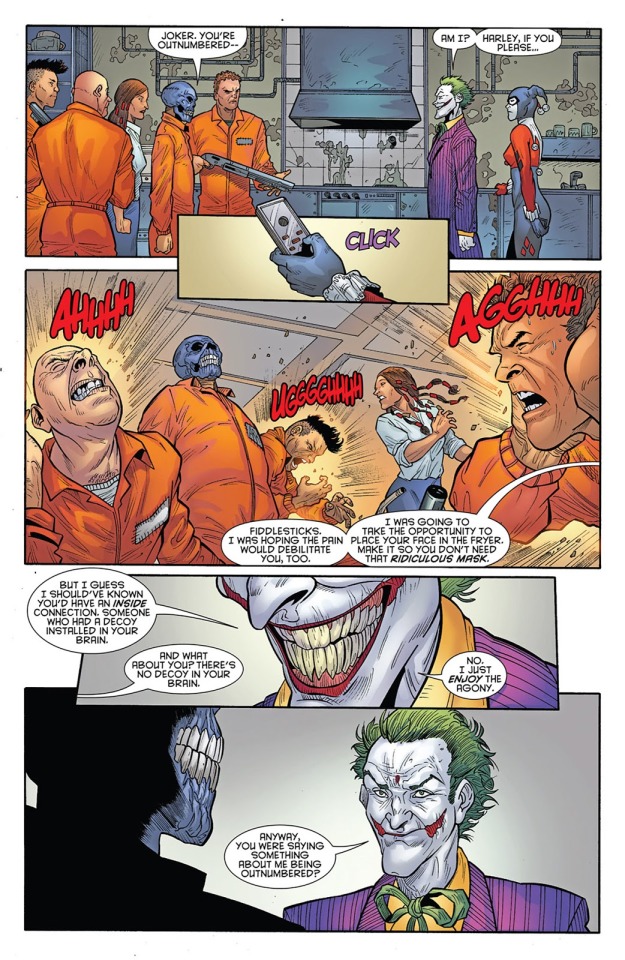
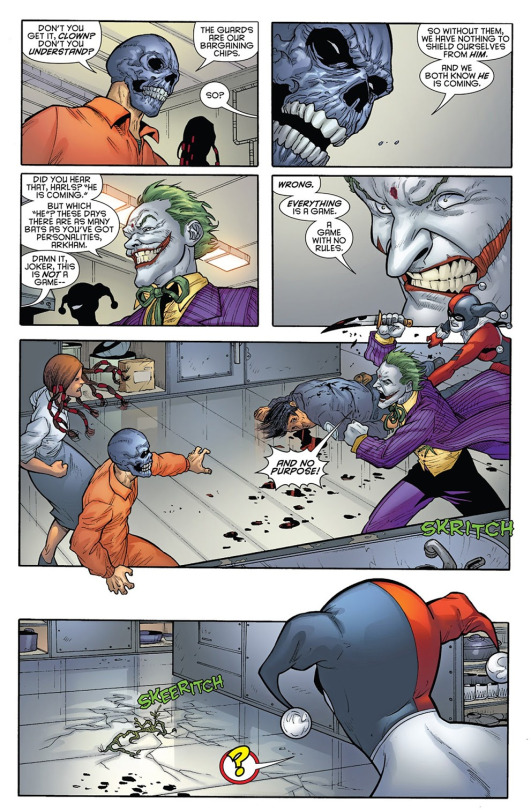
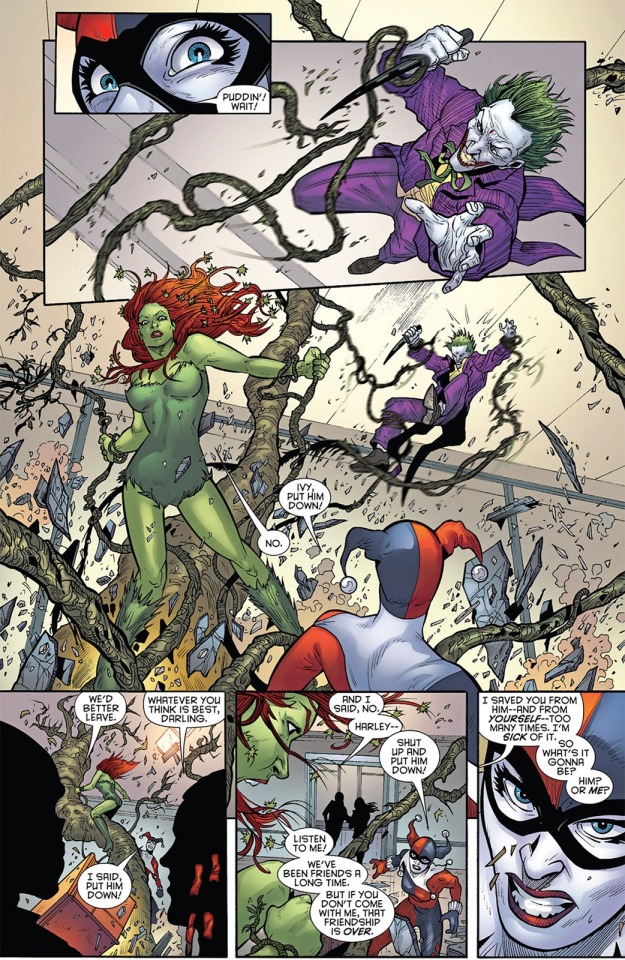
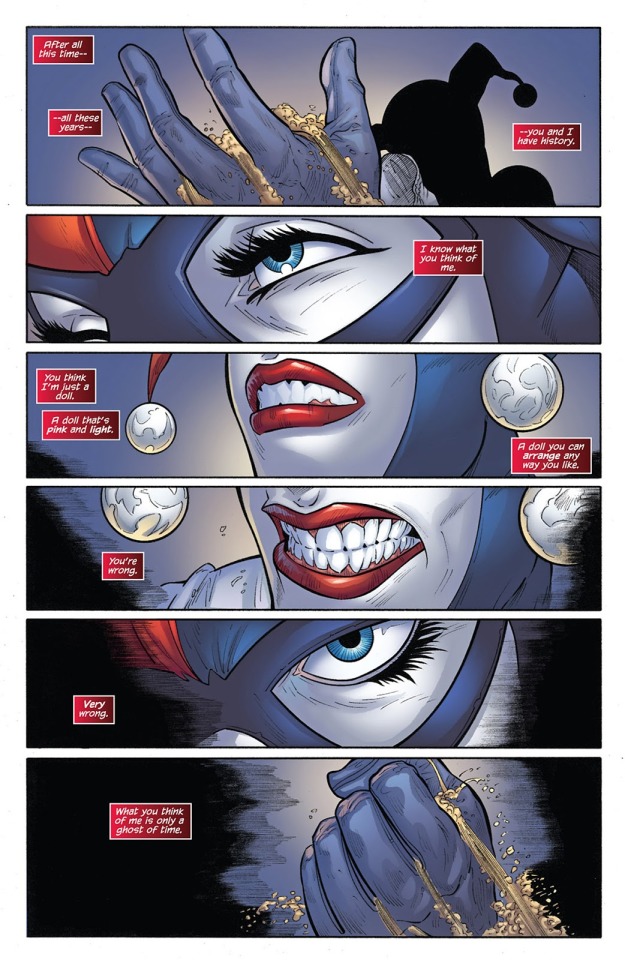
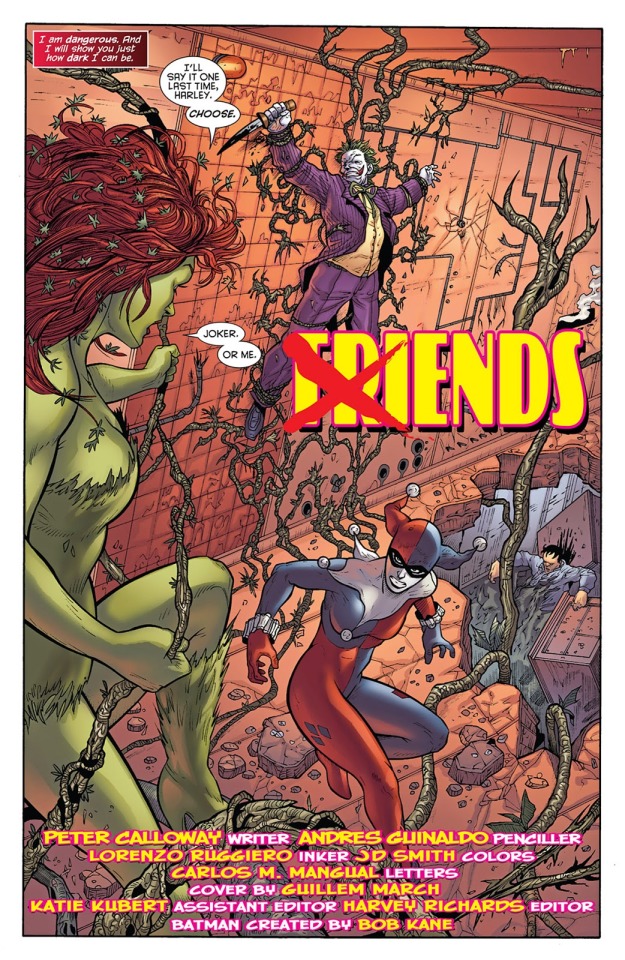
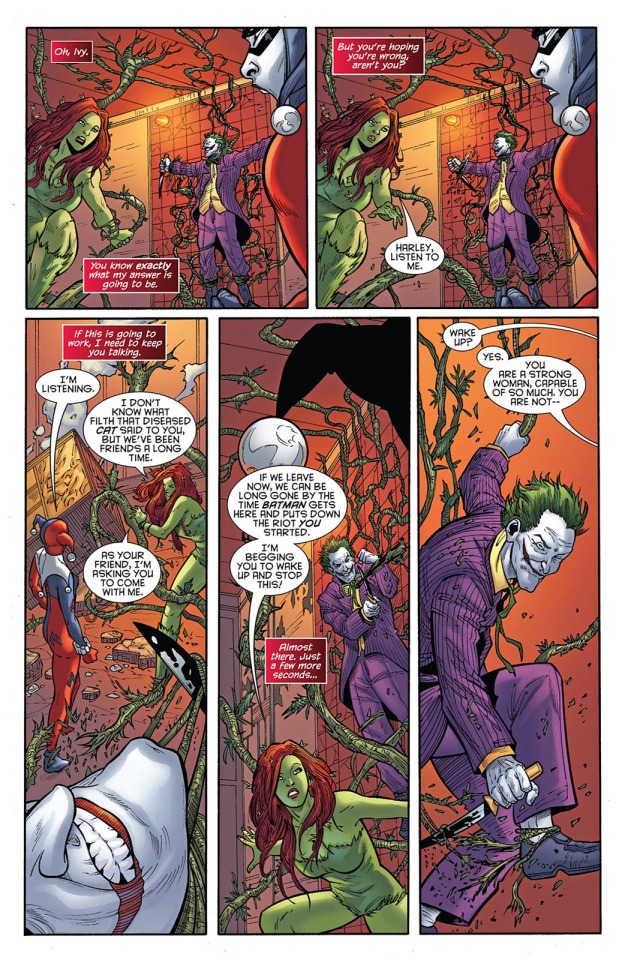
“Oh, Ivy. You know exactly what my answer is going to be. But you’re hoping you’re wrong, aren’t you?”
She’s also right about this, they already mentioned this in #18.
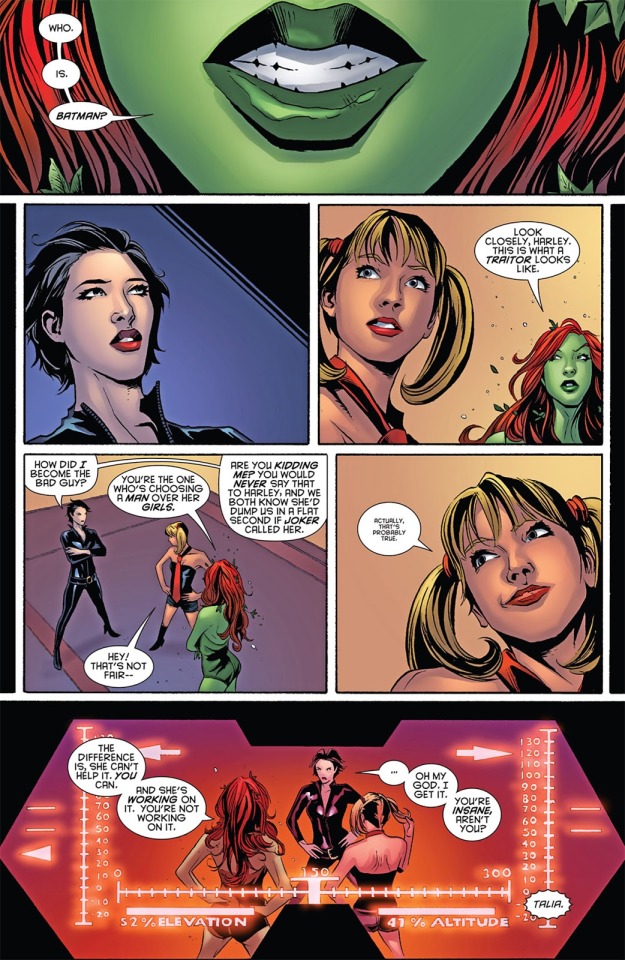
“How did I become the bad guy?”
“You’re the one choosing a man over her girls.”
“Are you kidding me? You would never say that to Harley, and we both know she’d dumb us in a flat second if Joker called her.”
“Hey! That’s not fair-- Actually, that’s probably true.”
“The difference is, she can’t help it. You can. And she’s working on it. You’re not working on it.”
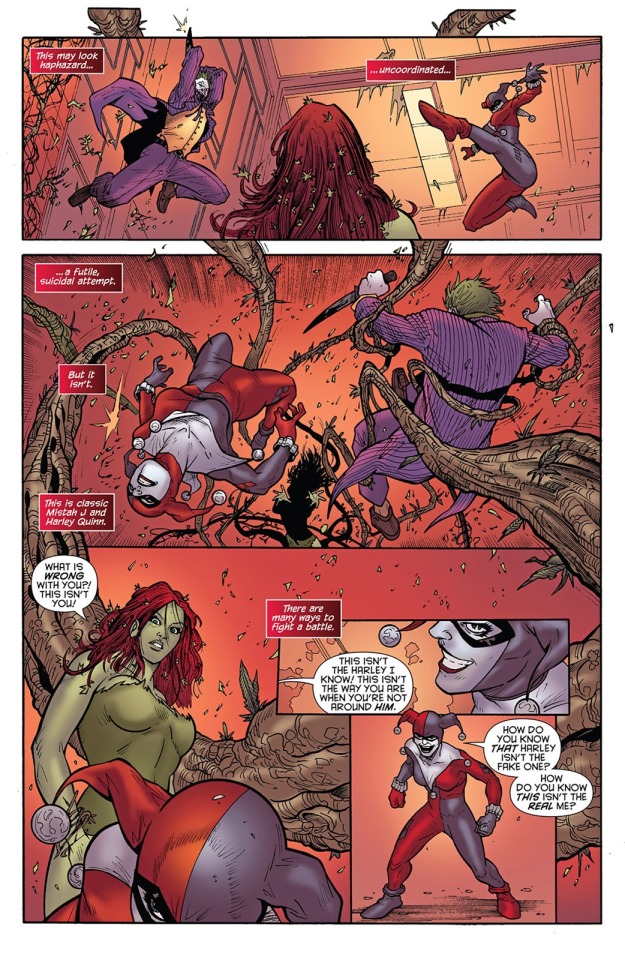
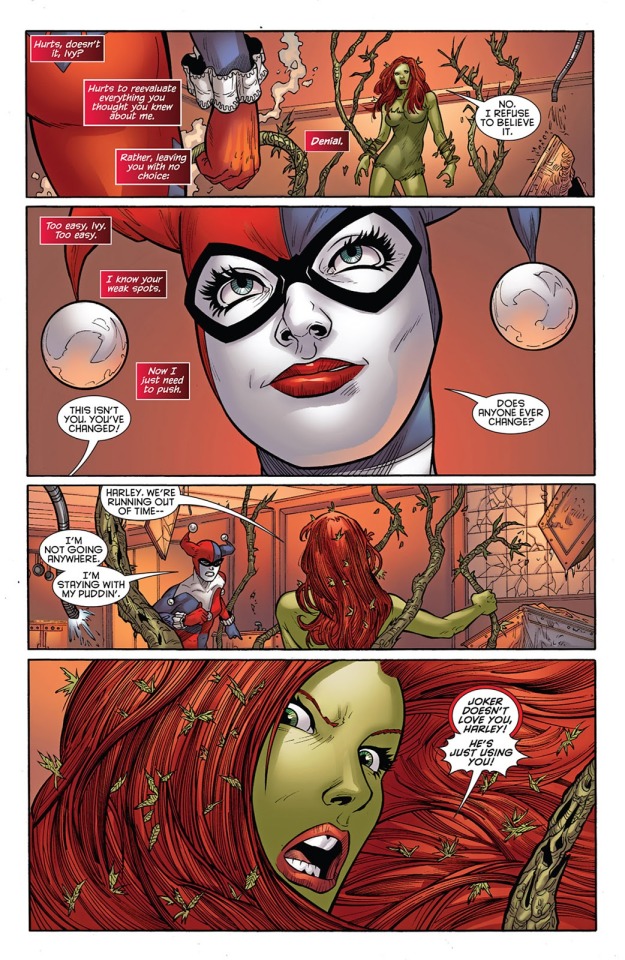
“Too easy, Ivy. Too easy. I know your weak spots. Now I just need to push.”
This is exactly what she’s been doing since the starting point of this post. She’s still in that mindset and she knows she can’t beat her on a regular battle field. Neither of them can.
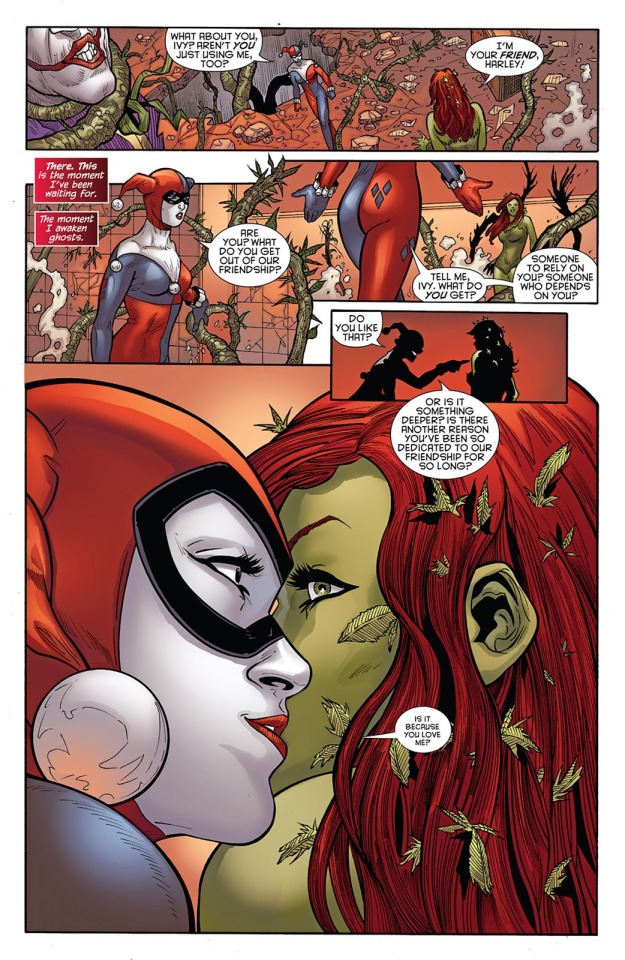
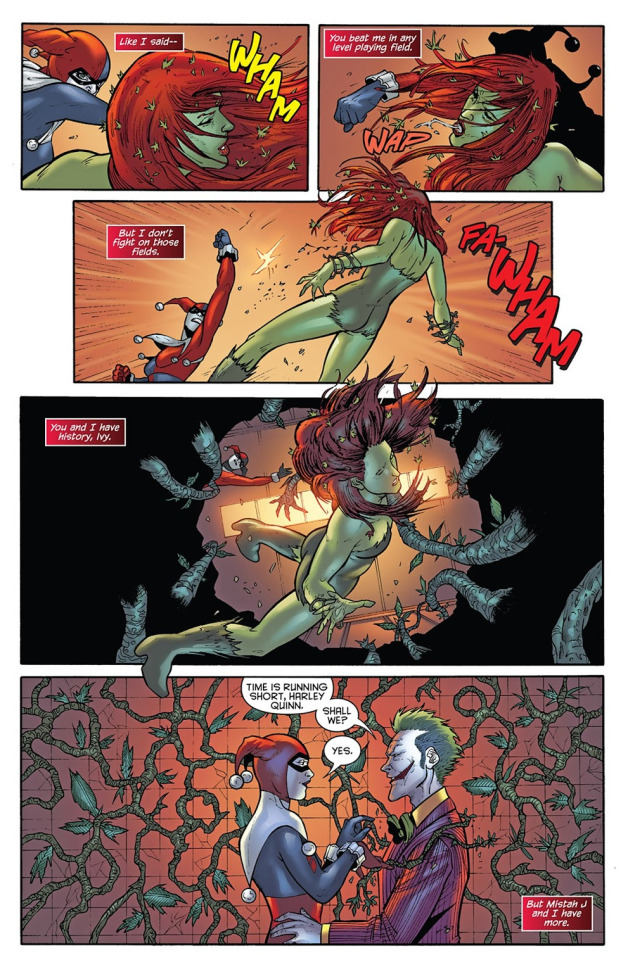
“Like I said-- You beat me in any level playing field. But I don’t fight on those fields.”
Harley’s biggest strength as a villain is her ability to completely mentally stall her opponents and learn their weak spots. She wouldn’t win against the majority of the Big Bads if she didn’t fight on a different field than they are.
so, like yeah, out of context what she says to Ivy seems awful and completely screwed up, and it is, but it’s also built up really well and it’s completely in character for her at this point in her fall during these issues.
Is what she did fucked? absolutely. It’s not painted that it’s not.
Ivy Literally Goes To Kill Her For It.
In the end of this all three of them are recaptured by Catwoman and Batman and that’s where we’re starting off at again.
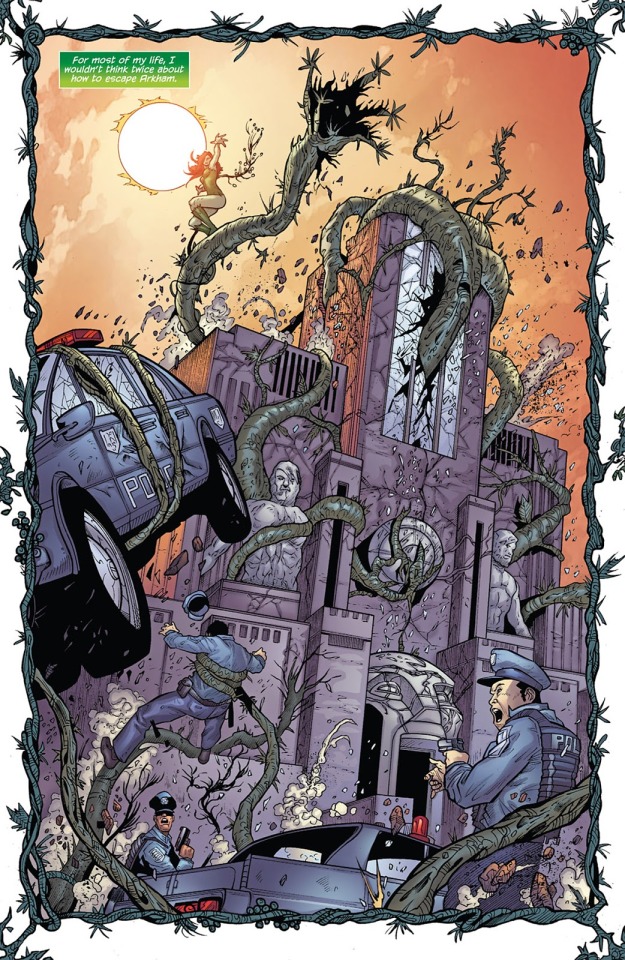
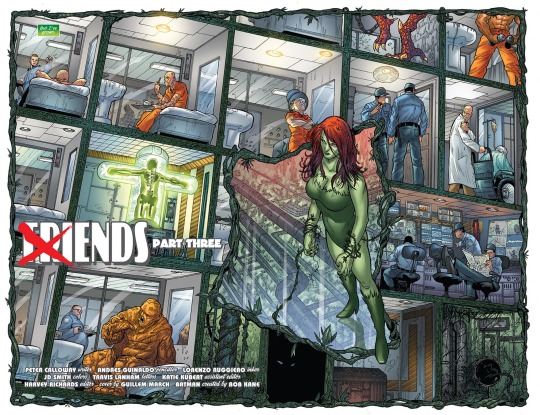
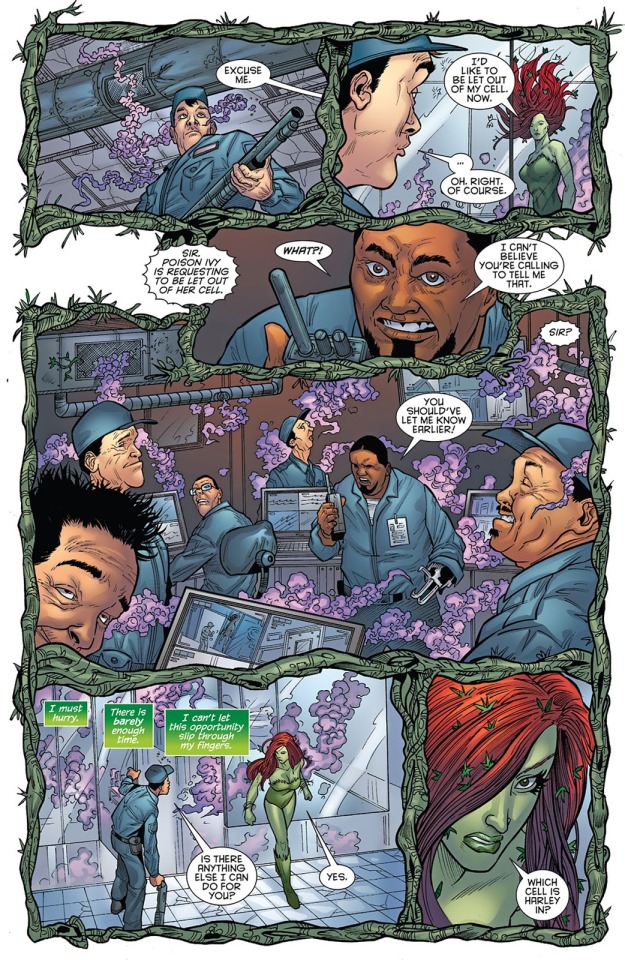
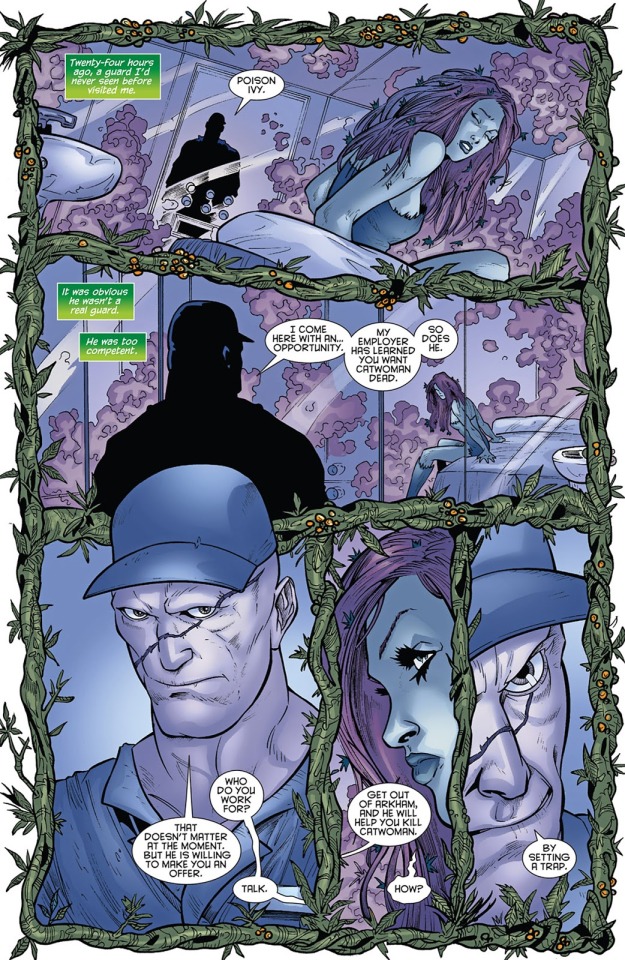
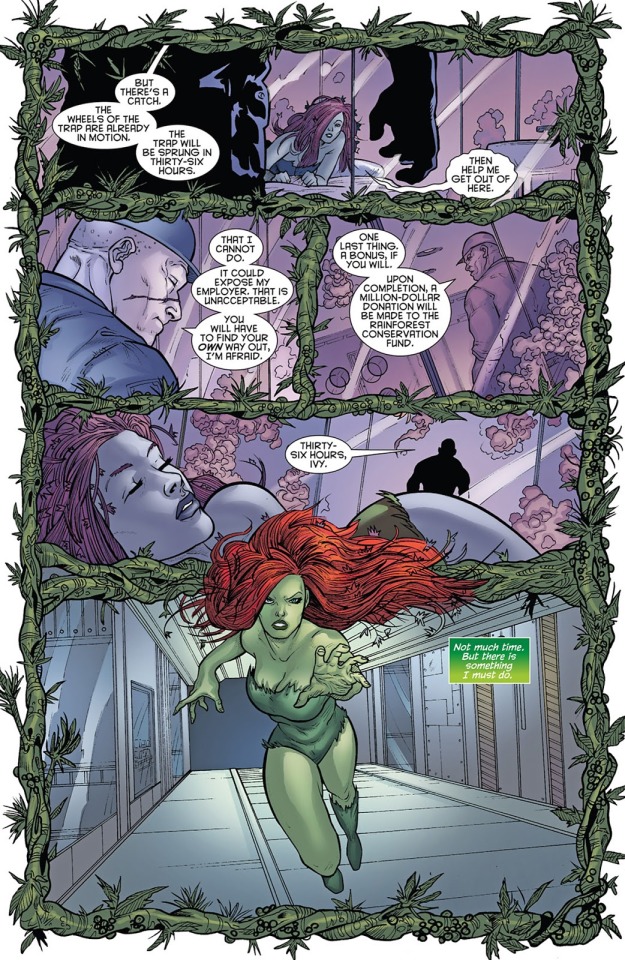

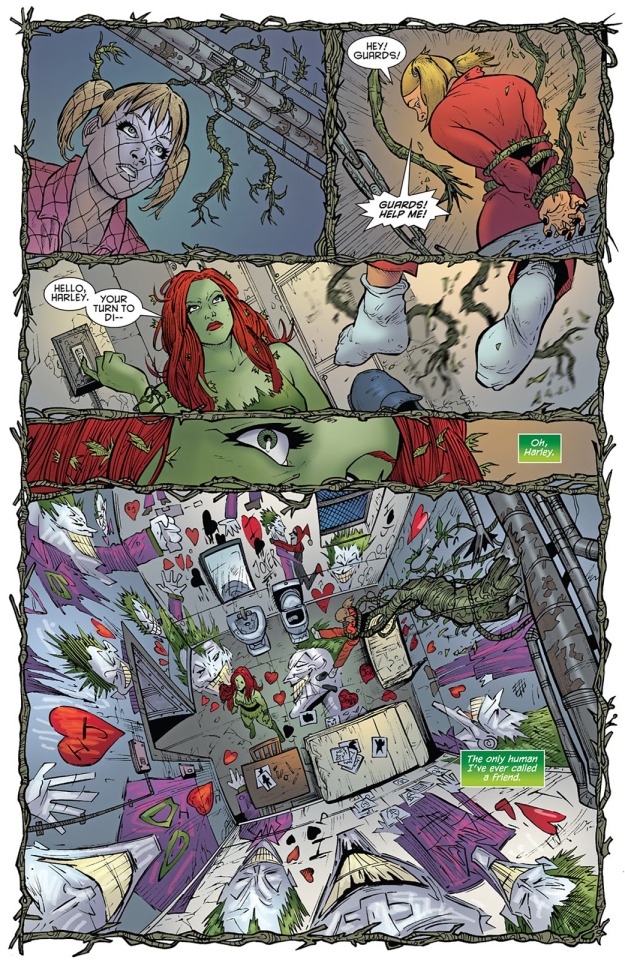

“Oh, Harley.
The only human I’ve ever called a friend.
To what lengths will I go? Where are my own limits? She is the Strangler fig. And I am the tree, choking underneath.
Without me, she could never grow.
But without her, I would fall if I grew too tall.”
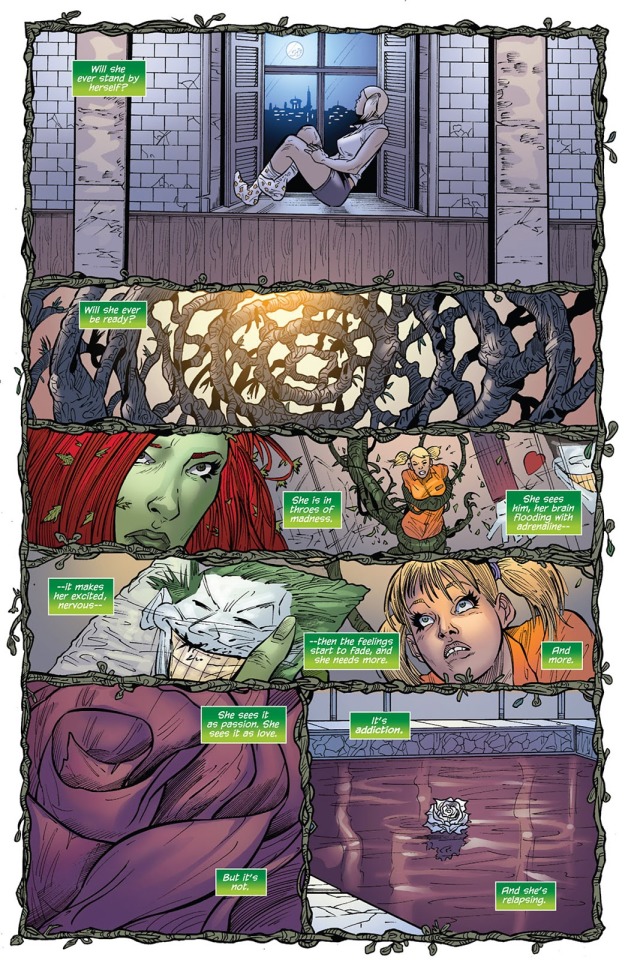
“Will she ever stand by herself?
Will she ever be ready?
She is in throes of madness. She sees him, her brain flooding with adrenaline, it makes her excited, nervous, then the feelings start to fade, and she needs more. And more.
She sees it as passion. She sees it as love.
But it’s not. It’s addiction. And she’s relapsing.”
Ivy is well aware of the nature of their relationship. She’s not stupid and she’s been shown already to know that it’s something that takes time. It’s not a one off break up and it’s over. That’s not how abusve relationships work.
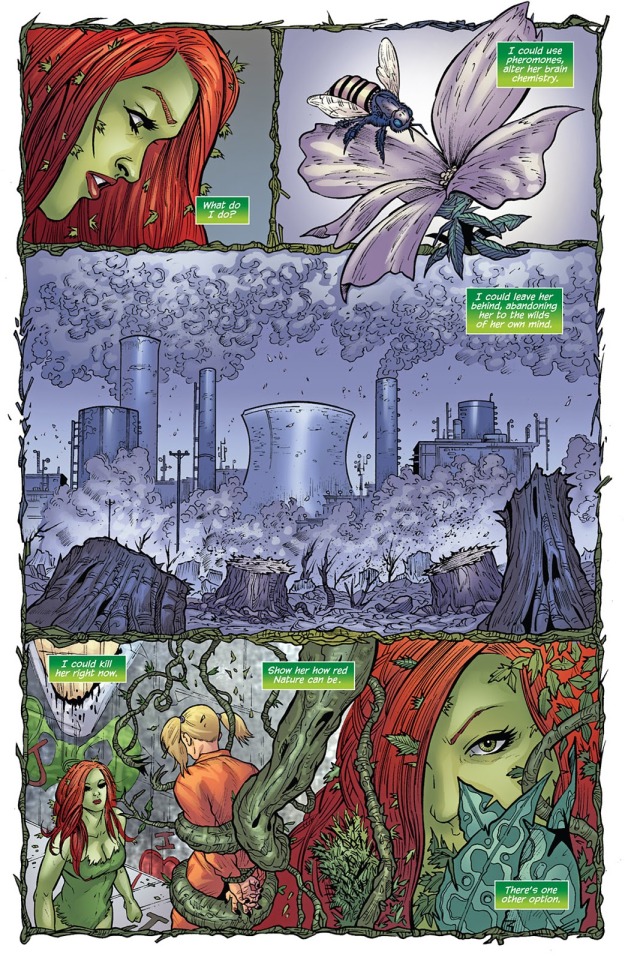
What do I do?
I could use my pheromones to alter her brain chemistry.
I could leave her behind abandoning her to the wilds of her own mind.
I could kill her right now.
Show her how red Nature can be.
There's one other option.

It would require patience.
Even love.
Maybe I'm more human than I want to admit.

"You have one chance to answer this."
I know, if she agrees, she'll be doing it for revenge. For him.
"She put us behind bars."
But maybe if I get away from this place, if I give her something else to think about. Maybe she can break the cycle. But it has to be her choice.
"I'm going to kill her. Come with me."
So yeah, it’s definitely not a just “Harley hurts her and runs off with Joker and it’s just a plain ol’ her choosing him over everyone and that’s that.”
Jarley shippers love to just reduce all her scenes and arcs down to their “epic love” and shit, but that’s taking away literally everything about her and reducing it down to the 3 panels that they’re “cute” in. Her arc in this part is fucking heartbreaking to read.
And Ivy damn well knows what’s going on with her. She’s smart and she’s the one that’s been there throughout all of this. She found her in the park after he shot her out of a rocket.
And she knows it’ll take time for Harley to get over and through his manipulation, that’s just how it works with abusive relationships.
But she’s also not forgiving at first, she’s mad and rightfully so, until she sees the sate of Harley’s cell and realizes how bad her addiction is at that time.
A lot of the unhealthy moments on Harley’s side when it comes to them are directly caused from the effects of being in an abusive relationship with Joker. Because she’s always in this area of her journey in those moments. She’s never fully over him or emancipated.
And that’s realistic. It’s hard sometimes to be friends with someone who’s in abusive relationships like theirs, having to watch them return to that person time and time again and it’s frustrating after a while.
I know from personal experience, it’s really hard to watch someone you care about go back or forgive someone that continues to hurt them.
But abuse victims desperately need a support system outside of their abuser. It’s a crucial part of being able to escape, because when they do try to get out they need someone there or they’ll literally have no where to go but back into their abuser’s arms.
It’s heartbreaking and it’s really rough for everyone effected, but that’s just how it is most of the time. Especially in their case, as they’re not just regular folk dealing with this.
If she doesn’t have Ivy, Harley has no one else to go to but Joker, on more than just an emotional level.
She’s lost her job. Her income. Her home. Her livelihood. Her everything.
Most of the time she has no other choice but to return to a life of crime after she’s released from Arkham because she can’t get a job, she’s a notorious criminal and she’s got a lot of issues that don’t just disappear with a bit of therapy.
She has no other choice but to return to Joker because the other alternative is the streets. At least she knows what to expect with him.
And that’s not even getting into the manipulation, gaslighting and degrading abuse that he drills into her constantly.
He’s made her believe she’s not anything without him. That she’s not smart or useful or anything.
And that’s why it’s so damn important for her to have a support system and why he’s so damn against Ivy.
Because Ivy is the good voice on her shoulder telling her he’s wrong and that she doesn’t deserve that.
-
And on Ivy’s side, she’s aware she gets very near cutting off all parts of her humanity.
She’s a plant goddess, she’s insanely powerful and she feels everything through the green. Frankly, she’s not even on the same playing field as these villains. She’s significanty more powerful than Harley and Joker.
Her connection to Harley is what keeps her humanity in tack, because despite everything, she does care about her. She was the first person she let in, the first person Ivy called a friend.
The person that was able to get through to her in #14/#15 when she was losing herself. The one that was able to get through to her that the dude was manipulating her.
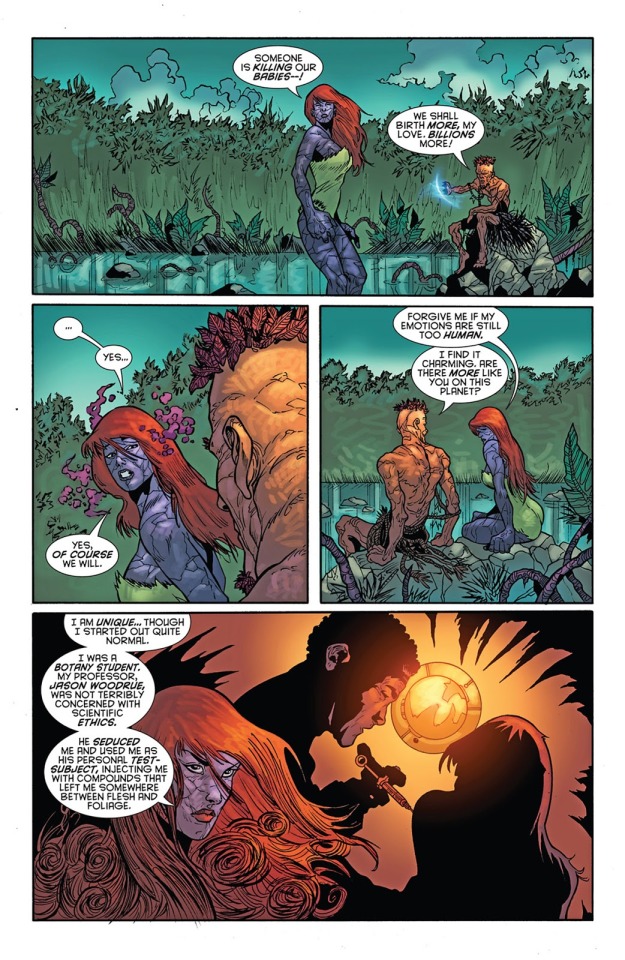
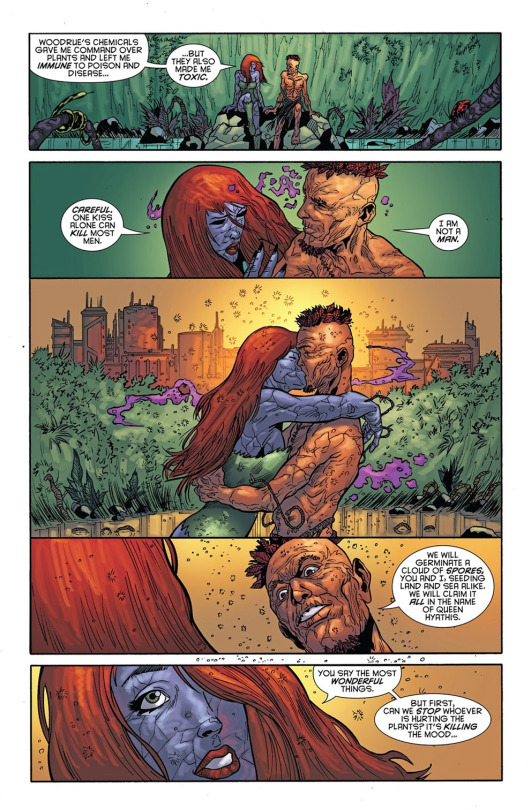

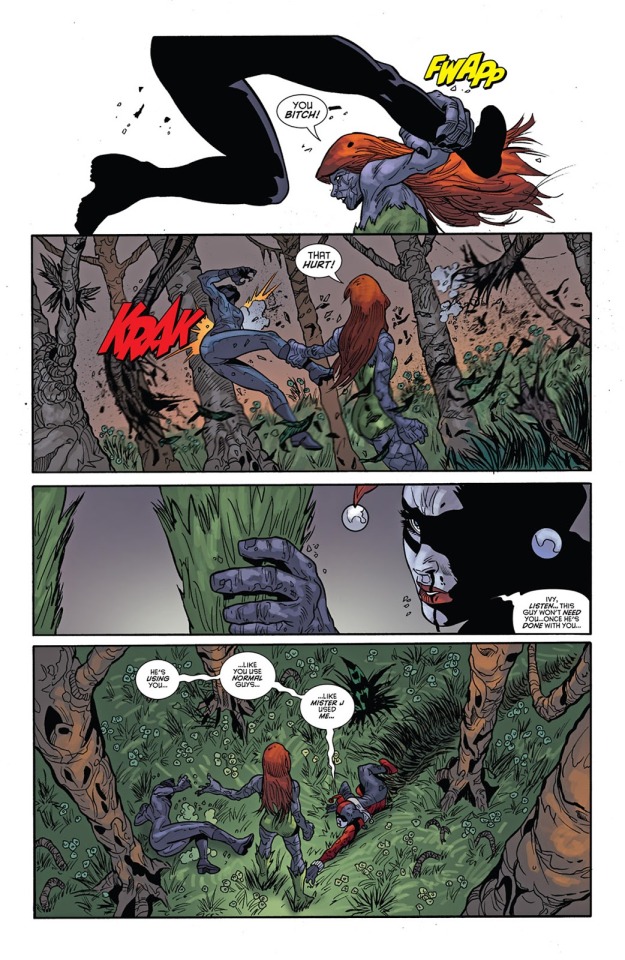
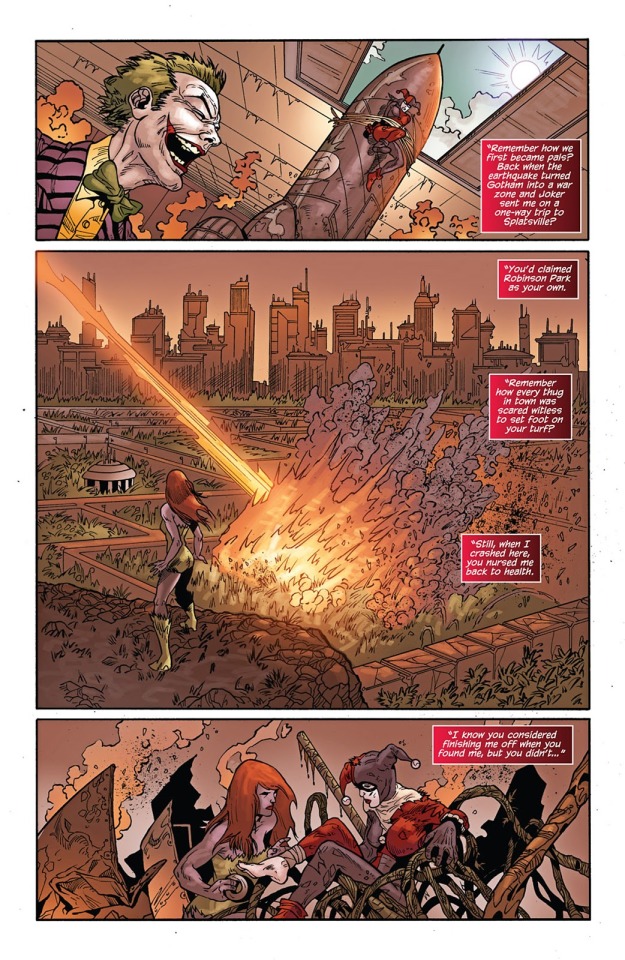
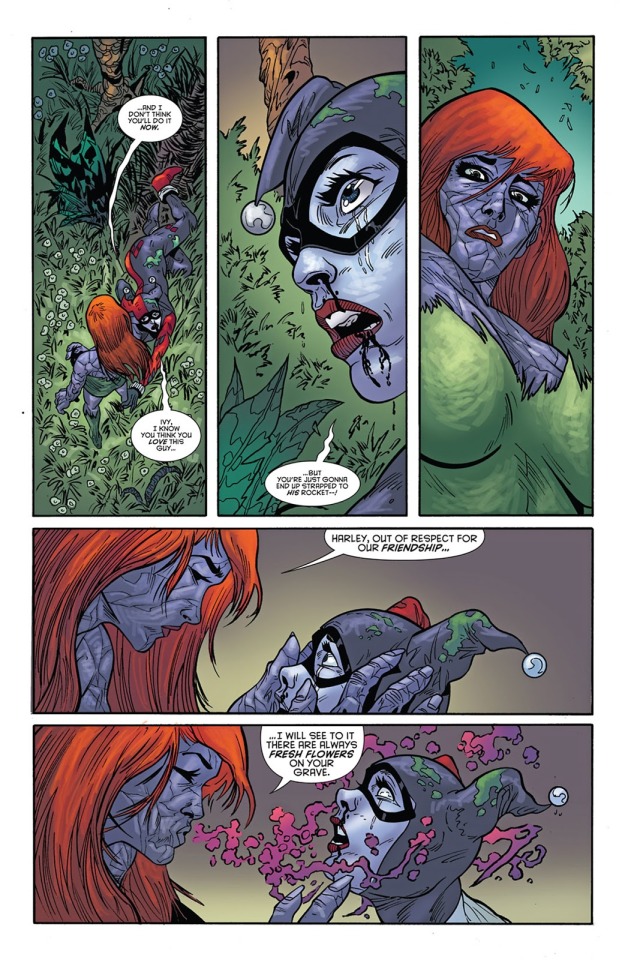
“Ivy, I know you think you love this guy... but you’re just gonna end up strapped to his rocket!”
She had to knock her out for the dude to trust her / not attack them anymore. But Harley got through to her by mentioning how they first met in the park when she saved her after Joker shot her off in a rocket.
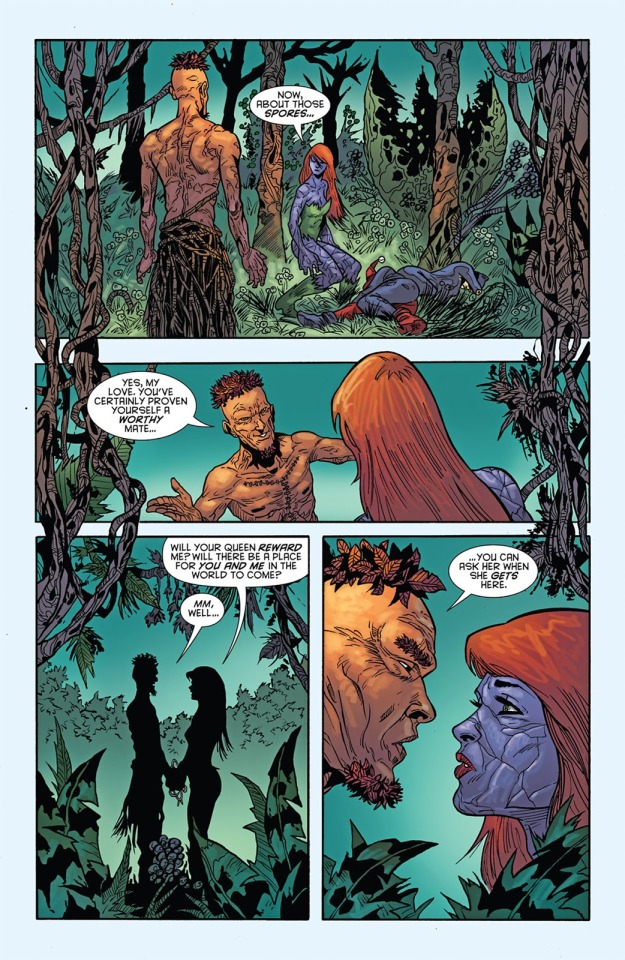
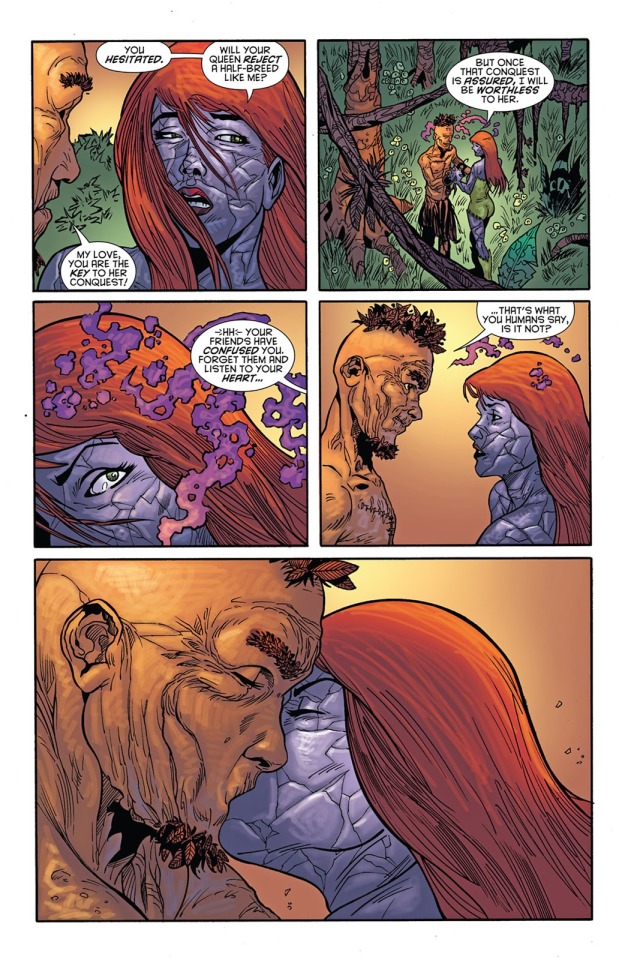
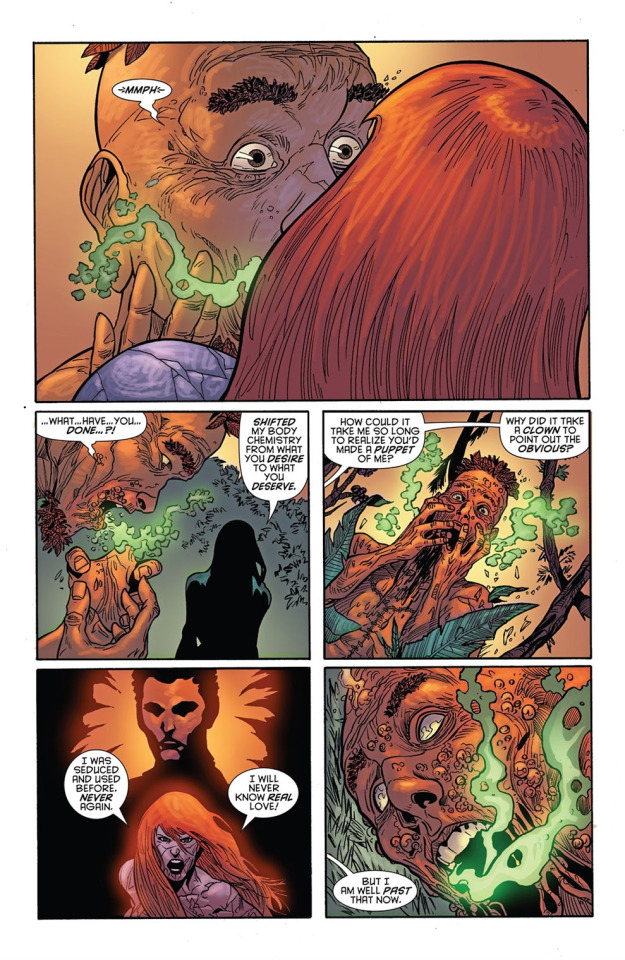
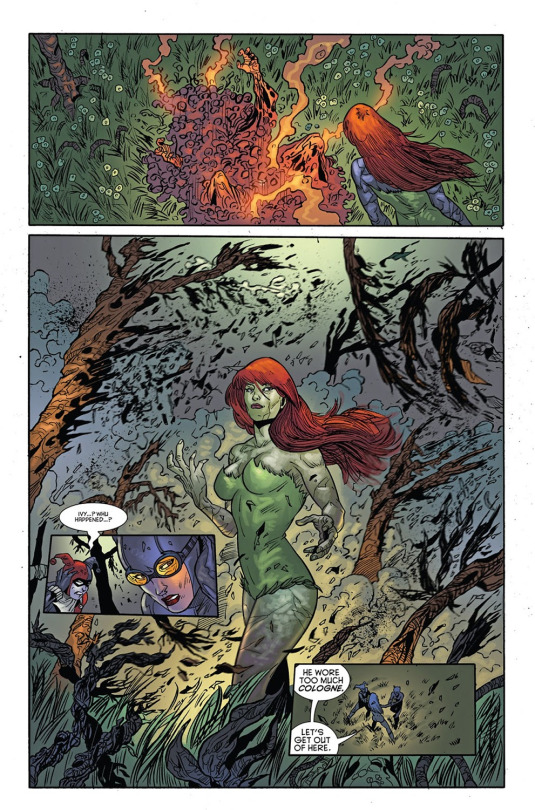
And Ivy is understandable turned off towards humans considering her origin and trauma around that.
She’s got a lot of trust issues.
But both of them work through their seperate traumas over the years because their affection for each other is stronger than the issues their trauma has given them.
-
and also, sometimes, they just have shit writers. that’s an issue overall in comic fandoms. Some writers just fucking suck at getting any of the characters right, let alone LGBT characters, who’re notoriously treated like garbage by DC.
#sorry if it came off a bit aggressive anon i don't mind ya asking <3#ops just annoy me SDJSKSK#tw abuse#tw clown boy#long post#♦️ asks ♦️#harley quinn#harleen quinzel#poison ivy#pamela isley#harlivy#gotham city sirens#me? rambling in detail about Harley? yup yup
65 notes
·
View notes
Text
5. sleep
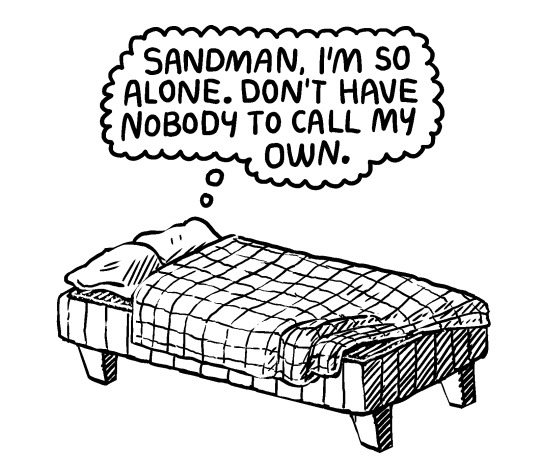
It hardly gets dark in the Swedish summers. Between dusk to dawn, you’ve got about an hour to fall asleep before the sun rises again. If you struggle to fall asleep that fast, you can invest in some good window blinds. Or you can do as I do and place one big pillow over your face. Then the birds start singing around three o’clock in the morning. You can practically hear the sounds of Edvard Grieg’s Morning Mood playing at around four o’clock in the morning. Around five o’clock in the morning, it is as bright as midday. Did you have a good time sleeping? Or did you pace around in a circle having one hell of a panic attack? I thought you took some of those sleeping pills you got prescribed, they should have helped you fall asleep… wait, you did take them? They didn’t work? Oh, they did work, you just felt your body falling asleep while your mind stayed awake? That sounds terrible, real terrible. Very well. It’s morning now. Want some coffee?
You could form a religion out of sleeping. Let’s have sermons where we fill a whole auditorium full of beds and have our congregates take a big collective nap. Sleep for the sleep god! Pillows for the pillow throne! Sleep is a billion-dollar industry, there’s a plethora of handy products you can buy that promise to send you on a luxury liner to dreamland. Pills, mattresses, dreamcatchers, whatever your snoozy heart desires. You can go to a proper doctor and they might help you, or you can settle for the placebo effect and go to some fraudulent quack, instead. He might make you swallow some pills that contain arsenic, but hey, arsenic is a naturally occurring element. It can’t be all that bad for you if it is natural. And you do want to sleep, don’t you? If you take this pill in your mouth and swallow it with a glass of water, I promise you, you will sleep for a very long time.
The esteemed former president of the United States of America, Donald Trump, claims that he only needs four to five hours of sleep every night. While Mr. Trump is well-known to be a paragon of honesty, I do doubt he’s telling the truth. No, I actually do believe him when says that he only gets about four or five hours of sleep each night, I just don’t believe him when he says that is all he needs. He doesn’t look very well-rested, does he? And Margaret Thatcher, the similarly adored former prime minister of the United Kingdom, claimed that she also only needed about four hours of sleep every night. Yes, while researching the sleeping habits of famous monsters, I’ve come to the conclusion that amongst powerful individuals, not getting enough sleep has become a proper badge of honour. The belief is that if you don’t get enough sleep, that must be because you are living such a vibrantly successful life, and are so career-driven, that you simply haven’t got enough time to sleep for the full eight hours. People who sleep for more than four hours are lazy liberals. Go-getters like Trump has got to be out there, working, making decisions, raping women, and showing daddy what a good boy he is. Sleep is for the weak. But maybe I am weak. I sure like sleeping.
It’s the cultural hangover our society has had since the 80’s. Back when the yuppies wearing jackets with obscenely padded shoulders would happily chuck down eight to ten espressos in one go while A Flock of Seagulls was playing on the radio encouraging everyone to go running. And to be fair to them, with the constant fear of the doomsday clock hitting midnight, they really had no reason to think that they’d survive the decade. The new millennia, it seemed, would have no cities, no nature, no humans, only radiated mutants scouring the rubble that remains of civilization for cans of preserved something edible. Self-destructive behaviour was in. It was fashionable. Doubt people got enough sleep back then, between snorting coke and wondering if the next pandemic that hits the night clubs would start killing as many straight folks as gay folks. Well, here we are in the new 20’s, and we’ve got a pandemic that does appear to kill people regardless of sexual orientation. Sure, the looming threat of nuclear obliteration has been lessened dramatically, but we’ve largely come to exchange that anxiety for the fear of total environmental collapse, instead. No wonder 80’s nostalgia is a big thing right now. History doesn't repeat itself, but It often rhymes, said Mark Twain (supposedly.) I wonder how much coke Mark Twain would snort if he lived in the 80’s.
I notice a palpable difference in my mood and mental state when I’ve been getting good amounts of sleep. Lack of sleep results in lack of clear thinking. Caffeine, though it is something I am chronically addicted to, does not help fix a sleep-deprived mind. There are no tricks of revolutionary “life hacks” one can employ to get out of sleeping. To recover from depression, one has to sleep. Sleep often and sleep well. I cannot understate the importance of being well-rested. You cannot process information if you are tired. I am reminded of my teenage years seeing friends of mine who’d stay up all night, then come into school shuffling like agonised zombies. They got so frustrated when the teachers reprimanded them for snoozing in class. Well, dummies, it is your fault for drinking several dozen cans of Red Bull every day! I know that sleep does not always come easy. I know the terror of insomnia. But, c’mon! At some point, you’ve got to realise that sleep is essential. Maybe most of your problems stem from the fact that you refuse to get enough of it? Here’s where the tough love comes in. If you wanna get better, kiddo, then listen to me. It’s bedtime. Yes, I know you’d rather stay up late playing monopoly with your friends, but I’m confiscating your dice and I’ll only give it back to you when you’ve gotten some good sleep. Okay? You hear me, missy? You listen to your daddy now, and go to bed. No ifs or buts about it, princess, I’ve made myself clear. I know what is best for you, and you know that I am right. I’m your daddy.
But what if I can’t seem to fall asleep? Normally, it takes a long time for me to fall asleep. It is not uncommon for me to stay awake for two hours, maybe more, before I finally begin to sleep. Fearing that I won’t fall asleep gives me anxiety. That anxiety keeps me awake. I turn my body. I try lying on my side. First my left side, then my right side. I then try to lie on my back. I’ve got a song stuck playing in my head. Not even the whole song, just a ten-second segment of it. It’s playing over and over. I’m worried about the future, will I ever find security, will I ever find a wife, will I get to grow old? I worry about death. I keep hearing the music playing, it’s grating. I rearrange the pillows, in hopes that will make me feel more comfortable. But no, I keep tossing and turning like a fish caught on land. I’m getting frustrated. If only I could shut off my brain. I’m constantly thinking. I turn to my side again, but now I notice I’ve moved arounds so much that now the bed has shifted away from its position next to the wall. There’s now a gap between the bed and the wall. I almost fall down that gap. I get up and I push the bed back against the wall. I lay down in bed. The song is still playing.
How am I ever going to become a successful businessman if I am wasting so many hours just trying to get to sleep? This is the time I should be spending on the phone, yelling at people and making inappropriate sexual comments to my female employees. That is what good executives do. I need to get my life in order. I need to exercise more. I should practice mindfulness. I should get a life coach, a personal trainer, a stylist, an accountant, an assistant, a trophy wife, and a mistress. I need people in my life to take care of me. It’s funny how rich people create the sort of environment around them where people will take care of all their needs, effectively infantilising them. These people don’t even get to decide how to dress themselves. They’ve got fancy apartments, but they don’t choose any of the furniture. They’ve got art on the walls that they don’t like, but the art looks expensive, and that is all that matters. They’ve got kids, but they don’t raise them. Their spouses are cheating on them, but in fairness, they are cheating on their spouses. They don’t really even know what their jobs entails, as they’ve gotten promoted so many times that they’ve ended up in a position that is totally outside their realm of expertise. But they’re so powerful that no-one is able to fire them over their pretty blatant incompetence. They’re successful. They’ve made it. But they still can’t sleep at night. They only manage to successfully fall asleep at night after swallowing a fistful of pills along with a swig of vodka.
It must be easy being a self-help guru. Well, what I mean to say is that all you really need is charisma, which is something you need to be born with. But you don’t need to do any actual studying, any real research, or any kind of soul-searching or deliberation. All you need is to state what is obvious. You go on stage in front of an anxious audience, mostly composed of middle-class salesmen and miscellaneous white collar ghosts. You smile, show off your eerily bright teeth, and they clap. You tell them to go take care of themselves, to eat more healthily, to take walks, or go swimming, and love their partners. You tell them to drink less, or maybe, if they feel like it, they could drink more. I am sure you could spin alcohol as a positive or a negative, depending on what crowd you’re talking to. Tell them to appreciate family. Tell them to appreciate others. Live, laugh, but most of all, love. Tell them to go clean their rooms. Tell them to remember that if they’re on an airplane that is about to crash land, they need to put their own oxygen mask on before they can help others put theirs on. If you don’t love yourself, how in the hell you gonna love somebody else? Now, go to bed!
You know all this stuff. Me telling you that you should sleep more doesn’t really help you. You know that you should sleep more. It’s not like as if you’re too dumb to realise that. And it’s not like as if you’re too dumb to realise that it is better to drink in moderation, and that you should smoke less weed. There are many small little things you can do to improve your life, to stop being a terminally unemployed slacker. It’s like your grandpa who tells you stories about life after the war when you could walk into the biggest building in town, slam your fist against the table and demand to be given a job and a house and a wife and a couple of kids, and that was all you needed to do. He can’t comprehend the fact that society doesn’t work like that, any more. Most people my generation have given up hope of ever owning a home, at least if they happen to live in the vicinity of a larger city. It seems that, no matter where you live, the cost of homes has risen to an impenetrable degree. It seems just as likely that you will be able to afford your very own genetically-engineered pet dragon before you will get to be a house-owner. It’s the fault of those damn boomers, why bother changing your ways, when the boomers are still in charge? Others may accuse you of wallowing in your own depression, but you are perfectly aware that this is exactly what you are doing. You are self-aware. But self-awareness on its own is not enough to motivate anyone. You still can’t see the point in doing anything constructive with your life. Life just feels so aimless. It’s easier to sit, smoke weed, and watch cartoons.
Pop psychology is problematic. To say the least. Take all those self-help gurus suffering from their messiah complexes and put them through the shredder. Don’t buy books thinking that they’ll offer you the kind of treatment you would get from an actual psychiatrist. I know that, depending on where you are in the world, treatment can get very expensive, but you’re not going to get better reading the book of some self-aggrandising narcissist’s collection of wishy-washy platitudes. Dr. Phil has done great evil pretending to be a therapist on the TV, and Jordan Peterson (despite having once been an esteemed scholar) has turned a generation of young internet-savvy zoomers into proto-fascists obsessed with the monogamy of lobsters. Pop psychology has become a guise for cult leaders to reap new followers. Getting treatment should not feel like joining a new religious movement. Maybe I’m just one of those annoying atheists, but I dare say, psychiatry works at its best when it's secular. You should not look at your psychiatrist as a prophet speaking to God. They’re just a doctor, and you need treatment.
I do not aspire to create a self-help blog. I do not promise that reading this blog will help you in any way. I would be overjoyed if someone came up to me and told me that I had inspired them to seek help. You may tell me that reading my words have made you feel less alone, knowing that others have gone through all these things that you are going through. When I felt at my worst, I remember reading the memoirs of people I admired who had similarly struggled in their lives, and I felt less alone. But none of those books pretended to exist principally to help others. Those books did help me, through the candid descriptions of struggles that I thought I was alone in experiencing. Knowing that some people had pulled through, managed to find a light at the end of the tunnel, it made me think I could one day be like them. The books didn’t seek to fix me, but they offered me a perspective that came to be very valuable later on, when I started going to therapy, and when I later started taking medication. Sometimes that is all you need. Not someone standing over you and telling you to go to bed, or to clean your room, or to stop drinking. You know all that, already. What you really need is the reassurance that things can indeed get better. Sleep will come.
14 notes
·
View notes
Text
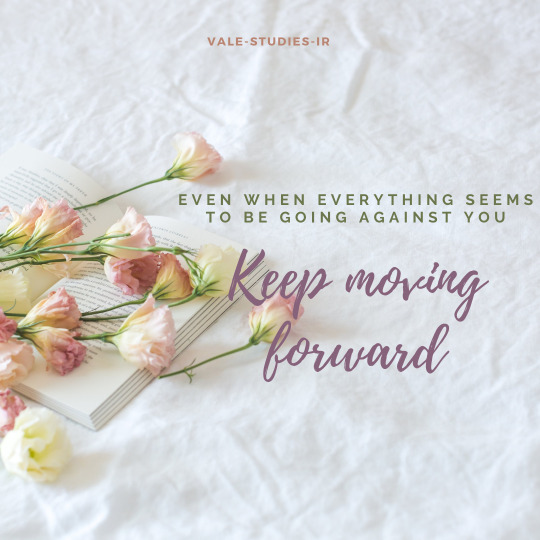
Hello lovely people!
It seems that life made me take a leave of absence from tumblr. Thanks to all of you who have continued to interact with my page! I'm sorry if I've missed any messages or questions in the time that I've been away. I'm back now and I'll continue to share my journey with you all...
~~~~~~~~~~~~~~~~~~~~~~~~~~~~~~~~~~~~~~~~~~~~~~~~~~~~~~~~~~~~~~
In order to be able to keep moving forward, I think it's important to accept the past and move on. Accept any of the difficulties that happened, and see them as moments you've gone through that have made you stronger. My way of accepting and turning over a new page will be through this post.
I haven't shared too much information about my studies and how they've been going. My studyblr was very new, and I was using it more as a means for motivation by seeing all the wonderful things people in the community were doing. Little by little, I started to make posts of my own.
So let me formally introduce myself and share my ongoing journey...
My name is Valentina, I go by Vale for short. I jumped from graduating from my BA in International Relations and Political Science in the Spring of 2018 to starting my PhD studies in International Relations the Fall semester of that same year. No break, very smart... I know. That's only just the beginning. I'm not sure how it works abroad, but here doctoral students usually go through most of their studies being funded by a graduate assistantship. This pays tuition and provides a stipend through working as a TA (graduate teaching assistant). Of course they vary across universities and departments. When I was applying to the PhD program, one of my professors advised me not to accept if I was not given funding. There are only a limited number of spots that are given to incoming students each year that will be accepted as a TA.
In March of 2018 I received notification that I was accepted into the PhD program in International Relations at my university, however, the department could not guarantee funding for me. This put me at a loss, and I spend months wondering where this was going and what I would do. Because I'm an immigrant in the US, though I've been living here practically my whole life, I didn't have too many options. My mobility is constrained.. my access to scholarships is constrained (even though I may qualify for them in terms of academics and merit, migration status trumps over all of it). I was lost, to say the least. My family can't afford to have paid for this program or a Master's program out of pocket, and I am not able to take out student loans even if I wanted to.
Regardless of this all, I still attended the incoming graduate student orientation; which surprised the outgoing graduate program director. She did not think I would show up, considering the whole funding predicament. She and the new GPD told me that they would try to find something for me. On the first day of class, I showed up, still not knowing what would become of this situation. Not knowing if I would actually get to start the semester or not. We are usually given a week to pay tuition - because of status, I am considered an international student so my tuition came out to nearly $10,000 for three courses. That day, out of nowhere, I was told that the dean of our school (School of International and Public Affairs) was looking for a graduate assistant for new projects that he wanted to work on. In the span of a few hours, I ended up interviewing with him, being told that they would let me know because there was another student they were considering, and later being called and told that I got the position. I was ecstatic. I called my parents in tears. This was actually happening; I was actually going to be able to start my PhD.
It all happened so fast. It all seemed so exciting. The dean seemed very enthusiastic and pleased that I would be working with him. Things eventually took a turn for the worst...
Transitioning into graduate school itself is extremely difficult. Many graduate students find themselves experiencing heightened stress and strain on their mental health. I did not give myself the space to transition into graduate school without the added stress of being a doctoral student, without the added expectations. On top of that, the dean had not had a graduate assistant before. This was new for him too. The expectations of me were blurred and my contract would only last for a year to be considered for possible renewal (the typical TA contract in my original department lasts 4 years), this led to disaster. I needed this position to continue to fund my studies, so I needed to make sure that I was on top of my work expectations. Because these expectations were unclear, the dean's secretary took advantage. It seems they were short staffed, and I was given administrative tasks that did not belong to me. I was made to come in to the office for strictly 20 hours a week. (Our contract states that we work up to 20 hours a week). If I was ever sick and missed a day, that would be added onto the hours for the next week. So if I missed a day where I was supposed to be in the office for 5 hours, I'd have to be there for 25 hours the following week. A breach in the contract, I know - but who was I, a lowly student, against the dean? This office (a shared space) was not a place where a person could focus on studying. There were students coming in and out, loud conversations occurring, and having to see if the actual student employee in charge of taking phone calls was at their desk - if not, I would have to man the phone. While I was doing administrative tasks for the dean's secretary, the dean was having me create themed presentations and CO-LECTURE with him. Me, a person who had been an undergraduate student only months earlier. I had to create these presentations from scratch and know all of the material. All of my focus had to be on this. My performance in my own classes and mental health declined quickly. I could not focus, I could not get my reading assignments done, I felt unprepared. I felt like a failure.
After a year, I realized that it was not worth to have my tuition paid for if I could not focus on my classes and was set up for failure. It took a lot, but ultimately I turned down the contract renewal. Here comes the fun part. My GPA dropped tremendously. I graduated Magna Cume Laude just a year before. I developed depression and didn't realize it; to the point where a friend practically made me go to counseling. The office manager at my actual department knew what I was going through. I had shared a lot of my experience with her. She advocated for me. Because of this, I was told that there was a student who had been awarded an assistantship for the incoming Fall 2019 semester, but had decided not to take it. The contract was going to be made for me instead, for not 4 but for 5 years since I had only come in with a BA degree. When they ran it through the associate dean's office... it was denied. My GPA was lower than the threshold. A LOT lower. I was told by the GPD - the same woman who had just started her position that said she would help me, the woman that had gone on maternity leave during that whole year after she started meaning she was not aware of the situation - that I should really take my studies more seriously. She received a very long email from me and apologized afterwards, to say the least. Nothing could be done.
I had no funding, only savings and ended up working Full Time in Fall of 2019 in order to try to pay for 1 course, that costed me a little over $3,000. Somehow, even though I strongly considered it, I managed not to drop out. By this time, the majority of the courses I had taken before had INs - incomplete grades. Two of them had automatically turned into Fs. Things were not okay.
I got a bit of a mental break during that Fall semester. I worked in a friendly environment. The office manager pulled some strings and let me work as an office assistant there... so I was still at my department, but working as staff. It was a little awkward. I'm eternally grateful to her, she became a close friend. And because of her, someone at another department got word that there was a graduate student who needed funding.
This office manager was good friends with a recently graduated phd student from our department who is now working for a different center in the university. Because she was part of my department, many of my current colleagues know her, and are good friends with her. We spoke, I rushed to get my GPA up to the 3.0 threshold and with the help of my professor's I was able to be awarded an assistantship with that center. I started in December of 2019.
Again, I was ecstatic. Things were looking up. When I went in for the first time, I immediately felt a huge difference. It was a smaller, more homey place; and a lovely environment to be in. The people there were sweet and caring. I've gotten along with the few professors I've had the chance of meeting and working with.
Where did it start going downhill? The professor that recommended me (graduate from my home department) continuously requested that I work with her. Her reason being that I got along better with her (something that I was not aware of). Because she considered herself as my friend, professional lines were horribly blurred. I found myself doing additional work for her as a "favor for a friend." She then started having us meet multiple times a week for hours - distracting from the time I needed to actually get work done. This center does not cap classes - I've had to grade for up to 400 students in one semester. The meetings she scheduled were incredibly unproductive, and I found myself having to take extra time to get the grading done. Again, my own studies were effected. The past academic year went on like this. I ended up assisting in creating a new course and new assignments from scratch.
Later I noticed that something was wrong. I was doing way more work than stipulated by my contract. She was giving me access to her courses that I was not assigned to grade for. Instead of assisting for one course in the semester (the one with the highest enrollment), I was assisting for three. This was constantly under the guise of 'friendship'. How was I supposed to reject my 'friend'? When I tried to draw professional boundaries, I was met with resistance.
My mental health declined again in the fall and I missed a few of her scheduled meetings (meetings which she said were NOT mandatory). Because of this, she decided to throw me under the bus with the director and making it seem as if I was not actually working - when I was addressing students' needs and getting grades in. This worsened in the Spring. With the help of my counselor I finally got the courage to communicate with her. Albeit through text, because she's the type of person that does not allow you to get a word in during conversation.
"On that note, there’s something I’ve wanted to talk about. I’ve been struggling with concentration and fatigue. This is something that I’ve been working on with my doctor to try to find solutions. I’ve noticed that being in Zoom meetings in general where there’s casual conversation makes it exceptionally difficult for me to focus on what I’m trying to get done. This has been problematic in the work zoom meetings. You probably have noticed I seem really quiet, that is because I’m trying my hardest to focus.
I need to be able to focus during the time I’m assigned to work as a GA. Otherwise, I must take more time to complete tasks that normally wouldn’t take up that long or just wait until the weekends to finish them. That is conflicting as I have set that time to work on class assignments and my own projects. So in the end I end up falling behind and not working well because my productivity levels are being affected."
She seemed to understand me and be supportive. Then I noticed coldness, and condescending passive aggressive texts from her part.
I realized that I could not do this any longer. I could not allow myself to continuously be taken advantage of. Both of the people I've worked for were aware of my vulnerable situation due to migration status. They both knew that it was not easy for me to pay for my studies through any other means. My studies depended on these people, and if they 'liked' me. They abused and absorbed my time to the extent that my studies suffered tremendously.
But I finally stood up for myself. I spoke with the director and she affirmed that my concerns were valid. Time and time again she assured me that my studies should always come first. She supported me. I will no longer be assigned to work with this person.
I finally feel heard.
~~~~~~~~~~~~~~~~~~~~~~~~~~~~~~~~~~~~~~~~~~~~~~~~~~~~~~~~~~~~~~
It's been 3 years since I started my program. A lot has happened in this time. I have a lot of catching up to do this summer if I want to stay on track and take my comprehensive exams by the end of the year. But someone finally heard me, acknowledged the wrongdoings and helped me.
Don't let people walk over you and take advantage of you. I'm learning this the hard way.
Speak your truth.
#my story#my phd story#experiences#struggles#growth#don't give up#don't silence yourself#share your story#speak your truth#long post#studyblr#phdblr#phd studyblr#phd student#gradblr#grad student#stand up for yourself#keep moving forward
24 notes
·
View notes
Text
psycholonials, huh?
man this is a good story anyway here's a way too long self-indulgent note-to-self that I didn't want to do on my typewriter.
I haven't gone and checked if there's more to it yet, I don't think there will be and I'm pretty happy with the way this has concluded so I can do a Thoughts On Post.
First up I never understand people who keep trying to dunk on Hussie. Nothing you can do to him is worse than what he has done to himself, which is to say being popular on the internet.
(Oh huh there's something in the Load Save menu, brb)
Oh okay that changes that segment a bit. There's a postscript. I'll put spoilers and whatever under a cut for the most part.
This game ping-pongs very rapidly between the very big and the very small, very elegantly and effectively. I think a lot of people don't give Hussie credit for writing a story that managed to hold an audience as large as it did for as long as it did, Homestuck is very easy to dismiss as dumb fandom bullshit, but it's an extremely earnest piece of work if you think about the author instead of the characters.
I mentioned that I expected the "locked choices" thing to be a bait-and-switch, which of course panned out. Nothing presented that obviously in a story like this would ever be straightforward. I hadn't hit on the "Z is the narrator" bit but I wasn't really staying on top of game lore for this one.
The final arc touches a lot of places that I think about frequently, hopefully because everyone thinks about them a lot and not because I have some kind of Hussie brainworm.
There's a brief segment about countries and what it means to Be From One and why and how people Go To Another One and generally about what you are responsible for, which sort of aligns with a thing I wrote a while ago after I learned about the Leningrad Seed Potatoes. I think about this a lot! Especially since it seems ever more inevitable that if I want to use my abilities to their fullest I'll have to go away. There's no silicon foundries around here.
The other discussion goes all over, from large-scale geopolitics down to very intimate personal problems. I appreciate that, stories that try to stay at grand scale 100% of the time lose a lot of the value you can get by bringing the side effects of the grand scale down to human size.
It's absolutely clear that some of this is autobiographical. "Started an extremely large community that has an outsized influence on all sorts of things that eventually causes serious problems for you and those around you" I wonder what that could be about. Hussie is basically the joker of fandom after 20+ years of doing this and we really do live in a society.
There's the whole bit about how the whole situation basically vanishes when you log off, which, yeah. Trump's twitter got deleted and I think I maybe see his name once a week these days, rather than the four times a day I heard people say it out loud just last year. Many Big Things are only Big Things when you're embedded in the community, and I always think about this when I see a twitter trend with "12 million people posting about this!!!!!!!" which is an utterly trivial number of people in a world of eight billion. Black Lives Matters is easily one of the biggest things on Social Media at the moment and they just had a huge win but according to my twitter feed there's 1.1 million tweets about that cop and that's... nothing. A fraction of a fraction. The Biggest Twitter Account has like 100 million followers. A nothingburger, one in a hundred people.
And a pretty good ending. I had a bit here but I saw the epilogue which leads well into...
The epilogue is well timed and well placed: like if undertale had more subtlety. It says very little that's new, but if you maybe didn't catch something or didn't think it was emphasized enough, here it is. There's no doubt someone out there who did what I almost did, just quit the game and delete it without even trying to see if there was an alternate path. I had already assumed there wasn't, it just wouldn't fit with the story. Deleting the save files is a good touch, and unlike some other games, I trust that there's nothing hidden in a replay that this is egging you to try. Psycholonials was a very honest game for the rest of its run. I'm not about to distrust what it says now.
I wrote another hideously unfocused emotionpost a while ago about Evangelion and The Importance Of Trusting Yourself To Be Valid, which is most of what I took away from Evangelion at the time, and I stand by a lot of that. This aligns in some ways, in that the importance of being recognized by others can't be the only thing you base yourself around, but it can help.
Like, Toby Fox was able to make Undertale the way it was because he had a sound understanding of Fandom from another 20 years of Being Online, of which like 10 of them were with Homestuck. Hussie has seen a lot of shit happen with his work. I think this is partially as /clear/ as it is because ambiguity (PEACHY) is the route to madness when dealing with audiences this big.
I don't know what happens next for Hussie, from here. It sounds almost like an announcement of retirement. I don't really care, but I will say that I unironically enjoyed it while it lasted.
24 notes
·
View notes
Text
The ‘Fierce Urgency of Now’ - The Paris Agreement and US Presidential Leaders on Climate Change
President Joe Biden has successfully reentered the Unites States into the Paris Agreement from 2015. According to the principle “the best time to cut emissions was decades ago; the second-best time is today,” did Biden sign the Agreement on his very first day in office, which was on January 20, 2021. The accord went into effect after some legal steps on February 19, 2021, representing a milestone in combatting climate change.


But wait a minute: Why did he have to RE-enter the Agreement in the first place?
His predecessor, former President Donald Trump did not so much believe in climate change, or at least he did not see the ‘fierce urgency of now’. Trump’s determination as the President of the United States with the largest economy in the world was to ��Make America Great Again’ according to the principle ‘America First.’ Being convinced that the Paris Agreement on Climate Action, as Trump puts it, “handicaps the United States economy in order to win praise from the very foreign capitals and global activists that have long sought to gain wealth at (America’s) expense” he sought to leave the Agreement. Furthermore, in his rage about other countries not putting America first, he was convinced that “it is time to put Youngstown, Ohio, Detroit, Michigan, and Pittsburgh, Pennsylvania –along with many, many other locations within our great country– before Paris, France.” Because well, it is time to make America great again.
However, he did not leave the Agreement right away. No, he was willing to negotiate to see if he could make a deal that’s fair. “And if we can, that’s great. And if we can’t, that’s fine.” He was not able to negotiate a deal that in his eyes would have been a fair deal and thus he decided to leave the Paris Agreement in 2017, neglecting the threat of global warming, because hey that’s fine…

The United States, however, did not officially leave the Paris Agreement before November 4, 2020. This is because former President Barack Obama, who signed the United States into the Agreement in the first place, and his negotiators took precautions in order to ensure that it would take some time for the US to get out of the Agreement if there was a change in leadership. This was important because Obama had already been in his second term of office and a change in leadership was approaching, but also because Obama used his executive authority to sign the Paris Agreement, knowing that not everyone would be happy with the deal, after the US, despite the Clinton administration’s efforts to convince the Senate, never ratified the Kyoto Protocol of 1997, another accord in which developed countries wanted to tackle climate change while reducing emissions.

As part of these precautions, it was agreed that no member state could leave the Agreement within the first three years after ratification. Further, a twelve-months’ notice needs to be given before leaving. And so Trump was not able to give this 12-months’ notice before November 4, 2019.
Trump’s nation-first mindset does remind one of what is happening around the world at this very moment. Countries around the world are trying to protect their people from the covid-19 pandemic, from the coronavirus, demonstrating a strong nation-first mindset as well. So let us shortly look at how well this nation-first mindset in fighting the crisis is working in order to consider if this is the right approach for climate action as well.
The pandemic is affecting people all around the world and one would think that such a shared global threat would mobilize and generate global solidarity and cooperation. But instead of uniting people, the pandemic enforced nation-first thinking. And this approach, sadly and gladly, has had some success. By putting up barriers, isolating and looking inwards, infection rates could be lowered, at least within the countries that are taking such measurements.
However, this approach widens the gap and inequalities between developed and developing countries, between the global North and South. Developing countries do not have the means to fight the pandemic on their own, they need financial, technological, and scientific backing, especially to produce or distribute vaccines. UN Secretary-General Antonio Guterres called for global ceasefire so that vaccines could be distributed into areas of conflict.

Attempts such like this one and other attempts to help out poorer regions with vaccines against the virus have failed. Countries, especially developed countries, prefer to hoard vaccines for their own population, risking that they expire instead of providing these vaccines to poorer, developing countries or regions. This nation-first mindset, especially demonstrated by developed countries, has led to insufficient global vaccination and is a contributing factor of why the pandemic is still not combatted. Because in order to fight the virus, global solidarity and cooperation needs to be shown.
You might now think, but there has been global cooperation, yes, but obviously not enough, because otherwise the pandemic would not still dictate our lives. Scientists around the world have worked on developing a vaccine against the virus and they have been successful due to their cooperation and not due to nation-first thinking. According to the International Monetary Fund, IMF, it is “thanks to spectacular collaboration among scientists, generous funding by governments, and private sector ingenuity” that a vaccine was able to be created much faster than expected. There won’t ever be a vaccine that can protect us from global warming, but what we can learn from the pandemic is, that when fighting global warming, we need cooperation on all levels, we need solidarity, we need to prioritize the climate crisis and we need governmental funding. What we do not need is nation-first thinking.

Just like the pandemic, global warming is not just economically devastating, but also more “likely to disproportionately impact the poor and deepen existing inequalities,” according to IMF reports. But the pandemic has shown us more than just this. It has also shown us that no nation can be safe unless all relevant players act together. There are no positive aspects of a nation-first thinking when it comes to global warming. Global warming needs global attention. Zach Cohen explained that “the rapid global spread of covid-19 has demonstrated that no matter how successful America is at fighting this pandemic here at home, we will never stop this threat unless we’re also fighting it around the world.” And this can be equally applied to global warming. All nations need to work together to achieve a global impact because as Obama said: “no nation, not even one as powerful as ours, can solve this challenge alone. All of us have to solve it together.”
The United States have a particular responsibility to solve this global challenge because they are the second largest carbon emitters after China, causing at least 15 percent of carbon dioxide.

And this is why being a member of the Paris Agreement is so important. The Agreement makes all members commit to reducing their carbon emissions and to work together towards this shared goal of combatting global warming by bringing global emissions to net zero.

Yes, due to the pandemic and stay-at-home policies as well as changed habits and consumption, there has been a decline in carbon emissions, according to the Pew Research Center. However, it is not clear if this decline is lasting or just temporarily. “Covid-19 resulted in a 7 percent drop in global emissions in 2020 because all economies shut down; to keep warming below 1.5˚ C, we would have to keep cutting emissions by an additional 7 percent every year for the next decade.” And thus, it was so important that the Unites States recommits to the Agreement because even though other nations are stepping up targets to reduce emissions and no nation followed the US’s withdrawal, the world will certainly struggle to meet its goals without the US’s cooperation and participation. Biden stated that he acknowledges that Trump’s decision has put the entire world behind achieving their net zero goal and he pledges to do better and to step up the game.
How does and can Biden step up the game? Let’s have a look at what the Paris Agreement has been and is about.

The Paris Agreement, which has been agreed on December 12, 2015, and which has come into effect November 4, 2016, has been a historic turning point for global climate action because it united 195 nations, almost all the world’s nations, in a single agreement on cutting greenhouse gas emissions which are causing global warming. Obama acknowledged the threat of climate change, stating: “we’re the first generation to feel the impact of climate change, we’re the last generation that can do something about it,” and thus he pledged to cut emissions “between 26 percent and 28 percent below 2005 levels by 2025” with a further 80 percent reduction by 2050. Obama also committed to providing three billion dollars to the Green Climate Fund to help developing countries achieve similar goals. When Trump withdrew, he also stopped providing the needed money. Only one billion dollars have been paid so far. However, the United States’ withdrawal did not lead to a complete stillstand in climate action. Several initiatives such as US Climate Alliance, America’s Pledge, We Are Still In, and American Cities Climate Challenge, continued to work towards the goals pledged by Obama. But as demonstrated before, governmental backing is key to tackling systemic crises. Nonetheless these initiatives and efforts have been of great value.

The Biden administration ambitiously pledged to “achieve an economy-wide target of reducing its net greenhouse gas emissions by 50-52 percent below 2005 levels in 2030.” And net-zero emissions till 2050. However, after the very chaotic and inconsistent treatment of the topic of climate action by the US government, President Biden and his administration need to reestablish their trustworthiness before being able to regain their leadership role in climate action. Therefore, Biden took a leading role at the climate summit in Glasgow, Scotland last November, which has been postponed for a year due to the pandemic. Biden wants to assume the leading role while leading by example in order to be able to put pressure on other countries, especially China, the current biggest greenhouse gas emitter with more than 28 percent.
President Biden is not just tackling climate change on an international basis, but also prioritizes climate action at home. Biden and his Vice-President Kamala Harris, stress the urgency of addressing climate change by making it one of four major crises which they will focus on during their presidency. The other three crises are the ongoing covid crises, the economy and racial injustices.

Obama has referred to this urgency in the past as well: “The one thing I was very certain of coming into office, was that we had to feel what Dr. King called, ‘The fierce urgency of now.’ That each year that passed, the problem got worse, and it was going to be harder and harder to roll back, or at least suspend the rise in temperatures that affect everything, from increases in natural disasters, to droughts that result in migration patterns, changes that in turn can lead to conflicts.”
Biden and Harris refer to exactly this as well when communicating the urgency of climate action to the American citizens. They refer to the more frequent and more severe extreme weather events which the United States have been experiencing, especially in 2021. “Climate change repeatedly proved its deadly power in 2021, when the planet was hit by a series of extreme weather events, including record-breaking heat-waves, droughts, wildfires and floods. Experts roundly agreed these natural disasters were more severe as a result of the world warming up.” According to recent polls the 18 extreme weather events have led to an increase in the perceived connection between these natural catastrophes and human-caused climate change. Heat waves, droughts, wildfires, floods etc. have caused many deaths and damage of more than 100 billion US dollars. The extreme events impact human safety, infrastructure, agriculture, water quantity and quality, and natural ecosystems. Furthermore, heat waves, for example, lead to an increased need and cost in air conditioning, droughts damage crops and storms and flooding can damage property, cause deaths, and displace people. One of the extreme examples is Hurricane Ida, which caused 95 deaths and 49 billion dollars damage when causing severe damage moving from New Orleans to New York.

By trying to make climate change feel more immediate, urgent, and personal, Biden and his administration make use of what we learned from the pandemic. When something feels immediate and personal people are much more likely to act and change their habits than when something feels far away and impersonal. “Combatting the coronavirus pandemic required each one of us to do our part, change our habits and daily routines and make personal sacrifices,” can we do this for our climate as well, for our Earth’s health?

Climate activist Greta Thunberg wanted elected leaders to acknowledge climate change, just like the pandemic, as a crisis: “So what we need now is to raise awareness and to create public opinion to treat the crisis like a crisis. Because if people are not aware of the crisis that we face, of course they wouldn’t put pressure on the elected leaders.” And maybe there is light at the end of the tunnel because when Biden called global warming a crisis, this was a step into the right direction. Maybe Biden can lead the United States and the world into a healthier and more equal future, fighting covid-19 while supporting “climate justice and a clean energy economy.”

What I would like you to take away from this post, is that neither the covid-crisis nor the climate crisis will be solved anytime soon if not each one of us does their part. It can be very useful to look at both crises because our health and our environment are intertwined. As we can all play our part individually, it is also important to keep an eye on governments and therewith on the global level. As has been shown, global warming, just as the pandemic, is a global challenge which needs a global solution. I hope to have demonstrated that therefore being part of the Paris Agreement on climate action is so important. “The COVID-19 crisis will not be re-solved until all countries bring the pandemic under control through widespread vaccination, and the climate crisis will not be solved until all emitters swing into action, bringing global emissions to net zero,” which is what the Agreement is targeting.
Let us listen to what science is telling us: global warming is happening if we don’t act now, it will be irreversible. Let us not let happening what happened under the Trump administration, taking the entire world backward by denying climate change. Let us all lead by example on an individual and global level.
We can’t risk not being heard. We need to listen and act just as our leaders need to listen and act. We need global cooperation and solidarity.
Let us take climate action. Let us help Biden to do better. Let us all be part of the solution.

5 notes
·
View notes
Text
Overruled - Letting fun and story win over rules

Hullo, Gentle Readers. This week’s Question from a Denizen comes from hollowontheinside11. They ask, “ Hello! I was thinking of making a character that was on a murder plot gone wrong. Where they turn themselves, say into a fully grown dragon. What spell would have to be cast? Note: that they can only turn themselves back.”
Well, the short answer I gave hollow is a simple one. There is no such spell. No spell in D&D will let a character turn themselves into a dragon without others being able to turn them back through dispel magic and such. Even True Polymorph in its permanent form can be dispelled. I suppose a Wish could potentially do it, but a clever player could argue for a Dispel Magic to remove the Wish, or another Wish to undo it. So did I tell hollow they shouldn’t run this plot?
Hell no! I think it sounds great!
This question reminded me of an event in my own campaign, when the ritual to awaken the Tarrasque was being done. One of my players tried to cast Dispel Magic on the ritual, and I had to gently let them down that, just because something was magical, it didn’t mean it could be dispelled. “This is more like fulfilling the terms of a prophecy than casting a spell.”
Similarly, one of the PCs’ arch-villains put them in a terrible situation recently where they sped up time during a battle in the Abyss. Days were going by with the rounds, and, when all was said and done, and the source was defeated, they realized they’d lost over a week. This was awful for them, as they’re working to defeat the Tarrasque before it reaches towns that are important to them. This has severely ratcheted the tension up in the game, which is exactly why I did it.
Are there rules for those things in D&D? Absolutely not. Do I encourage such things anyway. Of course! Deep magic feels like it lies at the roots of D&D.
D&D and other tabletop RPGs are full of things that can’t be easily duplicated by a player character or monster’s capabilities. Many monsters in D&D are thought to be the results of a mad wizard’s experiments (owlbears, for example). Is there a spell in D&D that makes hybrid monsters? There is not. But we still accept that owlbears were created by D&D’s nutty professors. And we don’t try to dispel magic on owlbears to cease their existence.
Sometimes, you have to let fun and story trump the rules of an RPG. If there were nothing but rote rules that always produced the same effects, we would just be playing a computer game. Instead, we have a game where a DM can say, “That’s not something the rules cover, but it sounds awesome, so let’s go with it.” There are no rules in D&D for stampeding cattle through a bandit encampment, but my DM was game when my rogue decided to soften up the encounter we were about to have. There’s no rule for the Death Curse that plagues people in Tomb of Annihilation, except that the writers (the DM) added it to the module because it makes the stakes higher and the module scarier. There are no rules for a ritual to awaken the Tarrasque, but it’s still rampaging through my campaign world nonetheless.
So what story reasons could we use for such a situation as hollow describes? Well, perhaps the Dragon-To-Be (DTB) has come into possession of some ancient and powerful scroll of a magic no longer known. Perhaps a surge of wild magic causes a Polymorph spell to range far past its normal boundaries. Perhaps a wicked god does it as a boon to DTB as a loyal follower. Perhaps its an ancient ritual anyone can do under the perfect circumstances, which only come about once every thousand years, and DTB waited for just the right moment to do it. Perhaps it becomes permanent in a year and a day, unless someone fulfills some crazy criteria. Finding those criteria and enacting them within a year and a day sounds like the basis for a heck of a campaign, as the DTB slowly expands its power, subjugating nations, making the heroes’ lives increasingly difficult.
I recommend two things in a situation like this. You need to make the cause clear to the PCs, and you need to give them the opportunity to figure out how to undo it. Making the cause clear to the PCs will go a long way towards having them accept that something happened so far outside of the scope of the rules. Ancient rituals, wild magic, and gods are just three reasons why things can happen outside the scope of the rules. If your players trust you, they’ll let you get away with a lot. My players know I’m there to tell a great story with them, so they give me a lot of leeway.
Giving the PCs an opportunity to figure out how to undo something is important, too. If you just shrug and say, “That’s it; nothing to be done,” then the PCs feel like they have no agency and no hope. But if you let them find a way to win, even if they might still fail, they at least feel like they have a path forward. Shortly after the Tarrasque was awoken, we RPed a sort of Council of Elrond session, where various NPCs gathered with the PCs to figure out what was to be done. The PCs asked a lot of questions, some of which were answered and some of which were deferred to possible quests to get answered. NPCs suggested a number of options for making war against the Tarrasque, and those options were weighed. Ultimately, the PCs made the decisions about what they were going to do, and various NPC allies agreed to take on some other of the options. My players felt there was a way forward, and things were dire but not hopeless. They are rushing around, fetching various items and wrapping up various personal plots, roller-coastering towards the end of the campaign, when they plan to confront the Worldbreaker once and for all.
hollow, I hope all of this has given you the answers you need to tell your story boldly. Remember that, when it doubt, just shrug and say, “Magic.” And until next time, may all your rolls be 20s.
57 notes
·
View notes
Text

Dictatorship vs Theocracy: The Lesser of Two Evils?
August 11th, 2021 اغسطس ١١
If you were reading this post in Arabic from me as an Egyptian journalist, or even in English, and the police found it...in the best case scenario I'm brought down to the station, "scared straight" and let off with a promise never to criticize the govt again. But I’ve heard of lots of scenarios anecdotally, as recently as 2 years ago, where activists just disappear. Want to know what life would have looked like in a dystopian alternate universe 30 years after Trump succeeded in his coup and never left? That said, the way the situation is viewed by politically moderate Egyptians and Americans -if such a thing still exists- is so very different, and that’s the real point of this post.
After the Egyptian revolution in 2011, when Mubarak left, from what I’ve read and heard, there were 3 main paths forward. The most exciting was Egyptian civil society fielding an organized enough field of candidates to become viable as a governing power. The second was the Muslim Brotherhood candidates, an ultra-religious Salafism-influenced theocratic organization. The third was an interim military govt. That thin strand of spiderweb hope for civil society fell apart, and someone who is much more versed in Egyptian history and culture than me no doubt has an explanation. The first real election after the revolution saw Morsi from the Muslim Brotherhood elected, and a scant year after the military coup that brought Sisi to power, where he remains almost 10 years later.
Okay, you could have read that from a history article. Here are stories from friends on the ground, though; I know at least 2 Egyptians in my circle that would have FOR sure voted for Biden over Trump, but have come to look positively at Sisi. One of them was active in student protests AGAINST Sisi during the revolution; he still has the scars where one of Sisi’s military police shot him in the face during a demonstration. That said, he’s terrified of what a theocratic govt. under the Muslim Brotherhood might look like. As a queer Egyptian, it’s already a risk to have liaisons with men, and you can still be arrested, but that’s way ahead of the Salafi death penalty. He also carries so much trauma from the year after the revolution without any functioning govt -standing outside his house during looting with a sword because civilians don’t have guns and all the police ran away- that to have a strong govt feels like a relief. Of course, of course he hates the lack of free press, but puts it way higher up Maslow’s hierarchy of Societal Needs than most of us Americans would.
The other Egyptian in my circle who supports Sisi sees the Muslim Brotherhood as an existential threat to Egypt because their primary loyalty is to a pan-African Islamic caliphate and not the state of Egypt. She points to a very controversial Ethipoian dam project at the mouth of the Nile that was green lighted during Morsi’s short reign as Muslim Brotherhood leader of Egypt. Ethiopia is building it, and Egyptians are furious because the Nile flows through Egypt after Ethiopia. She also -and I see strong echoes of my Chinese friends thinking- points to Sisi’s anti-poverty programs as strong and necessary authoritarian measures. Sisi has starting razing unplanned buildings and slums, including in my city of Alexandria, and forcing residents to move to new apt. buildings in different parts of the city. They cannot sell the new apartments for 20 years. Of course many residents are delighted at the new digs; TV this summer is oozing with govt propaganda videos showing sad Egyptians with sad music in slums and happy Egyptians with happy music in new flats. And…residents don’t have a choice to move. In Alexandria that land under the slums has been sold to a Saudi conglomerate to develop a water park.
For me it’s helpful to think of gov’t philosophy in different countries as reflecting family structures; in Egypt, the man is the undisputed head of the household, legally and socially. We cringe at paternalism of Europeans towards their colonies now, and I don’t have the full perspective to say how similar or different it is from intra-national paternalism like this, but there’s definitely a relation.
A final note, about the economy under Sisi. If you suspected a military dictator might not prioritize the lower and middle classes, you’d be right. (You could argue the housing program I mention above does mean he’s prioritizing them, but maybe wait to reserve judgement). Simply put, the army has taken over the economy. I’d say it follows the playbook of nationalization that other socialist or communist govt has followed, but in so many sectors, it seems like the army is just undercutting local businesses. All the army brass is involved in running disparate businesses; telecom, mango export, apartment construction. The army companies don’t pay taxes as a national subsidiary like other Egyptian private companies, so they can undercut most prices. I’m surprised it hasn’t produced a seething mass of disgruntled Egyptian businesspeople ready to fund another revolution, which makes me think there must be some sweetheart deals in the back room.
And what has Sisi done about the pollution, overcrowding and generally lower living standards in a city like Cairo? Invested in improving local infrastructure, pollution mitigation technology/funding? Nope. He’s building new cities for upper-middle and upper class Egyptians to move to. Not neighborhoods. Cities, in the desert, like a pharaoh of old. Look up “New Cairo” or “New Alamein.” I’ve been there, it’s spooky, like a fancy mall that goes on forever. Big middle finger to the broke, un-educated masses staying behind. I guess you could make an argument for the benefits of lessening over-crowding. Maybe Sisi has a grand plan to swoop in once the old cities empty out a bit and work some magic. But I don’t think so.
The Muslim Brotherhood might have done more to improve at least the economic conditions of Egypt’s more vulnerable citizens. I don’t think they would have built the separate cities, or involved the army as a business octopus in every lucrative industry. But then, the very little social freedom Egyptian women enjoy would be cut back another 40 years, maybe to full body niqabs and mandatory accompaniment by a male family member. Public displays of affection of any kind, even between opposite sex couples, banned in any sort of public space. I want to be clear that the Muslim Brotherhood represents one far end of the Islamic spectrum in the same way that ultra-orthodox Zionist Judaism represents one far end of the Jewish spectrum, one that has little to no relation to the way I understand and practice Judaism. I’ve had many discussions with friends here -who are simulateously progressive feminists and devout Muslims- on the 5 pillars of Islam, the way they support a reflective and fulfilled life, and the way more extreme interpretations twist the original intention.
To bring it back around, Egypt is now a military dictatorship, and has both repressed dissent and consolidated economic power so effectively I don’t see that changing anytime soon. The world is such a very complicated and Machiavellian place. From the American perspective with a free press, democratic-ish elections, social freedom, a stable govt and a booming economy, of course Sisi’s dictatorship seems irredeemably, one sidedly terrible. But what if you had to choose just 2 or 3 of those 5 things? Of course us dreamers and activists want to push for all of them, and we should, but what if the only organized factions capable of governing brought only some of those benefits to the table. What would you choose?
4 notes
·
View notes
Text
Once Again, Greg Abbott Is A Lethal Cretinous Scumbag
Letters From An American
Heather Cox Richardson Jun 20
Yesterday, Texas Governor Greg Abbott, a Republican, made good on his threat to defund the legislature after Democrats walked out on May 30 in order to deny the Republicans the number of people they needed to hold a vote on a bill that dramatically reworked Texas elections.
In part, Abbott is likely trying to distract Texans from yet another crisis in the state’s independent energy grid, operated by the Electric Reliability Council of Texas (ERCOT). Four months ago, the electric grid failed during a cold wave, leaving more than 3 million people without electricity or heat. More than 100 people died. Now, mechanical failures during a heat wave have pushed the state to the verge of blackouts and have prompted ERCOT to ask people to turn their AC to higher temperatures, turn off their lights, and avoid using appliances that take a lot of electricity.
To make matters worse, yesterday the Public Utility Commission of Texas lifted a moratorium on electricity disconnections put in place on private utilities because of the pandemic and extended because of the February storm. It is not clear how many people will be affected by this change, but two public utilities in Austin and San Antonio say that in late May a quarter of a million households owed an average of $600 on past-due bills.
So it makes sense for Abbott—who has been throwing himself behind Trump-like causes anyway these days—to stir up headlines by defunding the legislature and blaming Democrats, even though, once the election bill failed, a number of Republicans told political journalist Judd Legum, who writes at Popular Information, that they did not know where some of the measures in it had come from and did not like them. For example, one lawmaker said that the provision to enable Texas judges to declare an election “void” at their discretion if someone charged that it had been fraudulent, “would be horrendous policy.” (That section of the bill was actually titled “OVERTURNING ELECTIONS.”) In any case, Abbott’s gesture will hit not legislators, but staffers.
But Abbott’s attack on voting rights in Texas identifies the crux of the current crisis in American democracy. For thirty years, Republicans have strengthened their hand in elections not by adjusting their message to win more voters but by gaming the system: suppressing the vote and gerrymandering.
When voters put the Democrats in charge of the federal government in 2020, Republicans responded by trying to game the system at the state level even more completely. First, when former president Trump refused to accept his loss in the election, he and some of his cronies tried to pressure Republicans in state governments to “find” the votes he needed to win, count out Democratic ballots, or, failing either of those things, allow state legislatures to choose their own electors rather than the ones that reflected the will of the voters. Their justification was the Big Lie: that Trump had won the election but had been cheated of the White House by fraud.
Their attempts led to the January 6 insurrection but did not succeed in putting Trump back into the White House. Since then, in Republican-dominated states across the country, legislatures have used the Big Lie to justify the sort of election “reform” that cuts back voting rights and enables state officials to overturn the popular vote. If those rules go into effect, it will be virtually impossible for Democrats to win a majority in the future. And a one-party government is not a democracy.
The conflict over elections, then, is a conflict over the nature of our government. It will play out over the next week, as the Senate takes up S1, the For the People Act. This measure protects the right to vote, ends partisan gerrymandering, limits the influence of money in politics, and establishes new ethics rules for presidents and other federal officeholders. The House has already passed a similar act on a strict party vote, but the measure cannot pass the Senate under the Senate’s current rules. The filibuster will permit just 41 of the 50 Republican senators to stop the act from passing.
Democrats could pass the act if all 51 Democrats (including Vice President Kamala Harris, who breaks a tie in the Senate) voted in favor both of the measure and of ending the filibuster. But Senator Joe Manchin (D-WV) has made it very clear he opposes both. He has also said he wants any measure going forward to be bipartisan.
But that is not the final word on the For the People Act.
Last week, Manchin indicated which of the measures in the For the People Act—and in the John Lewis Voting Rights Advancement Act—he supports. He has called for expanding access to voting, an end to partisan gerrymandering, voter ID, automatic registration at motor vehicle offices, making Election Day a holiday, and making it easier for state officials to purge voters from the rolls. This is a mixture of the priorities of the leadership of both parties.
The Democrats have lined up behind Manchin’s compromise. Voting rights advocate Stacey Abrams, former Texas congressman and voting rights advocate Beto O’Rourke, and Democratic National Committee Chair Jaime Harrison have all signed on to Manchin’s blueprint. “I am so grateful for what Senator Manchin has done and what he's doing right now,” O’Rourke said. “He's trying to find a way to protect voting rights in this country at a moment that they are under attack in more than 40 states.”
But Republican leadership has dug in its heels against the measure. They immediately tried to associate it publicly with Abrams rather than the conservative Manchin, and Senate Minority Leader Mitch McConnell (R-KY) said no Republican should vote for it. Since then, he has held two press conferences— unusual for him—to voice his objections to the bill, suggesting he is concerned that some Republicans might be wavering. As if to make sure they would all stay on board, yesterday, former president Trump endorsed a primary challenger against Senator Lisa Murkowski.
But the pieces in the For the People Act itself—even before Manchin’s compromises—are generally very popular among people of both parties. What will happen when Senate Majority Leader Chuck Schumer (D-NY) forces a vote on the bill or, perhaps, breaks it up into pieces, taking away Republicans’ ability to make the blanket argument that they don’t like federal legislation on voting? Will Republicans hold their wall if they are forced to vote on the bill piece by piece?
And, in the service of a very popular bill that will protect our democracy, opposed by an entrenched minority that refuses to compromise as the Democrats have, will Manchin agree to carving out voting legislation from the filibuster as the Senate has already carved out financial measures and judicial nominations?
What is on the table this week is a bill that carries outsized weight for its role in our democracy. In 1854, Democrats pushing the Kansas-Nebraska Act cleared the way for the spread of human enslavement to the new western territories and the subsequent domination of the federal government by elite slave owners. In 1890, Republicans backing the Federal Elections Bill tried, one last time, to protect Black voting before voter suppression ended it for the next seventy years. In 1965, Democrats and Republicans together agreed to end racial discrimination in voting.
In 2021, once again, Congress will be voting on a measure that will define who we are.
4 notes
·
View notes
Text
Warning long post ahead:
I have heard a lot from the news and from articles today. It can drive you crazy. So, I´m channeling my energy into explaining a couple of things about our (the US) political and economic system. It´s not perfect, as I put more emotion into this post than just straight logic. I have taken a politics 101 course and did a lot of studying and I am using basic common sense and empathy. At first I am talking about the Capitol incident and then it expands into more detail. If you don´t want to read, that´s cool. (I am not really gonna branch out into other countries on this topic. The main focus is the US) Anyways, here it is:
"A political philosophy and movement that is sceptical of authority and rejects all involuntary, coercive forms of hierarchy. Anarchism calls for the abolition of the state, which it holds to be undesirable, unnecessary, and harmful."
Does this sound like the behavior of the people that stormed the Capitol? No. It sounds like the opposite of what they want. I´ve seen a lot of news networks such as NBC, call the fascists, anarchists. That, above, is the description of anarchism.
Anarchists reject any hierarchy. They, the fascists, want government and they want Trump. So, calling them anarchists is very very not accurate.
"A form of far-right, authoritarian ultranationalism characterized by dictatorial power, forcible suppression of opposition and strong regimentation of society and of the economy. They believe that liberal democracy is obsolete and regard the complete mobilization of society under a totalitarian one-party state as necessary to prepare a nation for armed conflict and to respond effectively to economic difficulties."
Does this sound more like the behavior of the people that stormed the Capitol? Yes. It does. That is the description of fascism.
"A fascist state is led by a strong leader such as a dictator and a martial law government composed of the members of the governing fascist party to forge national unity and maintain a stable and orderly society."
Remind you of anything??
Now, read this:
"Advocates the abolition of the state, capitalism, wage labour, social hierarchies and private property (while retaining respect for personal property, along with collectively-owned items, goods and services) in favor of common ownership of the means of production and direct democracy as well as a horizontal network of workers' councils with production and consumption based on the guiding principle "From each according to his ability, to each according to his needs"."
This sounds way better than the first two, right? This is the description of anarcho-communism. Which is what I, personally, align with most.
What about this:
"An economic system based on the private ownership of the means of production and their operation for profit. Central characteristics include capital accumulation, competitive markets, a price system, private property and the recognition of property rights, voluntary exchange and wage labor. In this market economy, decision-making and investments are determined by every owner of wealth, property or production ability in capital and financial markets whereas prices and the distribution of goods and services are mainly determined by competition in goods and services markets."
This is the description of capitalism, which is what we have now. But, what you have to understand is that capitalism usually leads to fascism. Late-stage capitalism is fascism. One core idea of fascism is capitalism. Which is one of many reasons why it´s terrible. Also, you live here. You know how bad capitalism is. It´s why you can´t afford to buy medicine or go to the doctors. It´s why people die of starvation. It´s not because people don´t work hard enough. There are people who work three jobs who are still low-income individuals and families. It´s because of capitalism. It doesn´t give you any freedom. It is the opposite of freedom. In the "land of the free" we have a political and economic system that enslaves us. Think about that. Think about how much freedom you actually have.
When all of this is put into frame, what are your thoughts? What sounds like a place you want to live in?
The way we are now, the reason why most of the garbage in this country happens, you can connect that to capitalism. You can trace what happened at the Capitol today to fascism and capitalism (Which are basically the same thing).
A lot of Americans work minimum wage jobs. Minimum wage is $7.25 an hour, on average in the US. Assuming you work 40 hours a week, that equals 2,080 hours in a year. Your hourly wage of 7 dollars would end up being about $14,560 per year in salary. Even if you got $15 an hour, working 37.5 hours a week, you would still only make $29,250 a year. $15 an hour isn't enough to secure affordable housing in most US states. Nationally, someone would need to make $17.90 an hour to rent a one-bedroom apartment or $22.10 an hour to cover a two-bedroom home. In order to live comfortably, you´d have to get extra hours or a better job. Extra hours, is just slaving more of your life away to the point where it won´t matter how much money you earn. And it is very hard to get a job. Even if you go to college, you aren´t owed or guaranteed a job. You slave you life away. And none of this takes into consideration family members. None of this takes into consideration any children or people living in the household. You have to struggle all the time under capitalism.
You are in the top 1.8% of americans if you make more than 400k a year. So, no, not everyone or anyone can be rich or live nicely here. America loves to brand itself as a free country and the land of opportunity but, it has shown that is anything but. 30 million people in America, do not have health insurance. Do you know how much medical care costs without insurance? No one should struggle for basic medical care. Every human being deserves the basic necessities to stay alive. Every single one of us shouldn´t have to pay for food or water. We shouldn´t struggle to afford putting food on the table working two jobs while the millionaires and billionaires who sit on a yacht all day, who don´t earn a single cent, never have to worry about that. You wanna know how they make that money, you wanna know who gives them that money? You do. Your hard work and nights away from your family, earns them that money. That is your money. The system is set up for people like that to succeed and keep succeeding. The rich keep getting richer while you stay the same or even lose money. Does that sound fair or just to you? Life isn´t fair, no, but this isn´t life. This is a man-made system that we can fix. We built this and we can tear it down.
So stop being a bootlicker and sucking off capitalism just because there´s a small chance that, maybe, you will get rich. If you´re black in America, you have a 15.1% lower chance of becoming a millionaire than a white person in America. If you are white or asian with a college education, you have around a 20% chance of being a millionaire. But, if you can´t afford college, and you only have a high school diploma, your chances drop to a 2% chance. And most people who are rich in this country didn´t start out with a start-up company and worked hard. No. No. The majority of millionaires and billionaires did either one of these things or all of them:
⬤ Got lucky. By means of gambling, lottery, ⋆cough⋆ making a sex tape and it getting traction ⋆cough⋆...... things like that.
⬤ Scamming someone. By means of ponzi scheme, pyramid scheme, advance-fee scam, credit fraud, identity theft... things of that nature.
⬤ Other illegal shit. By means of embezzlement, hacking, robbing, selling counterfit goods (which can also fall into the scamming someone section), etc... you get the point.
And that doesn´t include being born into money and not paying any taxes as well. It usually doesn´t have shit to do with working hard. If working hard made you a millionaire, a hell of a lot more people would be rich af.
There´s also a lot more factors and circumstances to take into account. Even if I had time to explain, I probably couldn´t because, well, frankly, it´s impossible to go into every factor or circumstance especially since, I couldn´t possibly know every single one. This is a very basic and general post and I tried my best to explain some stuff. (some of the figures and percentages might be off by a percent ot two but, that´s easily searchable)
I do encourage researching, actual research. Because I, nor, anyone on this app are the authority for any topic. Never take anyone´s word for anything, especially not on this app of of all places. Please study and research. When you research, it is very important to check out the websites and sources for too much bias and make sure to fact check, such as comparing it to other websites and sources. Or maybe you could read different books about economics or politics and things of that nature. But, even for books, always fact check and check for too much bias. You can easily fall into traps if you don´t. I just started listening to an audio book titled: Anarchism and Other Essays by Emma Goldman. I am trying to learn more about anarchism and other political philosophies as well. I am most certaintly not a "political person" but, I do love to learn and I do love human beings and believe that human beings deserve basic rights which makes me interested in learning about different ways to improve our way of life.
So... that´s it.... I hope y´all have a goodnight/evening/morning! 💛
10 notes
·
View notes
Text
"Why are people so hostile towards President Donald Trump?"
Chris O'Leary:
Before you pass my answer off as “Another Liberal Snowflake” consider that 1.) I'm an independent centrist who has voted Republican way more often in my life than Democrat, and 2.) If you want to call someone who spent the entire decade of his 20’s serving in the Marine Corps a snowflake, I’d be ready to answer the question what did you do with your 20’s?
Why Liberals (And not-so liberals) are against President Trump.
A.) He lies. A LOT. Politifact rates 69% of the words he speaks as “Mostly False or worse” Only 17% of the things he says get a “Mostly True” or better rating. That is an absolutely unbelievable number. How he doesn’t speak more truth by mistake is beyond me. To put it in context, Obama’s rating was 26% mostly false or worse, and I had a problem with that. Many of Trump’s former business associates report that he has always been a compulsive liar, but now he’s the President of the United States, and that’s a problem. And this is a man who expects you to believe him when he points at other people and says “They’re lying”
B.) He’s an authoritarian populist, not a conservative. He advances regressive social policy while proposing to expand federal spending and federalist authority over states, both of which conservatives are supposed to hate.
C.) He pretends at Christianity to court the Religious Right but fails to live anything resembling a Christ-Like Life.
D.) His nationalist “America First” message effectively alienates us and removes us from our place as leaders in the international community.
E.) His ideas on “Keeping us safe” are all thinly veiled ideas to remove our freedoms, he is, after all, an authoritarian first. They also are simply bad ideas.
F.) He couldn’t pass a 3rd-grade civics exam. He doesn't’ know what he’s doing. He doesn't understand how international relations work, he doesn’t understand how federal state or local governments work, and every time someone tries to “Run it like a business” it’s a spectacular failure. See Colorado Springs’ recent history as an example. The Short, Unhappy Life of a Libertarian Paradise And that was a businessman with a MUCH better business track record than Trump. We are talking about a man who lost money owning a freaking gambling casino.
G.) He behaves unethicaly and always has. As a businessman, he constantly left in his wake unpaid contractors and invoices, litigation, broken promises, whatever he could get away with.
H.) He is damaging our relationships with our best international friends while kissing up to nations that do not have our best interests in mind. To his question “Wouldn't’ it be great to have better relations with Russia?” The answer is Yes. But it is RUSSIA who needs to earn that, who must stop doing the things that are damaging to that relationship, or we are simply weaker for it.
I.) He has never seen a shortcut he didn't like, and you can’t take shortcuts in government. “Nuclear Option, Remove the Filibuster, I’ll change the Constitution by Executive Order…Don…what happens when you remove the filibuster and the other side retakes the majority in the Senate? Suddenly want that filibuster back? What happens if you manage to change the Constitution by Executive Order and an Anti-2A President wins the next election?
J.) He behaves and has always behaved as an unabashed racist. Yes, I’ve seen your favorite meme that claims he was never accused of racism before the Democrats…Absolutely false. Donald Trump’s long history of racism, from the 1970s to 2019 See the Central Park 5, the lawsuits and fines resulting from his refusal to lease to black tenants, the 1992 lost appeal trying to overturn penalties for removing black dealers from tables, his remarks to the house native American affairs subcommittee in 1993. The man sees and treats racial groups of people as monoliths.
K.) He is systematically steamrolling regulations specifically designed to keep a disaster like the 2007 subprime mortgage crisis from happening again.
L.) He speaks and acts like a demagogue. He sees the Legislative and Judicial branches of government as inconveniences, blows up at criticism no matter how deserved and actively tries to countermand constitutional processes, not to mention attempts to blackmail and coerce people who are saying negative things about him
M.) His choices for top positions, with the exception of Gen. Mattis, who is a gem, have been horrendous. A secretary of Education without a resume that would get her hired as a small town grammar school principal, A secretary of Energy who didn't know the Department of Energy was responsible for nuclear reserves, an EPA head whose biggest accomplishments to date had been suing the EPA on multiple occasions, an FCC head who while working for Verizon actively lobbied to kill net neutrality, and an Attorney General who thinks pot is “nearly as bad as heroin” and asked Congress for permission to go after legal pot businesses in states where it is legal. (There goes that great Republican States rights rally cry again, right? *Crickets*) An Interim AG after Firing his First AG who’s appointment is probably unconstitutional.
N.) He denies scientific fact. Ever notice that the only people you hear denying climate change are politicians and lobbyists? 99% of actual scientists studying the issue agree that it’s real, man-made and caused by greenhouse gasses. Ever notice that every big disaster movie starts with a bunch of politicians in a room ignoring a scientist's warning?
0.) He does not have the temperament to lead this nation. He is Thin Skinned, childish, and a bully, never mind misogynistic, boorish, rude, and incapable of civil discourse.
P.) He still does not understand that the words he speaks, or tweets, are the official position of 1/3 of the US government, and so does not govern his words. He still thinks when he speaks it’s good ol’ Donald Trump. It’s not. It’s the PRESIDENT OF THE UNITED STATES. You have probably spread a meme or two around talking about how no president’s every word has ever been dissected before…YES, THEY ALWAYS HAVE. It’s just that every other president in our lifetime has understood the importance of his words and took great care to govern his speech. Trump blurts out whatever comes to his mind then complains when people talk about what a dumb thing that was to say.
Q.) He’s unqualified. If you owned a small business and were looking for someone to manage it, and an unnamed resume came across your desk and you saw 6 bankruptcies, showing a man who had failed to make money running CASINOS, would you hire him? He is a very poor businessman. This is a man it has been estimated would have been worth $10 BILLION more if he’d just taken what his father had given him, invested it in Index Funds and left it alone.
R.) He is President. But he refuses to take a leadership position and understand that he is everyone’s President. Conservatives complain about liberals chanting “Not my President” while Trump himself behaves as if no one but his supporters matter.
S.) He’s a blatant hypocrite. He spent 8 years bitching Obama out for his family trips, or golfing, or any time he took for himself, and what does he do? He was already on his 20th golf outing in APRIL of his 1st year in office. He constantly rants about respect for the military, yet can’t be bothered to attend the 100th anniversary of Armistice Day because of a little rain. (And that excuse about Marine One not being able to fly in the rain is HILARIOUS.)
T.) He’s a misogynist. It's not really ok in this day and age to be a misogynist, but it’s not a huge deal if you’re a private citizen. It’s a pretty big deal if you hate half the people you’re elected to lead. The disdain for women seeps out of his …whatever…. and he just can’t hide it.
U.) Face it. In any other election “Grab Em’ By the Pussy” would have been the end of that candidate’s chances. Back in the 90’s I used to marvel about how Teflon Bill Clinton was. I no longer do. The fact that he managed to slip by on that is as much a statement about how much people hate Hillary Clinton as it is about what is wrong with politics in this country right now.
V.) He has one response to a differing opinion. Attack. A good leader listens to criticism, to different points of view, is capable of self-reflection, tries to guide people to his point of view, and when necessary stands his ground and defends his convictions. Any of that sound like Trump? His default is not to Lead, its’ to attack. Scorched Earth. The Jim Acosta reaction is a good example. There was no defense of his convictions when Acosta was asking him repeated questions about his rhetoric on the caravan. His response was to attack Acosta.
W.) He takes credit for everything positive while deflecting blame for everything negative. Look at him with the Stock Market. He’s been bragging about it since day one, and to give credit where credit is due, speculation on coming deregulation early in his presidency did fuel some rapid growth, but to pretend that it’s all him, that we’re not in the 9th year of the longest bull market in history and THEN, when the standard market volatility that deregulation inevitably brings about starts to show up? Yeah. Look at yesterday. Hey! Stock Markets losing because the Democrats won! Do I need to bring out the Stock market chart for the last 10 Years again?
X.) He emboldens the worst among us. Counter-protesters are slammed into by a car while countering actual Nazi rally, and the response is there’s fault on “Both Sides” The media is at fault for a nut job sending them and Donald’s favorite targets pipe bombs. The truth is not all Republicans, not all Trump Supporters are racist, fascist lunatics. Many are just taken in by the bombastic personality and are living in an information bubble made worse by the fact that they unfollow anyone and ignore any source of information that makes them feel uncomfortable. People on the left do that too. The Biggest problem the right has right now is that the worst of the Right is the loudest and the most in your face, and the actual right, especially the Freaking PRESIDENT needs to be standing up and saying No. Those are not our values.
Y.) He seems to think the Constitution of The United States, the document that IS who we are, the document he took an oath to support and defend is some sort of inconvenience. He demonstrates a complete lack of understanding of Constitution, from believing he can alter the 14th through executive order, to thinking The free exercise clause in the first amendment somehow supersedes the establishment clause (not that he really understands either) or that the free exercise clause only applies to Christians. Or his attacks on freedom of expression and the press. He repeatedly makes it clear that if he’s read them, he does not understand Articles 1–3, and that’s something he really should have before he took the job, because they’re not going away.
Z.) I’ll use Z for something I do blame him for, but the rest of us have to carry the blame too. Polarization. This country is more politically polarized than I can remember in my lifetime. Some of you who are a few years older than I may remember how it was in the late 60’s when construction workers in New York were being applauded for beating up hippies, I think it’s pretty close to that right now, but that was before my time. And he is the cause of much of the current level polarization, but also the result. It didn't’ start with Trump. We’ve been going down this road I think since the eruption of the Tea Party in the early years of the Obama Administration. I do hope the tide turns before it gets much worse because the thing that scares me more than anything is what if that keeps going the way it has been? "
2K notes
·
View notes
Text
Thus The Man Continues to Fall
By Nick Yurick
20 years after the tragedy that shaped a generation now haunted by final days of the War that was spurred by it, and newly bereft of so many previously held sentiments, causes, or beliefs that felt so vital and true on that day, for many, all that remains is The Falling Man
Any adolescent on the verge of social awareness has to feel it coming. Though some may only be students of history out of obligation at that age, rather than genuine interest or concern, the patterns and shifts begin to take on palpable rhythms of causes and effects, ebbs and flows, and calms preceding storms. The moment when the News becomes a Documentary, replete with imagined underscoring, slow motion, and a dramatic voiceover. The moment when Life becomes History.
At 14 years of age I was already an aspiring multihyphenate. actor, artist, musician, perhaps educator, and on that day, and at this moment it seems, a journalist. Thus it remains a fitting coincidence that for me, Life became History when I was in second period school newspaper class. Much as my grandparents and parents had told me over the years of their “where were you” moments in experiencing the Bombing of Pearl Harbor and the Assassination of John F. Kennedy, mine took place as I struggled to upload photos of the first day of school from an already outdated late ‘90s digital camera. It is perhaps for this reason that, though my life and work since have spanned multiple fields and environments, from stage to screen to the classroom, it is still through the mind of a journalist that I revisit this day every year. Be it with my continued work as a student journalist in the years immediately following or later as one of millions of social media pundits in the years to come, I have felt compelled to revisit the facts of why and how every year. But as the History we’ve lived the past 20 years continues to make those answers more and more evasive, my fascination, and that of many others, has shifted to the actions of a different, and more functional, camera a thousand miles away. The camera held by a Pulitzer Prize winning Associated Press photographer named Richard Drew as he captured The Falling Man.
It is here that I must humble myself a bit, being well aware that the undying fascination with the image of this lone inverted figure has only increased in recent years. In a sardonic act of self-awareness I could just as well title this essay, “This 9/11, if You Read One Unqualified Take on ‘The Falling Man,’ Make it THIS one.” Day to day I am but one of millions who fight for stage and screen time, clicks, words, and any vague measure of digital real estate before taking a break to get back to my woodworking hobby. Thus I only ask that you read on with the knowledge that the History being lived by a 34 year old armchair philosopher as he chain smokes at his Chromebook is as real as the History being lived by the septuagenarian widower in the Oval Office. As it relates to The Falling Man though, for myself and many like me, today The Falling Man is all that remains of that day.
-Trajectories and Arrival Points
In analyzing any historical event, we are drawn to examine it in terms of the trajectory it puts us on and arrival point it leads us to. These consequences often take the forms of calls to action, causes to be taken up, or revelations about American society of the day. In any case, they tell us why the world we fell asleep in that evening, or that many didn’t live to, was different from the world in which we had awakened that morning. Pearl Harbor placed us on the trajectory of entering World War II, drawing the United States and its Allies into a global conflict of unprecedented scale and accelerating the end of the Great Depression, with the arrival point of the Nation’s emergence as a global leader and the establishment of “The American Dream” in the form of a higher standard of living than was previously accessible to many. The Assassination of John F. Kennedy placed us on the trajectory of increased escalation in Vietnam, leading to a new era of social unrest and mistrust in our institutions. Simultaneously the inspiration to carry forth what was considered the late President’s unfinished work, gave birth to heightened social activism and significant leaps forward in Civil Rights and Women’s Rights. This was largely seen through to the arrival points of our withdrawal from Vietnam, the Resignation of Nixon, and the dawn of “Morning in America” with the election of Ronald Reagan in 1980. Although every single historical event echoes eternally, in American Society we are accustomed to some feeling of victory or at least reprieve, as if the demons that emerged from these national tragedies have been temporarily vanquished in our day to day lives while we lick our collective finger to gingerly turn the page on the next chapter.
-The Curtain
It is, at this very moment, 12:26 PM on September the 7, 2021. It occurs to me that to write with such perceived urgency about another September Tuesday a score of years prior will hopefully become as passe and bland as any of the seemingly newfound conspiracies on Kennedy’s Assassination have now become. Yet I continue to do so, because as of now, the aforementioned page has yet to turn. In the previously mentioned epochs, though there were plenty who still saw through the folly of the “American Dream” and the falsehood of “Morning in America,” even an equitable specter to those has yet to emerge. The Election of Barack Obama seemed a fitting placeholder in 2008, but the quick return to the frustrations of petty political gridlock coupled with the now pyrrhic victory we found in the final defeat of Osama bin Laden, made immediately clear that this generation would be visited by no such specter. This absence may on the surface seem a failure on the part of the current proverbial page turners to do so, but is also a result of our increasingly short attention spans having already written so many of the remaining pages that there is no consensus on Which page we may now turn to, but only the widespread certainty that we can’t. Because one thing we have so much more of than those preceding generations, be it the Boomers post Pearl Harbor or the X-ers post Kennedy, is an inescapable curiosity about what may be written on them and more importantly a will to read it. Or in stronger terms, this generation now carries the burden of knowing that which may be on those pages could prove our only salvation, as none other has made itself apparent. Thus if historical events can be seen in terms of a curtain being pulled back and then drawn again while the stage is reset, now the curtain has gone up in flames.
This so-called Curtain can come in the form of where we as a society now place our faith, or more specifically, what entity we trust to lead us to the aforementioned arrival point. With most national tragedies our instinct is to place our trust in our leaders, imploring them to step up when our faith in our own security has crumbled. Alhough with 9/11 we became quickly aware that we lacked an FDR to guide us through the darkness through Fireside Chats, we still entertained the notion that we were to have some faith in the very idea of Leadership itself, however personally distasteful or incompetent we found that Leader to be. By 2004 however, the leadership of George W. Bush had not only failed to bring us a perceptible victory in our immediate cause in Afghanistan, but had begun an entirely new sideshow in Iraq the previous year. This was the beginning of what has fittingly been referred to as “The Forever War,” where battles are not simply initiated by belligerents and ended by victors, but fought on eternally, perverting the traditional goal of final victory as we previously knew it. And if there is an end, it will likely be celebrated by none, if any, who were present when it began. This Forever War began to be seen as such during the Presidency of Barack Obama. While a controversial election in 2000 had already lead many of my generation to view the failed leadership of his predecessor Bush as a clerical error of sorts, we also blamed the misfortune of Our Generation’s Moment having taken place before we had come of age to elect Our Generation’s President. And yet the Page remained unturned. The aforementioned killing of Osama bin Laden did little to quell the Forever War, and domestically we were afforded mere scraps in the form of slightly more accessible healthcare for the few capable of navigating a bureaucratic system now more inconsistent and Byzantine than ever. Meanwhile societal issues such as racial equity and LGBT+ rights only achieved progress as a result of the larger culture elevating them to the status of the baseline right thing to do, but only when it saw fit. All of that being the case, 2016 arrived with an all too ideal stage set for the rise of Donald Trump, or more fittingly the fall of Leadership and the sheer laughibility that it ever represented a concept worthy of a generation’s trust. Even with Trump’s replacement by Joe Biden after the bitterly contested 2020 election, the ensuing Insurrection of January 6, 2021 cemented the new reality: there is now no such thing as Leadership, but only who You choose to believe.
Thus the Man continues to Fall…
-The Meaning of We
Two months prior to this writing, our nation celebrated the 245th year of its independence with the usual bombast we’ve become accustomed to. However each year for many the “bombs bursting in air” referred to in song seem to ring more and more hollow, as does the song itself. The hollowness of these verses seems a far cry from the days of ubiquitous flag waving and the shared sense of national pride we experienced twenty years ago. An outside force having done our country such grievous harm, we were called upon to show that world that We, the victims, truly represented the way of right and justice, while They, the aggressors, were but barbarous heathens, lashing out against the world’s brightest beacon of Freedom. We sought to show that our National identity embodied the supreme ideal of the civilized and just world we should aspire to, and that our way of life, the American Way, was anathema to the ways of those who employed violence and terror as a means to achieve their interests. This has long been what we’ve been taught to believe of our Nation, especially when such destruction has been brought to our shores, as if to say, “We are not like them, We would never do this. We are America, and to be American is to be on the side of Good.” Alas, as the Curtain’s smoldering remnants now hang in tatters, through the lazily wafting smoke we have seen America’s failings writ large in the ashes. Not only those we would previously chalk up to “a different time,” or “another generation,” but those being carried out as we speak. Thus Patriotism, as a concept defined by a faith in the unfailing virtue of one’s country, has experienced a superficial rebirth in the immediate aftermath of 9/11, only to be followed by a slow death in the years since.
It is here that we must revisit those previously mentioned pages in our History which we failed to turn, those unread or forgotten chapters that may not have fit into the collective identity that we wished to cultivate. For the History we once read was often presented to us as in a sanitized narrative, compiled as a companion piece to the definition of Patriotism we were compelled to accept. The heroic vision we once held of America during World War II, as saviors from unprecedented evils on either side of the globe, has now been graffitied over in these pages with stories of her persecution and internment of Japanese-Americans, an injustice not even acknowledged for nearly fifty years after. On other pages, the names of millions of European Jews who were turned away from our shores early in the war, many to their deaths, are now scrawled hastily in desperation, as though hoping that someone, in some distant year, may someday bear witness and validate their humanity as our country, and even one of our most venerated Leaders personally, failed to in their lifetimes. Even still, the pages following the war, heralding the establishment of the American Dream, now contain detailed revelations of redlining, “white flight,” and the practices that excluded People of Color from being included in the idyllic America we were thought to have achieved during this period.
Indeed this alternate chapter continues through the 1960s and to this day, where the America that was thought to have humbly shown remorse and emerged as a global leader in Civil Rights, redressing the atrocities of Slavery and Jim Crow, is seen to have done so with the upmost reluctance. This America instead sought to bolster its image by now phasing out more blatant forms of discrimination in favor of practices more pervasive and insidious. Wage discrimation served to keep People of Color impoverished and desperate, effectively prohibiting them from moving to areas with better access to education and opportunities. With limited access to education, cycles of generational poverty continued this trend. In the face of poverty, those suffering were often forced to turn to the drug trade or other forms of criminal enterprise as a means of achieving even a glimmer of the prosperity that was supposed to define this chapter in American History or even to sustain the very lives of themselves and their families. And when “Morning in America” dawned in the 1980s, also did the rise of the “War on Drugs,” which further criminalized and demonized the only means of income that many already living in poverty had at their disposal. Meanwhile the introduction of crack cocaine to the inner cities provided a more abundant and addictive product to target, leading to harsher prison sentences for those peddling the substance and more debilitated addicts left in its wake.
But America watched as First Lady Nancy Reagan appeared on television's most popular sitcom of the day, Diff’rent Strokes. In the Very Special episode, Mrs. Reagan’s obliviously grandmotherly voice comforted the precocious and diminutive young protagonist Arnold, an African-American child of the same poverty the American Dream shunned, now in the care of a wealthy white benefactor (and played by Gary Coleman who himself later symbolized an exploitative and predatory entertainment industry), along along with millions of other wayward youths at risk of falling victim to the ongoing drug epidemic, ironically fueled and enabled by the same America that created it. Arnold, and any of those watching could always, “Just Say No.” As though it were a choice. As though any of it were ever a choice. As though choice wouldn’t soon prove to be as illusory as the American Dream was to so many others who experienced naught but cold dark nights during “Morning in America.” As though the concept of choice wouldn’t also be blamed for the plight of LGBTQ+ Americans whose lives were destroyed by the AIDS epidemic that was stigmatized and swept under the rug by this same administration during this period.
In the past twenty years, these undercurrents that eroded the notion of Patriotism in the fifty years prior now flow freely on the surface. Though these preceding chapters, ones that told of these racial, economic, and cultural struggles, were written on scraps of hotel paper or the backs of envelopes by those who lived them, now these stories grab headlines. Headlines that reveal now more than ever the long held role of the police in maintaining these systems of oppression, as well as the consistent biases ingrained in them against the communities they were sworn to protect. Though the Patriotism that flared so brightly after 9/11 was accompanied by an increased reverence toward law enforcement officers, many having lost their lives in those towers, the ensuing decades revealed their institution’s role in excluding so many from the justice and civility our Patriotic ideal was supposed to stand for, instead embroiling them in lives lived in terror from the violence the country was supposed to stand against. So now the iconic waving flag of stars and stripes turns on its side, as the stars fade and the stripes turn to the vertical walls of the doomed Twin Towers, split by one helpless, inverted figure.
Thus the Man continues to Fall…
-Truth, War, and the War on Truth
Last night as I readied myself for bed, I opened the News app on my iPhone one last time before turning in. Though my at times masochistic addiction to the news cycle had been in a remission of sorts after the emotional burnout of a pandemic filled year, it has experienced a brief relapse of late. I sometimes view it as a quest for positivity, a search for hope, and some indication, any indication, that things are getting better, but more often it’s simply to make sure I haven’t missed the last bad thing to have happened. Indeed such an addiction is far more possible now as the news is more accessible than ever. I’ve often thought that my generation’s predilection for ‘90s nostalgia wasn’t a mere longing for our childhood or for a pre-9/11 America, but a wish to return to a time when escaping the often horrific barrage of news stories was as simple as tossing a newspaper into the recycling bin or switching off the TV. But with more and more of our very existence taking place online, the news has become inextricably intertwined with it to the point that to disconnect would risk severing our ties with our work, our activities and our socialization. Perhaps too this nostalgia is linked to a time when the news by and large represented the truth, or at least the basic facts of the day. Though valid criticisms of media biases have long existed, widespread disdain for factual storytelling is at an all time high and consensus on any voice, even one voice, we can trust is nonexistent. My generation will likely be the last to even remember a reliably comforting presence like Peter Jennings reporting the events of 9/11, or our parents’ memories or Walter Cronkite tearfully informed us of the killing of Kennedy, or the multitude of trusted local radio announcers tasked with delivering the tragic news that broke on December 7, 1941. Much like the idea of Leadership, loss of faith in The Truth is another backdrop against which the Man continues to Fall…
What struck me though about the news story that appeared on the smudged touch screen of my iPhone yesterday evening was its similarity to one that may have appeared next to a coffee stained newspaper on our kitchen table any morning before I departed for 4th grade in 1996. Further, I tell you this was never where and when anyone who had lived through the past twenty-five years would still expect to see the headline: “Taliban Whip Women Protesting Interim Government.” This is what losing a War looks like.
It is for good reason that the Second World War has been referred to as “America’s Last Good War,” and that the War in Vietnam led to an all around loss of faith in war itself as an instrument of foreign policy and a means of progressing our causes. And with America’s participation in War taking on the form of quick and focused operations, isolated police actions, and distantly coordinated air strikes since then, the large scale mobilization against Afghanistan in the Fall of 2001 (rumored at the time to be leading to Congress’s first formal Declaration of War since 1941) cheered by vengeance seeking Patriots, perhaps now to be the Last Patriots, was equally as necessary and noble in beginning what was sure to become known as “America’s First Good War of the 21st Century?” For when, albeit not for ten years, American forces finally decimated Al Qaeda and killed Osama bin Laden, did America not cheer and celebrate throughout her streets, no doubt inspiring many a tear to trickle down the withered cheeks of those who recalled witnessing such on VJ Day in their much younger years, now assured safety in their homeland? For surely a further ten years mired in the unforgiving deserts and treacherous hillsides of the region, as thousands more of our soldiers shed their blood upon the land and return dismembered, traumatized, or not at all, surely that gained our country some unheralded boon to our interests, any strategic advantage, or the meanest notion of progress in the lives of our citizens or more importantly the people whose country we occupied for two decades? Why then, does America’s last plane departing from Kabul Airport nearly a score of years after the first of hers rained bombs not so far from it, instead truly feel like the final Fall of our long dying faith in War itself?
Because when I read a headline from Afghanistan last night, in high definition through the tired eyes of a young man feeling far older than he had earned any right to, and it remained (even after 20 years of frantically advancing and retreating soldiers, deafening blasts from bombs and improvised explosives, and so much more sanguine blood streaming from wounded flesh of all the colors of the world) so dissimilar from one that would have flashed onto a comparatively fuzzy television screen to meet the cheery eyes of an enthusiastically Patriotic Cub Scout, proud of the Leader his parents would take part in reelecting later that year (though, ironically, this Leader would himself have his own part to play in our collective loss of faith in Leadership), well...I simply could feel no other way. This is what losing a war looks like…
...and thus the Man continues to Fall.
And while our country losing its faith in War should be welcomed as a sign of progress and our collective evolution toward the civilization that was to serve as a cornerstone of our now-fallen Patriotism, it can only be truly welcomed when it is replaced instead by a renewed and sincere faith in Peace! And perhaps in global affairs, in a nominal and superficial sense, Peace is gaining some believers, though I can’t confidently believe all hold this faith sincerely as much as out of a cynically held tool of self-preservation until the war profiteers who pull their strings find new markets for their wares. But America’s faith in Violence is now stronger than ever. Carried out now by citizens on our streets rather than soldiers across the world, by police in squad cars rather than infantry in tanks, and now, perhaps imperceptibly, by viruses in our lungs spreading freely through uncovered orifi, violence is embraced by America as a whole in ways that make any notion that anyone this violent nation killed halfway across the world made us safer these last twenty years. In that same period, a new record for the deadliest mass shooting in modern American history has been set, first by a disturbed and alienated college student in Virginia, then by a would-be terrorist with a history of hate crimes at an LGBT+ nightclub in Orlando, and finally by his immediate usurper of this horrific distinction who just the following year rained bullets down from a modified assault rifle upon concertgoers in Las Vegas while perched far above them in his hotel room. Expanding our scope to the top five shootings, the other two on the list took place during just this past decade, the first carried out upon children by a mentally ill youth at Sandy Hook Elementary School in Connecticut, and the other at a church in Texas, by a resentful and misogynistic former spouse of one of the parishioners, a uniquely American demon consumed with wanting. In each instance the tired argument, dating back to the pre-9/11 massacre at Columbine and beyond, was made, that our government’s comparatively lax laws on gun ownership were to blame, but after the killings at Sandy Hook in 2012 changed nothing in that regard, that argument has felt increasingly futile. After all, when a country does fails to restrict such instruments of death after they’re used to murder 27 children, it doesn’t really want to. And to blame the mere presence of guns sidesteps the truth at the root of these shootings: modern America breeds killers, and more effective ones than ever.
But while Americans react to the violence perpetrated by mass shootings with condemnation and abhorrence, the violence carried out by an increasingly militarized police force breeds division and itself, violent rhetoric as the calls to find more peaceful solutions to making our streets safer are met with calls for more violence and diversions of blame to the victims themselves. This rash of violence was once countered with the statement that, “police brutality in America isn’t getting worse, it’s just getting filmed,” once again ignoring the forgotten chapters in our History in which we have now read that policing in America has played a part in targeting and criminalizing People of Color since its near inception. And as indeed everything is being filmed now, it permeates our culture to the point that it now builds upon itself influencing our every interaction, becoming a key talking point in the hate speech that now passes for political discourse. The result being the undeniable fact that the Fall of our Faith in War has not given way to the Rise of our Faith in Peace. Not in any meaningful way across the globe, and within our own borders it has shifted to a Rise in Faith in War upon Ourselves. And meanwhile…
...the Man continues to Fall…
-Tilling the Earth to Grow Softer Ground
...but where will he land?
In embarking on all of my writings, in contrast to the manner in which our country begins so many of its wars, I never do so without some intention of finding some source of hope or comfort, some path forward to progress, or, when setting out with the most optimistic of outlooks, perhaps a solution to the issues explored. While there was little to be had as I drafted the first few segments, it also became all the more necessary in the face of revisiting so much of the despair, confusion, and upheaval my fellow Americans and I have experienced these last twenty years as well as much of what those who came before did the decades examined prior. Thus it is fitting that while the preceding passages of this article were written in multiple sessions on my porch this week while the searing summer sun begins to give way to the first chilly autumn winds, I conclude this piece sitting on my bed as the first minutes of September the 11th, 2021 tick by. While many of the recent writings about Richard Drew’s iconic photograph have sought to confirm, or at investigate clues as to, the identity of its subject. In writing this piece I was reminded of so much of the American lives currently being lived now takes place in a culture where many are emboldened by the absence of names or faces. Thus to the notion that one would seek to identify this blurry, tragic figure, I retort: in a society where to be nameless and faceless can mean to be validated or even in some way seem enviable, what meaning could this man’s name and face possibly hold were it revealed to the masses? Instead it is perhaps better he continue his descent in anonymity and transubstantiate in our collective consciousness, and perhaps enjoy the comparative bliss felt only when one’s form shifts to that of a generational metaphor.
But as a now belabored metaphor, surely worn and windburned by his descent through my accountings of over a half-century’s worth of America’s broken promises, cheapened values, and hidden hatreds that were really in plain sight, he certainly deserves a softer place to land than the mattress that now serves as my roost, upon which I try to write one up for him. And from it I am reminded as well of the faiths that fell from our very homes, many of which we held our most steadfast trust. Our generation having now experienced the twin economic upheavals of the 2008 financial crisis and the ongoing Covid-19 pandemic, faith in our dreams has fallen. And when the fall of this faith was begun by the shortsightedness and bad advice of those who first told us to believe in our dreams, we have to believe our dreams were always meant to decline. Thus many of us have embraced decline, with rates of depression, addiction, and other mental illness climbing in recent years. This is but one factor in the fall of our faith in the preceding generations, but this is in no way a textbook shifting of blame to our parents and grandparents, for they too have never lived in a world like this either. Instead, having spent so many of their younger years in a state of Not Knowing (while we ironically know nothing but this feeling) the brief length of time they spent in a state of Knowing, having been taught so well History’s patterns, shifts, palpable rhythms of causes and effects, ebbs and flows, and calms preceding storms that they weathered in the America they thought they knew, became their addiction as well, their perceived wisdom now the opiate of their uncertainty. For me personally, my late father was the one who taught me the most about the components, currents, and forces that moved History and how they had been maintained. Thus after his passing in early 2016, the loss was made all the more crushing upon the election of Donald Trump later that year, now that he, who for so much of my life could always point back to an equivalent trajectory America had placed upon and determine some possible arrival point, was no longer with us. But even having asked him so many times in my youth, “so what does this mean now, dad?” I recall now how many more times in the final decade of his life, he could answer with little more than, “I don’t know Nick.”
So perhaps I am also one of many for whom their faith in Wisdom has fallen as well. And since with the passing on of Wisdom our society traditionally passes on its culture, so with it has our Culture fallen as well. By now means in such a way that I would dare complain there has been a decline in the quality of our art, music, and films, but the notion of a shared culture of unassailable timeless classes has fallen. This may be for the best however, as the very subjective nature of art itself implies that any attempt to establish the undeniable supremacy of any work of art in such a way that spans generations, cultures, or life experiences serves to deny the validity of so many diverse tastes, sensibilities, and traditions as well as that of a work’s relevance when its purpose was only to encapsulate the cultural moment it was created in. So perhaps we should embrace the fact that our cultural landmarks are now determined more by individuals for themselves, and consist of niche classics, flavor of the day pop hits, and even tuneful inside jokes distributed across the vastness of the internet by among the varied enclaves of those who appreciate them. And even as part of a generation of young people who feel old, though many who had the luxury of experienced their brief stint in the state of Knowing will argue I haven’t earned that feeling, I remain a dedicated fan of the legendary musician Bruce Springsteen, it is perhaps fitting that his hopeful 2002 album “The Rising” would resonate far less in defining the musical outlook of the post-9/11 era than a 2003 release by his fellow New Jerseyans in the lesser-known punk band Thursday, titled “War All The Time.” Still with cultural moments all the more fleeting and tastes increasingly specific, one might say that each is now as obscure as the other, in contrast to the attention paid upon their initial release. The truth of course may be determined by which generation one comes from.
However this softer landing surface upon which our Man is to Land can only be created through generational cooperation, so let us finally unite in the experience of Not Knowing as we reluctantly celebrate the death of Wisdom, and perhaps even briefly entertain some illusion that the ground may yield when he reaches it, but bear each other through the realization we can instead only soften it by creating new institutions and redefining old ideas.
For the failing of Leadership need not truly be failure if we instead build our Leaders from the ground up. Rather than following those who present themselves on a bully pulpit as such, follow those who present themselves in the places we already needed them to be and allowed us to find them there. That is to say, on our own streets in the neighborhoods we live in, serving the communities in which they have built their lives while helping others to build theirs. Find them in our own offices and factories, working side by side while gaining an understanding of the labor and dedication that truly builds a nation, a dedication they wouldn’t dare exploit. And task these leaders with creating ideologies of which they themselves will someday no longer be irrelevant symbols, as ideologies must now be based not upon whom among these privileged few we choose to vote into power, but upon which of the many more helpless we choose to heal of their suffering.
Further I implore you not to mourn the death of our faith in Patriotism if our New Patriots can now redefine their love for their country as no longer being a love for the vague and faceless notions of Freedom or exclusionary definitions of “We” that were allowed to make that Freedom a luxury so few were truly afforded. And when harsh economic forces and the predatory and cynical motivations of those who were allowed to write the chapters upon which the Old Patriotism was written seek to restrict that Freedom even further, let us redistribute it to the no longer huddled masses so they may no longer thirst for it. For the New Patriotism will be based in understanding that to love one’s country means to love every human being who resides within it, no matter their origin or status. This Patriotism understands that America need not merely be the name of a long dead sailor, given by white men to stolen land that once bore so many varied, beautiful, and sacred names for the vast and diverse locales that comprise it, but that America by definition is collection of the hopes, dreams, fears, and needs of three-hundred thirty or more million souls upon whose very existence building a fair and equitable society depends.
And if our faith in War is to truly fail and give way to sincere dedication to faith in Peace. Let the only faith in War that remains be faith in the War upon War, and the destruction of our faith in violence of all kinds. And let the War upon War be a war upon ignorance and selfishness, and allow a generation whose defining tragedy’s only arrival point was a larger and more prolonged tragedy breathe easier, with hope that the virus that destroyed their dreams, and took vast numbers of the preceding generations who once comforted them with their experience in the state of Knowing, will no longer dominate their futures. And if this love that defines the New Patriotism can be the motivating factor in facing our challenges with genuine concern and care for the well being and prosperity of all three-hundred thirty or more million souls for whom the freedom to lives of health and safety, joy and fulfillment, will now be by this new definition their birthright.
At last, when this War upon War has ended, not with a dubious arrival point, but on a glorious and eternal new trajectory, let us harken back to the ways the ends of Wars were written of in scripture, for to bend the sword into plowshares now takes on a greater and renewed urgency, as the need to till the Earth is essential in the necessary task of growing softer ground upon which someday, somehow...
...this Man will Land.
1 note
·
View note
Text
The Five Year Promise: The Arrival (6/10)
Summary: Y/N Stark, a 20-year-old, makes a promise with Peter Parker, a 16-year-old, that if 5 years pass and and they both haven’t found love, they’d have their first date. Then the snap happens. Y/N is gone. Peter isn’t.
Warnings: Angst. Some swearing.
A/N: this is a short/filler chapter but you guys aren’t READY for part 7
Five Year Promise Masterlist
Based on Avengers: Endgame (2018)

It was quiet in the ship. Tony was sitting by himself, not accepting food, and giving it to Nebula and Peter. Peter also didn’t feel like eating, but on day 15 on the spaceship, his stomach had begged him to eat. His cheeks were sunken and his face had lost colour. Peter no longer grieved yet was in a state of numbness.
Thoughts kept racing in his mind. Is Aunt May okay? Is Ned fine? He couldn’t deal with another loss. Thanos had won. And he truly did leave a mark on the universe. A legacy. Peter snuggled up to nothing but his arms wrapped around himself.
Tony had saw this and whilst he was asleep, he had put his jacket on him. Both him and Peter were deprived of food, meaning more susceptibility to the cold of the endless space. Nebula however was part robot, and although she was starving, her bionic side slightly eased the pain.
Everyday, Peter had nightmares of you. Sometimes it’s you turning into ash, sometimes it’s you turning into roaches and spiders. He woke up screaming, yet no sound would come out. Water had ran out, and his throat was too dry to produce sound.
On day 22 he had made a little video for his Aunt, in case he himself did not make it. He sat down, putting on his suit as he told Karen to record.
“Hey May,” he mumbled tiredly, rubbing his eyes. “It’s been 22 days. In the rare chance you get this, I’m sorry. I-I’m sorry you have to go through this again, i-if your still there. If you aren’t gone-“
He stopped himself, unable to finish that sentence. He then looked at his watch that you have given him, making bile rise up to his throat as he was reminded of what had occurred almost a month ago.
1796 days and 2 hours, it had read. He then looked back into the recorder, letting a tear leave his eye. “She’s gone. Y/N, the girl I told you about. S-she- I couldn’t save her. She didn’t want to die. She told me she didn’t want to. She was scared. She was too young. She didn’t even get to graduate. I-I don’t think I will too. Water ran out days ago and I think I heard Mr. Stark say that oxygen will run out soon. M-May, please take care of yourself. I love you a lot and thank you for all that you’ve done. T-this world hasn’t been kind to you. A-and you deserve better.”
His hand shook as he ended to video. He then slept in the same position he was in, not really wanting to move. You were gone. And this time, the suit didn’t save you. He couldn’t save you. He tried to tell himself that Thanos is a menance, that it wasn’t his fault. But then a stupid voice told him he was so close to taking off the gauntlet, if only he was just that bit stronger.
His eyes started drooping down, begging him to sleep. Peter didn’t want to succumb to it. He was so exhausted, sick of being reminded of what had happened in the form of nightmares. He hated waking up in sweat, more dehydrated then before.
And Tony wasn’t any better. His mind was consumed with malicious thoughts towards himself. And how can he not? The worst pain for a parent is losing a child. Tony had to watch his slowly decay and disingrate into ash. He had kept some of your ash in a jar he had found in the ship. Kept it just in case you’d come back.
Your dad also didn’t want to leave you on that planet. He wanted to leave your ashes in Earth, right near his mother and father. You had to be close to your grandparents.
On day 23, your father and Peter had no energy left. Peter had his ribs sticking out of his skin and his cheekbones now more prominent then before. He could feel death closer then ever.
Nebula watched as she saw both your father and Peter drift off into what had looked like sleep, but was imminently death. She felt alone, cold as she realised she was truly going to be a left alone.
All hope was lost until a bright light came near the window, making Peter and Tony open their eyes. They saw a figure in the light, thinking it was you. It had looked like your powers. The lights then dimmed down and there she stood.
An unfamiliar face of hope donning a red and blue suit.
-
Natasha Romanoff ran into the field as she saw a spaceship coming down from the sky. It was held by a female, a glow circling around her. Her heart was beating against her chest, awaiting to see if you were alive or gone like the rest.
When the plan had landed, Tony was the first to get out of the ship. Steve had run towards him, holding him upright. Tony then looked at his old friend in sorrow and grief. “Couldn't stop him.”
“Neither could I,” Steve had spoke as he guided Tony down. Natasha kept watching, waiting to see you arrive. She saw movement, and realised it was the Peter kid she had seen during Germany. He looked in bad shape, skinnier than ever and blue bags under his eyes.
She watched as a blue female also walked out of the ship, when Rocket, a person who she’d made friends with in the recent weeks, ran out to greet her.
Natasha’s smile faltered for a secound, little hope now left that you might actually come out of the ship. But you didn’t. Her eyes welled up as she took a look at Tony who finally made his way towards her. “I l-lost her.”
Natasha let out a little breath as she shook her head, tears streaming down her face as she grabbed Tony’s shoulder. “Tony, we lost.”
“Is, uh?,” Tony struggles to ask about Pepper. He then sees the stressful blonde run up to him, embracing him.
“Oh, my God! Oh, my God!” She gasped as she let out a sob, thinking that she lost him. She then moved back, her eyes looking for you. She then looked at Natasha, who was held by Steve to stop her from collapsing and then to Peter, who had sat down, not saying a word. “No, no, no, no, no.”
You were a simple girl, an infectious girl. You had a bubbly attitude, was fierce and determined. You were brave, heroic and a genius. And today, you were mourned.
-
In the Avengers Compound, the heroes sat in a living room area. Tony was sitting at a table, getting blood in order to heal. He hadn’t spoken since he got off the spaceship. He didn’t want to speak about the horrors he went through. And neither did Peter, who sat down without saying a word, also attached to a tube and a blood bag.
“It's been 23 days since Thanos came to Earth,” Rhodes spoke, the tone of his voice in complete tiredness. You were like his little niece. He had known you since you were born. He knew who your mother was, before she died giving birth to you. He knew how Tony was before and after you. He knew you since you were in diapers.
“World governments are in pieces,” Natasha’s voice wavers, too emotionally distressed to speak in her usual voice. “The parts that are still working are trying to take a census. And it looks like he did- he did exactly what he said he was gonna do. Thanos wiped out fifty percent, of all living creatures.”
“Where is he now?” Tony had asked, rubbing his bottom lip. “Where?”
“We don't know. He just opened a portal and walked through,” Steve had replied back, looking at the various images of those who vanished. Wanda, Sam and T’Challa. Then, a photo of you appeared, with a beaming smile. Peter quickly looked away playing with his fingers.
Tony swallowed the lump in his throat before looking at Thor, sitting on a bench and seemingly deep in thought. “What's wrong with him?”
“Oh, he's pissed,” Rocket spoke, making Tony look at him weirdly, not expecting him to speak. “He thinks he failed. Which of course he did, but you know there's a lot of that's going around, ain't there?”
“Honestly, until this exact second, I thought you were a Build-A-Bear,” Tony replied back, looking at him curiously.
“Maybe I am,” Rocket had spoken to himself, as he too did not know what he was.
“We've been hunting Thanos for three weeks now. Deep Space scans, and satellites, and we got nothing,” Steve spoke, before looking at your father. “Tony, you fought him-“
“Who told you that?” Your father asked harshly, looking at Steve with anger. “I didn't fight him. No, he wiped my face with a planet while the Bleecker Street Magician gave away the stone and my own daughter decayed right in front of me. That's what happened. There was no fight.”
“Did he give you any clues, any coordinates, anything?” Steve had asked him in his usual professional voice, angering Tony even more.
“I saw this coming a few years back. I had a vision. I didn't wanna believe it. Thought I was dreaming. And then Y/N had the same vision too. You all told me that I was making her crazy, that I was planting ideas in her head-“
“Tony, I'm gonna need you to focus-“
“And I needed you! As in past tense. That trumps what you need. It's too late buddy. Sorry. You know what I need?” Tony asked as he stands, pushing things off the table with a clatter. Everyone winces at the noise. “I need to shave. And I believe I remember telling all youse!”
Tony goes for Steve. Rhodey quickly comes in front of him, trying to stop him. “Tony, Tony, Tony!”
“Alive and otherwise what we needed was a suit of armor around the world! Remember that? Whether it impacted our precious freedoms or not- that's what we needed!” He yelled at Steve, the frustration and betrayal of the passed years finally exploding.
“Well, that didn't work out, did it?” Steve had spoken back, trying to get Tony to calm down. But it looked like it had the opposite effect.
“I said, "we'd lose". You said, "We'll do that together too." And guess what, cap? We lost. And you weren't there. And now my own daughter is dead. But that's what we do, right? Our best work after the fact? We're the Avengers, we're the Avengers. Not the Prevengers! Right?” Tony had yelled, his hands swaying around and hitting everything.
“You made your point. Just sit down,” Rhodey had spoke, trying to help Tony from hurting himself.
“She's great, by the way. Has similar powers to Y/N. You guys do remember Y/N right?” He then looked at Carol who looked like she didn’t want to be apart of this argument. “We need you. You're new blood. Bunch of tired old mules! I got nothing for you, cap! I got no coordinates, no clues, no strategies, no options. Zero. Zip. Nada. No trust. Liar.”
Steve looks affected by Tony's words. The old friends just gaze at each other. After a moment, Tony rips his Arc Reactor from his chest and shoves it into Steve's hand. “Here, take this. You find him, and you put that on. You hide.”
Tony falls to the ground, making everyone gather around him. He whispers “I’m fine,” before collapsing onto the ground.
-
“Bruce gave him a sedative. He's gonna probably be out for the rest of the day,” Rhodey told Peter who was sitting on the same couch for three hours now. “You okay man?”
Peter is snapped out of his stare before he gets up from the couch, taking the tube off his arm. “Yeah, I- I need to go check if May and Ned are fine.”
“Peter you need to recover first,” Rhodey yelled out at Peter’s retreating figure. Peter continued walking away, not listening to him. He walked outside the building and into the cool breeze. It was quiet, no sounds of birds or anything. He didn’t realise until now that Thanos really did take away half of the population.
It took a couple of days until Peter got home. No landlines were working, due to a national emergency. There was no cellphone reception because of fires and crashes. No trams, trains or buses were working, due to obvious reasons. Peter had to steal a bike and ride it back to his home.
Of course that only made him weaker. Shops and fast food outlets were abandoned, giving him a food source. It was a tough couple of days for Peter to get back home. But he had to see her. He had to see if his Aunt was okay.
His hand was shaking as he picked the key that was hidden under the mat. He held his breath as he unlocked the door of his house. The door let out a creak as it opened.
It took Peter a while before walking inside the apartment. He tried to prolong the process of finding out the truth. Delayed the inevitable. But he knew he had to at one point. So after letting out a breath, he finally stepped inside the apartment.
It was cold, wind blowing in from the half opened window. He then looked over at the kitchen, where a bunch of dishes were stacked on top of one another. He then looked at the living room and that’s when he saw it.
Ash all over the coach and floor. A broken mug and coffee stain on the carpet. It was true, you were gone.
Before Peter could mourn, he quickly ran out of the aparentment and to Ned’s house location. He passed many houses. Many old folk and children were lost, sleeping out on the streets and crying. It was a horrific scene, straight out of an apocalyptic movie. He even saw a one year old calling out for his mother.
He then caught a glimpse of the familiar house and ran in full speed towards the door, knocking. No one answered. Peter ran towards the windows, trying to find any sign of life. “Ned? Ned!”
He smashed down the window with his fist, his hand now bleeding. But he didn’t care, he had to find his friend. He looked around furiously, up and down the house. He checked and re-checked rooms, the backyard and front-yard. He then waited hours, days outside Ned’s home, hoping that he was just returning late from the trip.
But he never did.
Everyone was gone.
Taglist (CLOSED)
@kissingtrutharchives @autobotgirl15-blog @clockblobber @im-a-stranger-thing @isabella-bby @jonsnowdoesknow @fangirlingonrhys @trenchcoatedwhiskers @platonictrashh @misswritingintherain @itsbebeyyy @xs-hoodie @callmedaddys-blog @fangirling12566 @editsbyjenny @bubblegumholland @hollandinq @lordofthunderthr @hgacutan @colored-confetti @legendarydazekitten @maya-t-13 @house-arya @cutie1365 @buckysblondie @clipopex-writing @wifunozomi @babebenhardy @sadgirlhours247 @sweetdarlingholland @taliarosej00
#peter parker#peter parker x reader#peter parker x you#peter parker imagine#spiderman#spider-man#spiderman x reader#spider-man x reader#tom holland#tom holland imagine#spiderman imagine#spider-man imagine#tom holland x reader#avengers#avengers x reader#bucky barnes#bucky barnes x reader#captain america#captain america x reader#thor#thor x reader#steve rogers#steve rogers x reader#natasha romanoff#natasha romanoff x reader#avengers endgame#mcu#mcu imagine#loki x reader#loki
1K notes
·
View notes
Text
Wednesday, May 5, 2021
AP-NORC poll: Government should help Americans age at home (AP) A majority of Americans agree that government should help people fulfill a widely held aspiration to age in their own homes, not institutional settings, a new poll finds. There’s a surprising level of bipartisan agreement on some proposals that could help make that happen, according to the late March survey from The Associated Press-NORC Center for Public Affairs Research. For example, 63% favor more funding to help low-income people age at home, a policy reflected in President Joe Biden’s stimulus plan and his COVID-19 relief law. That includes about half of Republicans and about three-quarters of Democrats. Overall, only 10% are opposed. Behind it all is a deep desire among Americans to maintain their independence in an aging society.
Widespread Commodity Shortages Raise Inflation Fears (NYT) Commodity shortages are rippling across the United States economy as growing demand for housing, cars, electronics and other goods runs up against supply chain congestion and high tariffs left behind by former President Donald J. Trump. The shortages—and the price increases they are eliciting—are being watched closely by the Biden administration, which is under increasing pressure from industry groups and businesses to take steps to ease them. Automakers want the White House to help them get the semiconductors they need to make cars, while the housing industry is asking for tariff relief. Pressure to intervene could intensify as the administration pushes for a multitrillion-dollar infrastructure investment package that includes money for building roads, bridges and electric vehicle charging stations—all of which could become increasingly expensive if prices keep rising.
Heeding complaints, Biden lifts refugee cap to 62,500 (Reuters) U.S. President Joe Biden said on Monday he has resurrected a plan to raise refugee admissions this year to 62,500 after drawing a wave of criticism from supporters for initially keeping the refugee cap at a historically low level. Soon after taking office in January, Biden pledged to ramp up the program but then surprised allies when he opted to stick with the lower cap out of concern over bad optics, given the rising number of migrants crossing the U.S. southern border with Mexico, U.S. officials have said. But the refugee program is distinct from the asylum system for migrants. Refugees come from all over the world, many fleeing conflict. They undergo extensive vetting while still overseas to be cleared for entry to the United States, unlike migrants who arrive at a U.S. border and then request asylum.
New York Region to Accelerate Reopening (NYT) New York and its neighbors New Jersey and Connecticut announced on Monday that they were lifting almost all their pandemic restrictions, paving the way for a return to fuller offices and restaurants, a more vibrant nightlife and a richer array of cultural and religious gatherings for the first time in a year. The relaxation of rules starting May 19 is a testament to the fact that coronavirus cases are down and vaccination rates are rising. New York will also bring back 24-hour service to the subway on May 17, after a year of overnight closures, a move critical for night-shift workers.
Colombia protests (Foreign Policy) Mass protests in Colombia sparked by President Ivan Duque’s new tax proposals continued on Monday—a day after Duque withdrew the unpopular measures—and are expected to resume today. Finance Minister Alberto Carrasquilla tendered his resignation on Monday, saying in a statement that his presence in government would “complicate the quick and effective construction of the necessary consensus.” Although Carrasquilla’s connection with the tax reforms precipitated his fall, he had become a figure of ridicule after he failed to provide an accurate answer for the current price of a dozen eggs when questioned by local media last month.
A farmer moved the border between France and Belgium so his tractor could have more room (AP) The border between Belgium and France has been largely stable for 200 years. That is, until a Belgian farmer annoyed with the placement of one of the stones marking the storied territorial divide inadvertently shifted the border 7.5 feet so his tractor could move more easily. The Belgian village of Erquelinnes, which lies along the 390-mile border with France, had as a result grown by seven feet. The French town of Bousignies-sur-Roc in turn shed more than a few inches. The stone in question dates to 1819, one year before the signing of the Treaty of Kortrijk, which set the modern-day boundaries of the once-warring states, according to the BBC. Much has improved in relations between Belgium and France in the two centuries since Napoleon’s defeat at Waterloo. “We should be able to avoid a new border war,” Aurélie Welonek, the mayor of Bousignies-sur-Roc, told a French newspaper. Belgian authorities told the BBC that they will ask the farmer to move the border back. If he does not comply, they may need to seek help from the Franco-Belgian border commission, which has not been summoned since 1930.
Opposition chief calls for lockdown as India’s coronavirus cases cross 20 million (Reuters) Indian opposition leader Rahul Gandhi called for a nationwide lockdown as the country’s tally of coronavirus infections surged past 20 million on Tuesday, becoming the second nation after the United States to pass the grim milestone. India’s deadly second wave of infections, the world’s biggest surge in coronavirus infections, has seen it take just over four months to add 10 million cases, versus more than 10 months for its first 10 million. Currently, the country has 3.45 million active cases.
Day 1 of the End of the U.S. War in Afghanistan (NYT) KANDAHAR AIRFIELD, Afghanistan—A gray American transport plane taxied down the runway, carrying munitions, a giant flat screen television from a C.I.A. base, pallets of equipment and departing troops. It was one of several aircraft that night removing what remained of the American war from this sprawling military base in the country’s south. The United States and its NATO allies spent decades building Kandahar Airfield into a wartime city, filled with tents, operations centers, barracks, basketball courts, ammunition storage sites, aircraft hangars and at least one post office. The scenes over the weekend were almost as if a multitrillion-dollar war machine had morphed into a garage sale. At the airfield’s peak in 2010 and 2011, its famous and much derided boardwalk housed snack shops, chain restaurants, a hockey rink and trinket stores. Tens of thousands of U.S. and NATO troops were based here, and many more passed through as it became the main installation for the U.S.-led war in Afghanistan’s south. Now, half-demolished outdoor gyms and empty hangars were filled with nearly 20 years’ worth of matériel.
As Lebanese cry for justice, politics paralyzes the system (AP) Even after she was taken off an investigation into alleged financial crimes by a money transfer company, the defiant Lebanese prosecutor charged ahead. She showed up at the company’s offices outside of Beirut with a group of supporters and a metal worker, who broke open the locked gate. Ghada Aoun obtained data from Mecattaf Holding Company that she contends will reveal the identities of people who sneaked billions of dollars out of Lebanon amid the financial meltdown that has hit the country. The move was part of a public feud between Aoun and Lebanon’s state prosecutor Ghassan Oueidat, who had dismissed her from the case, saying she’d overstepped with two earlier raids. Their feud has turned into scuffles between their supporters in the street. That is the problem in Lebanon: The judiciary is so deeply politicized it paralyzes the wheels of justice, mirroring how factional rivalries have paralyzed politics. Political interference in the judiciary has for years thwarted investigations into corruption, violence and assassinations. But mistrust of the judiciary is thrown into even starker relief now, when Lebanese are crying out for politicians to be held accountable for the disastrous crises in their country—not only the financial collapse but also last August’s massive explosion in Beirut’s port that killed scores and wrecked much of the capital. The explosion has been blamed on incompetence and neglect. “Those who hold on to power have set up a judiciary that is loyal to them in order to fight their opponents and protect their interests,” retired state prosecutor Hatem Madi told The Associated Press.
Netanyahu misses deadline, political future in question (AP) Israeli Prime Minister Benjamin Netanyahu has missed a midnight deadline for putting together a new coalition government. His failure to reach an agreement late Tuesday raises the possibility that Netanyahu’s Likud party could be pushed into the opposition for the first time in 12 years. The turmoil does not mean that Netanyahu will immediately be forced out as prime minister. But he suddenly faces a serious threat to his lengthy rule. His opponents already have been holding informal talks in recent weeks to lay the groundwork for a power-sharing deal.
More than a dozen people killed by Islamist militants in northeast Nigeria (Reuters) More than a dozen people, including seven soldiers, were killed by Islamist militants in an attack in northeast Nigeria, four sources told Reuters. The militants arrived in the Ajiri community in the Mafa local government area of Borno state on motorcycles early on Sunday, killing an army commanding officer and six soldiers, the sources said. The assailants also killed six civilians, burned down nine housing blocks and carted away valuables, the sources told Reuters.
More veggies (WSJ) According to federal survey data, 76.6 percent of 51- to 70 year old women and 85.6 percent of 51- to 70-year-old men eat less than the recommended amount of vegetables. The thing is that’s actually pretty good compared to teenagers, who really need to eat some greens: fully 98.8 percent of 14- to 18-year-old girls and 98.5 percent of 14- to 18-year-old boys ate less than the recommended amount of vegetables, which is particularly bad developmentally speaking.
A good Samaritan (CNN) The 23-month-old girl who fell out of a car and into a bay Sunday after a multi-vehicle crash on a bridge in Ocean City, Maryland, is expected to make a full recovery thanks to a “humble hero” who jumped into the water to save the child, authorities said Monday. Eight people were taken to hospitals Sunday after the crash on the Route 90 bridge left a car dangling off the guardrail, authorities said. All eight were discharged from hospitals and are doing well, Ryan Whittington, firefighter and medic at Ocean City Fire Department, told CNN. Whittington said the man who saved the toddler is choosing to remain unnamed publicly. The fire department is calling him the “humble hero” for his rescue. The man was driving on the bridge, and his car was also involved in the crash, Whittington said. The drivers were pointing down to the Assawoman Bay, where he saw the girl lying in the water, face down. “He just jumped into action,” said Whittington, adding that the water in that area is about 5 feet deep, and the jump was more than 25 feet. “He saved a 23-month-old child. There’s no doubt in our mind that if he had not did what he did when he did it that we would be having a different headline to this story,” Whittington said.
2 notes
·
View notes